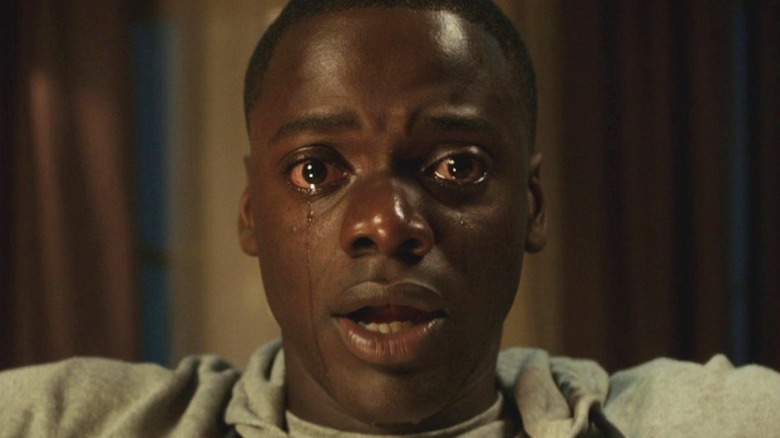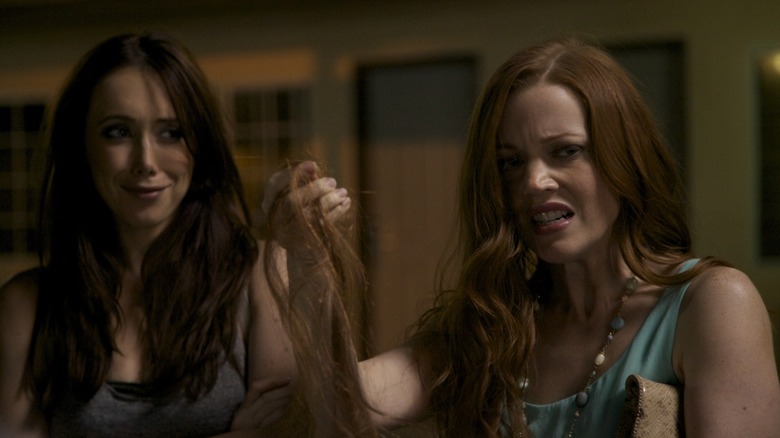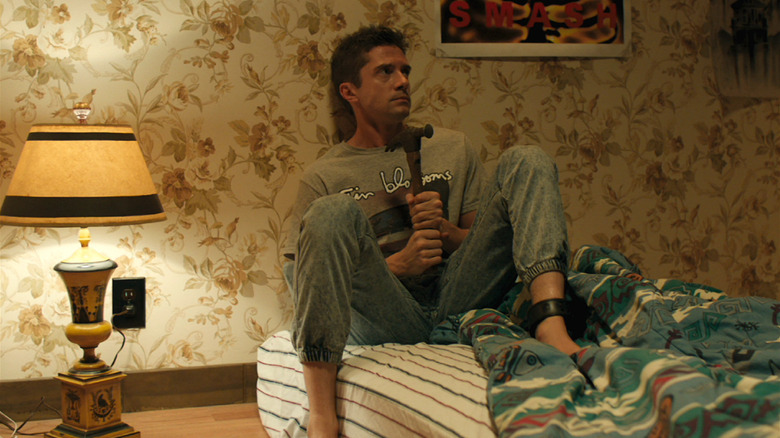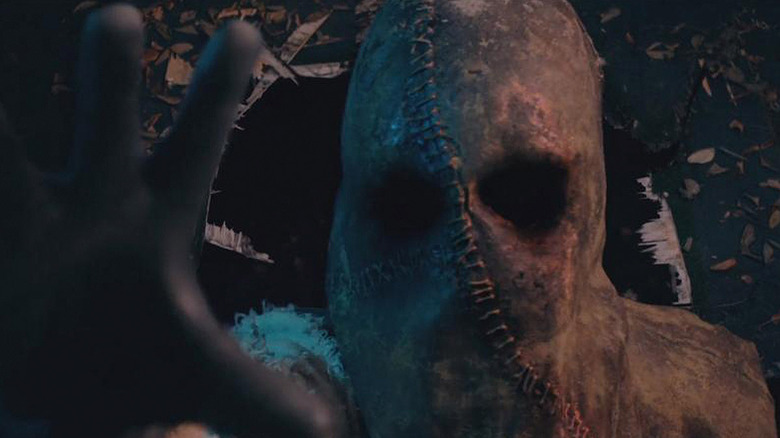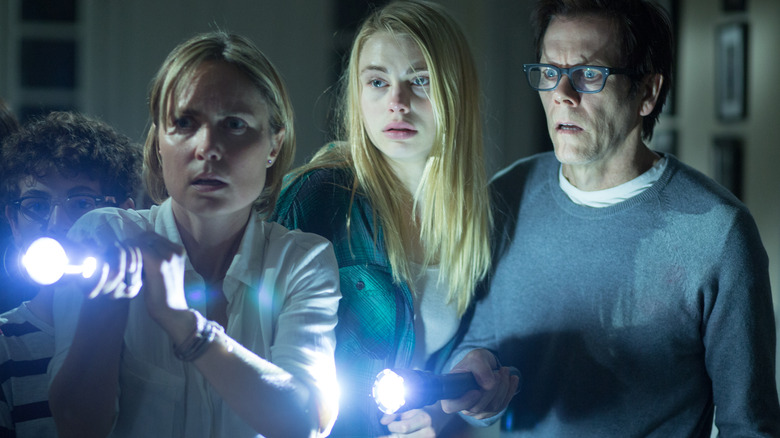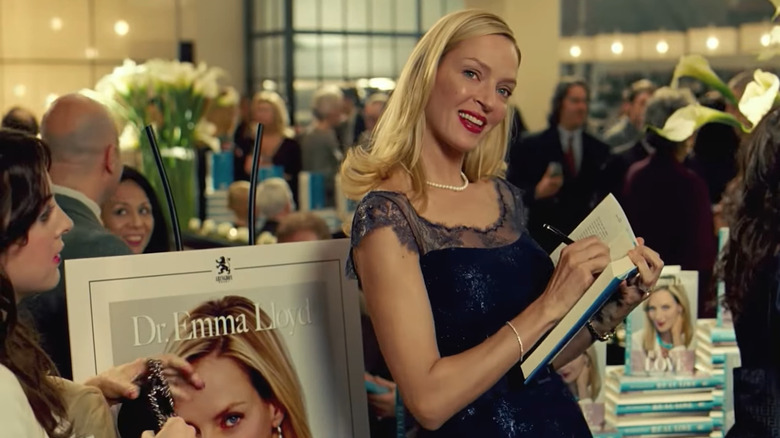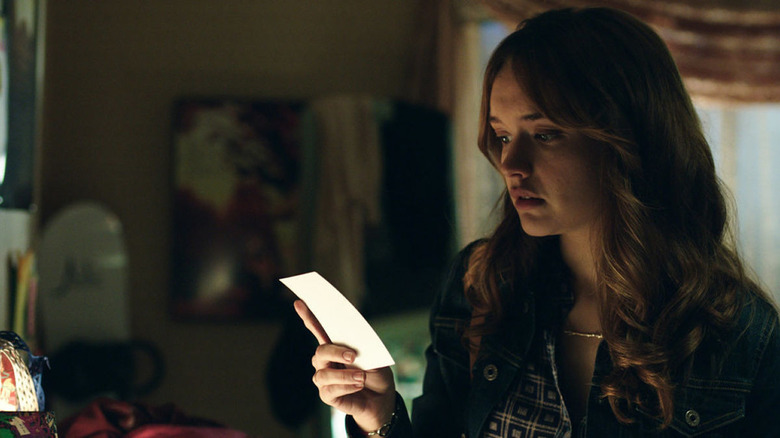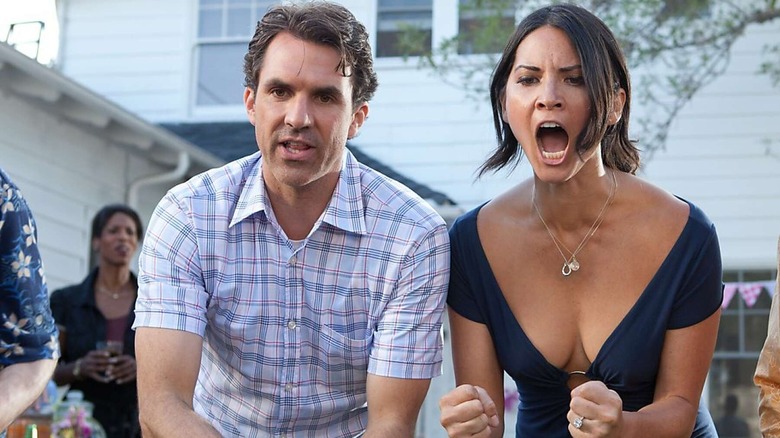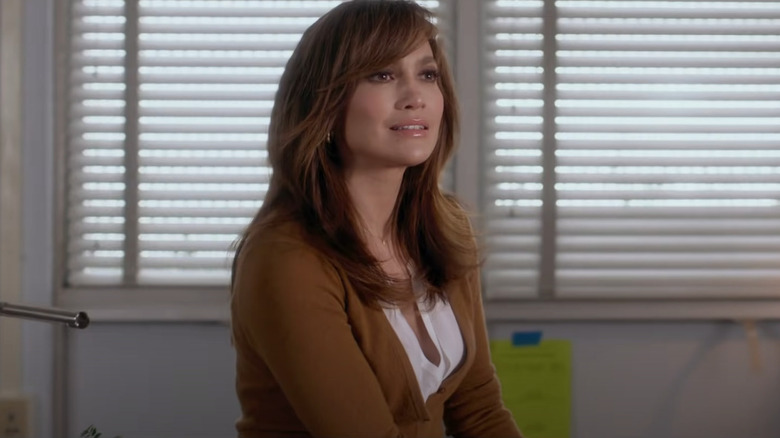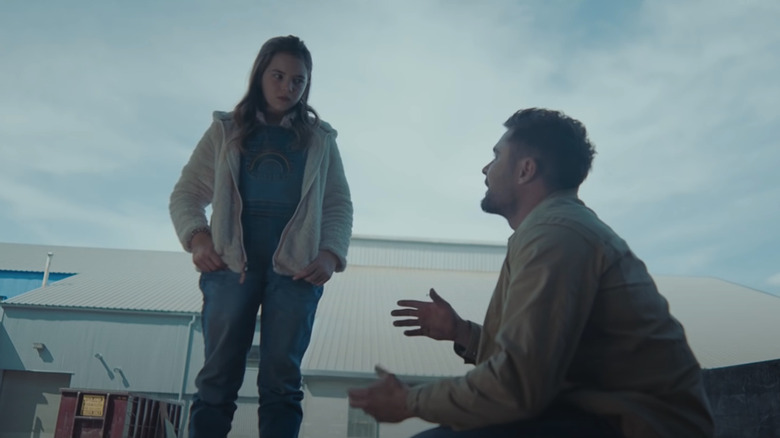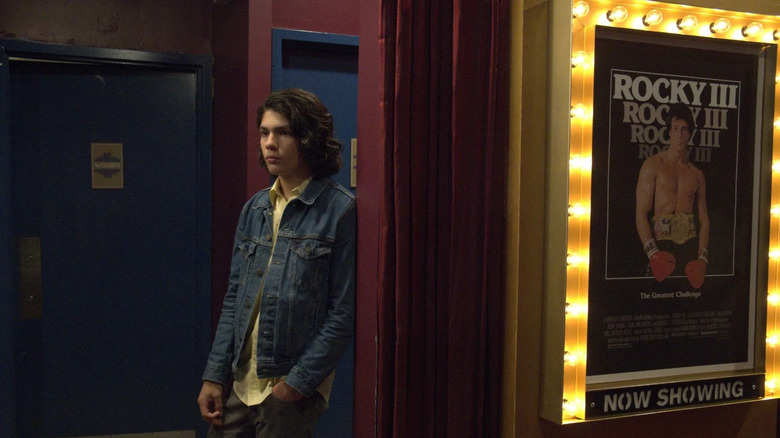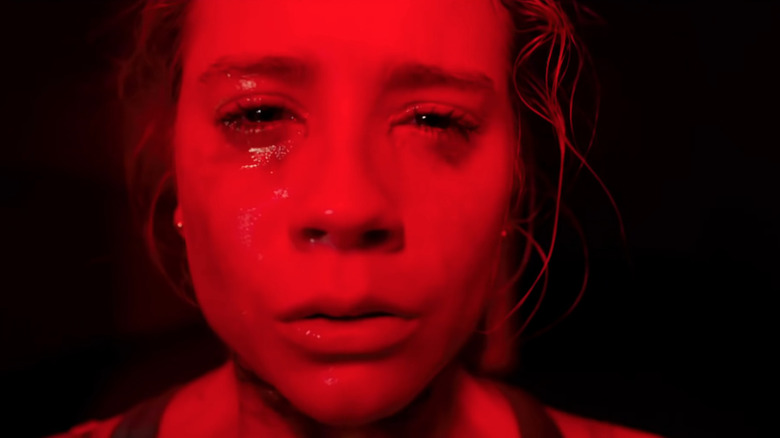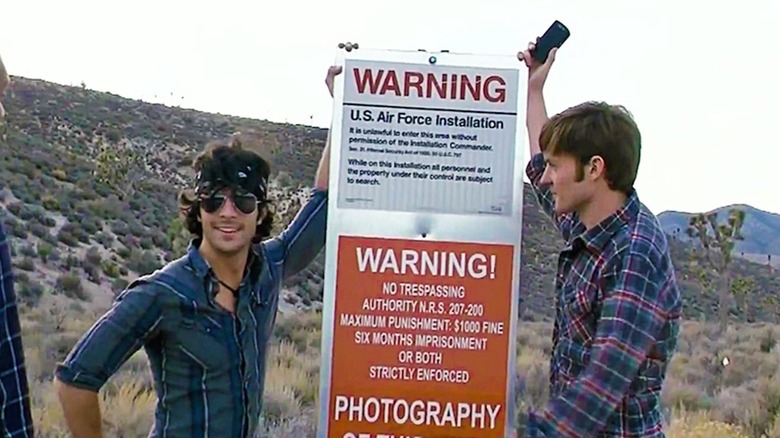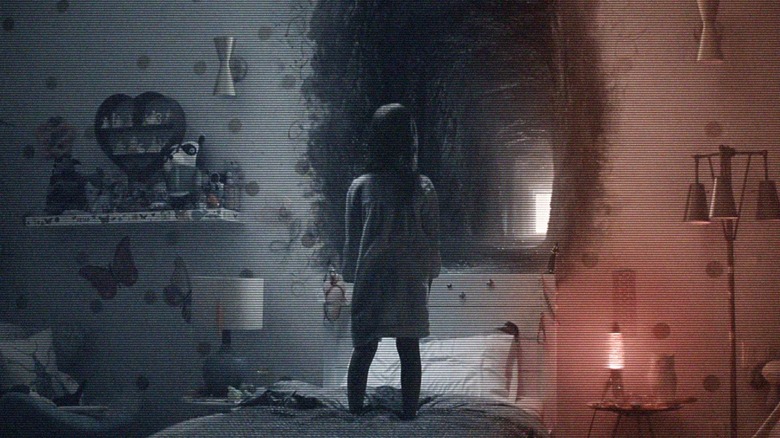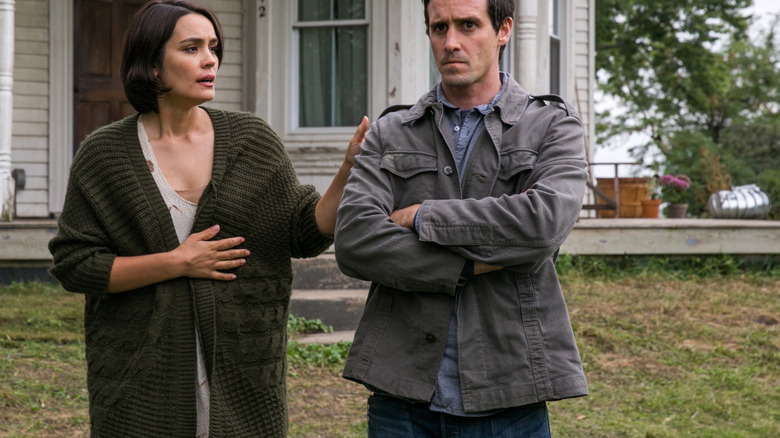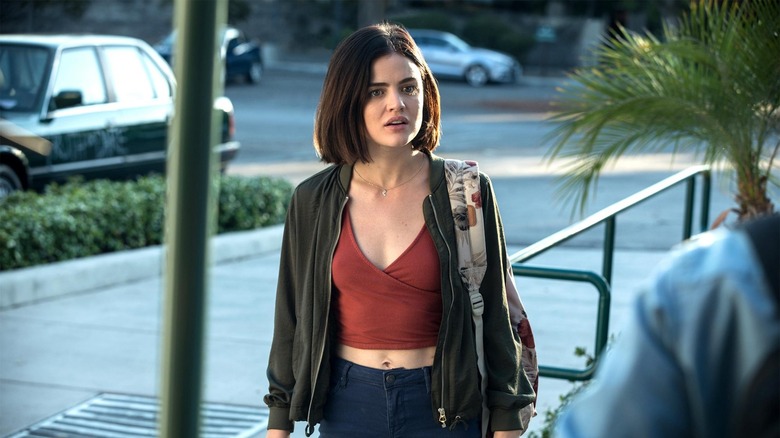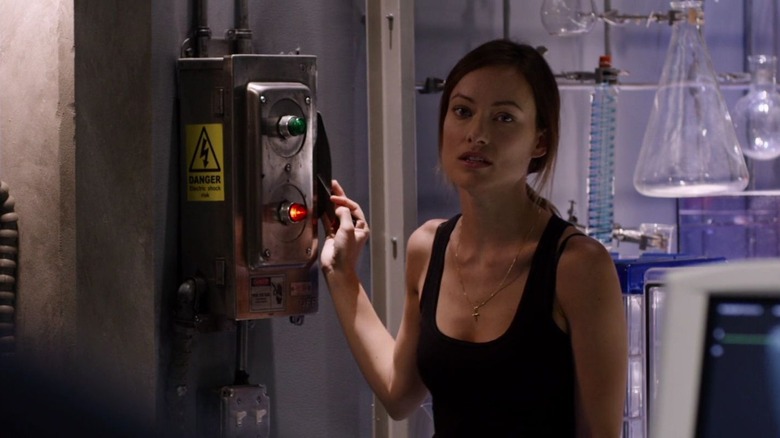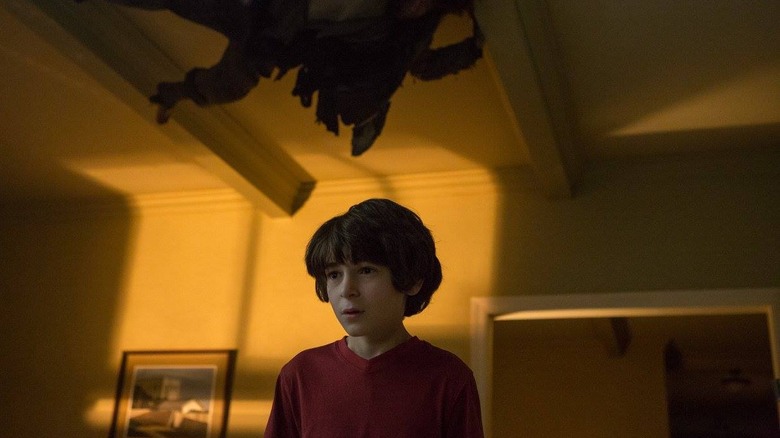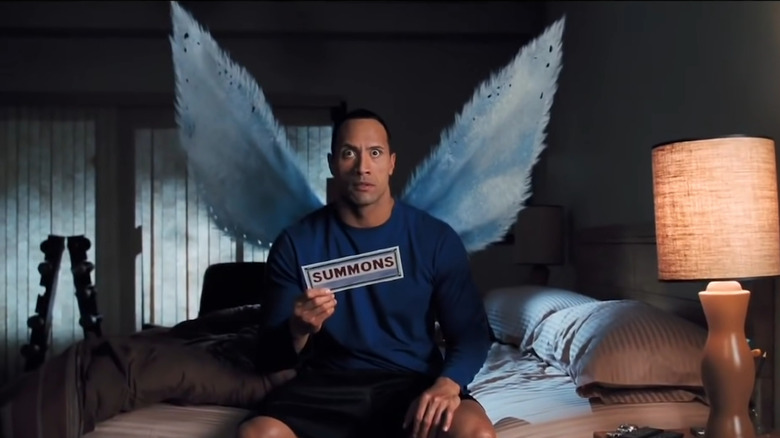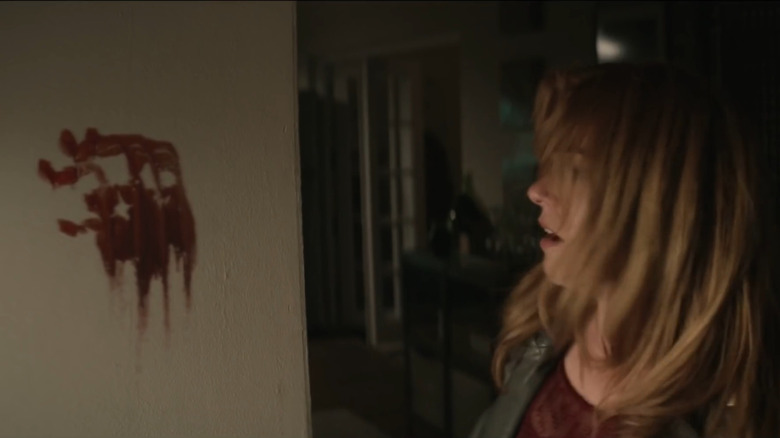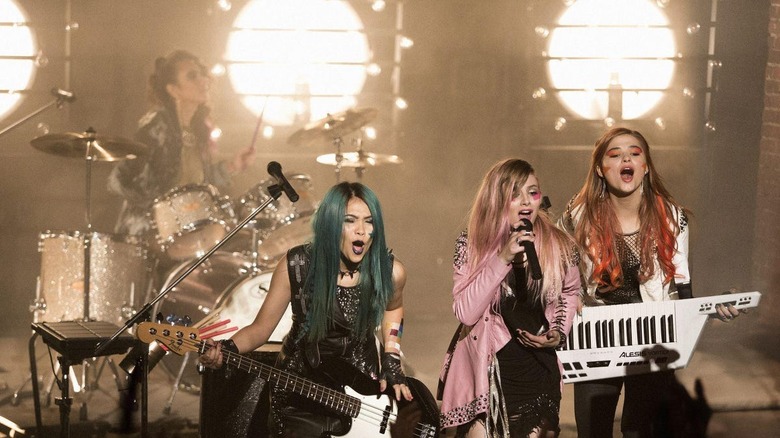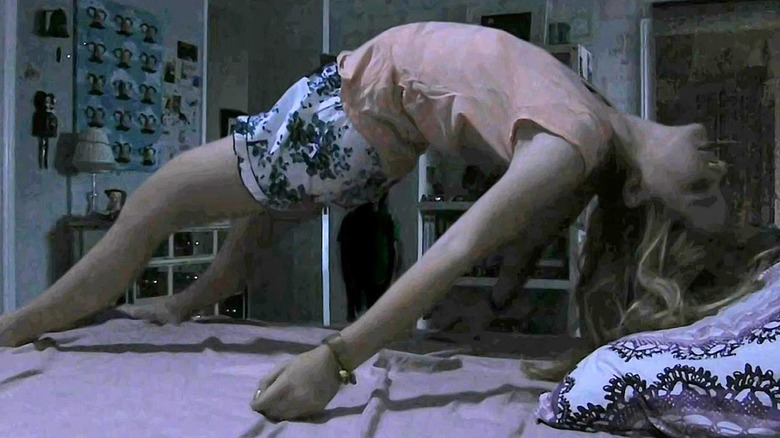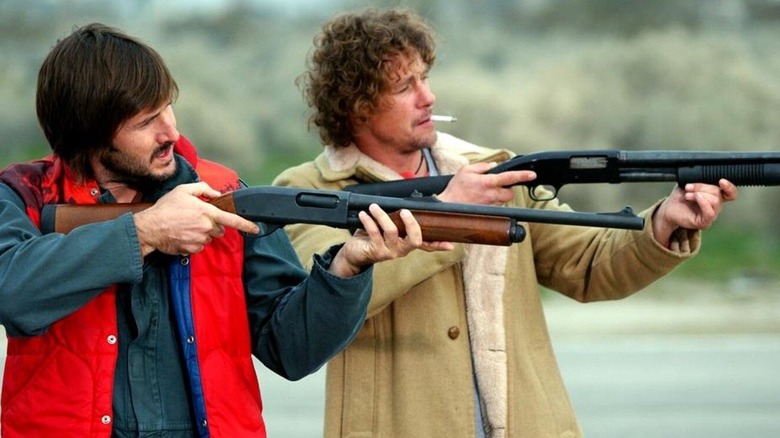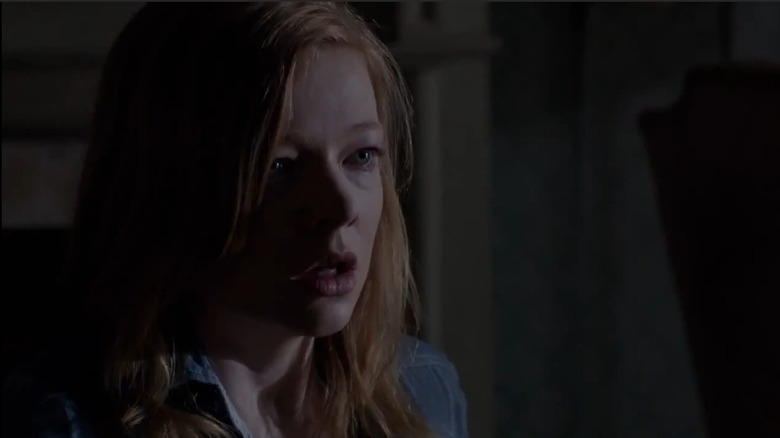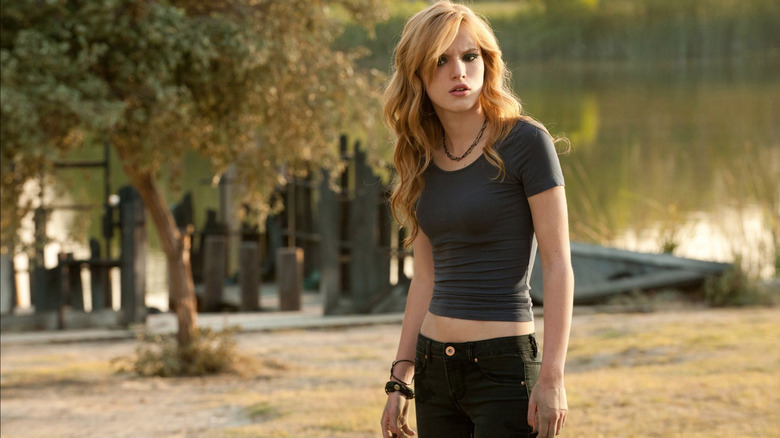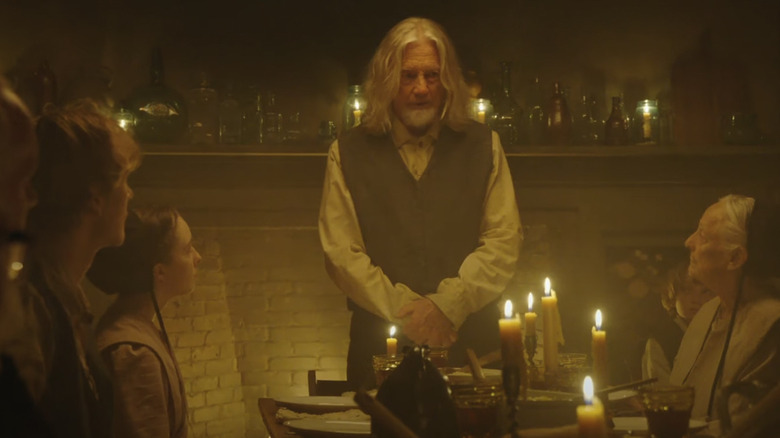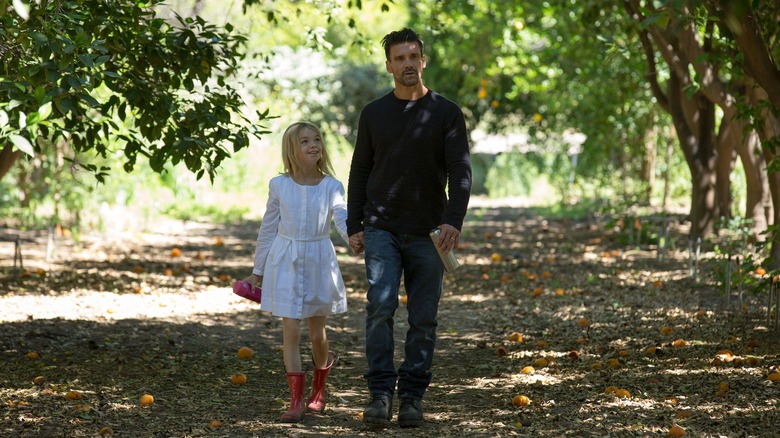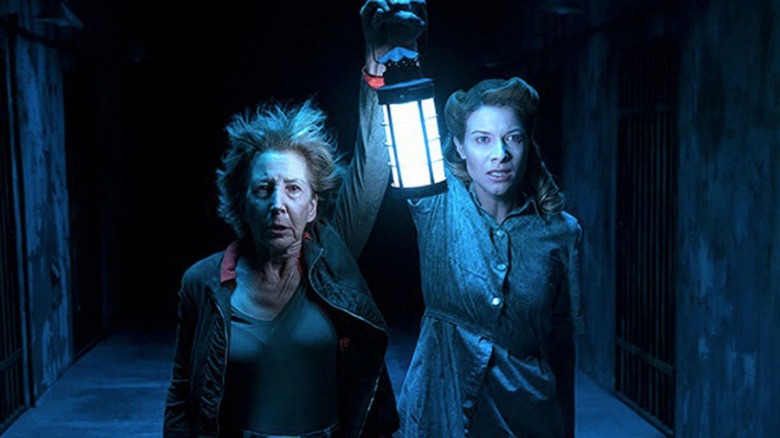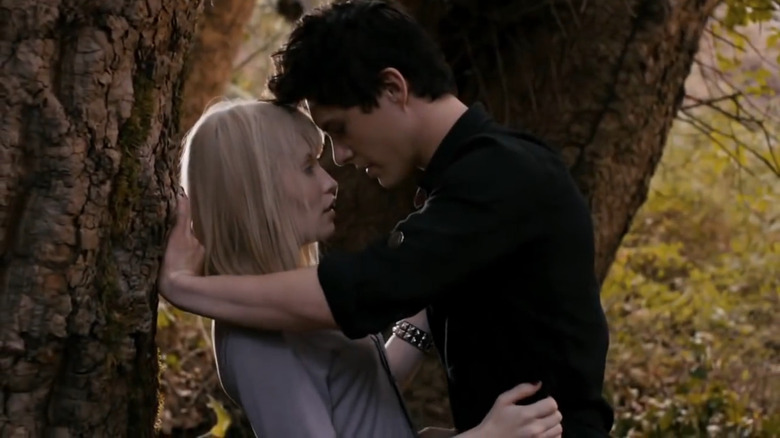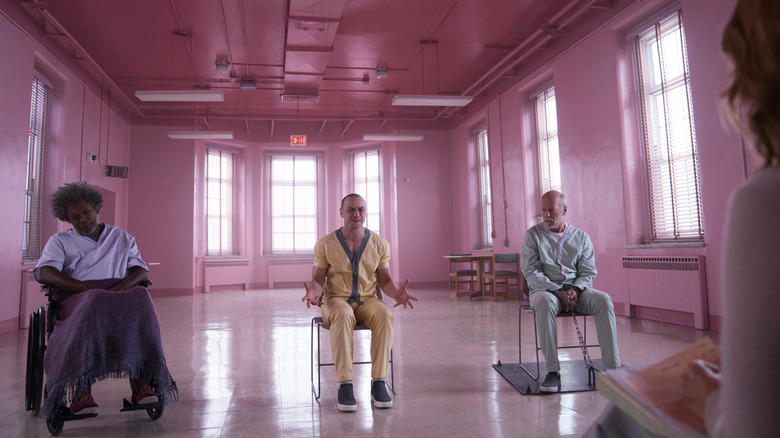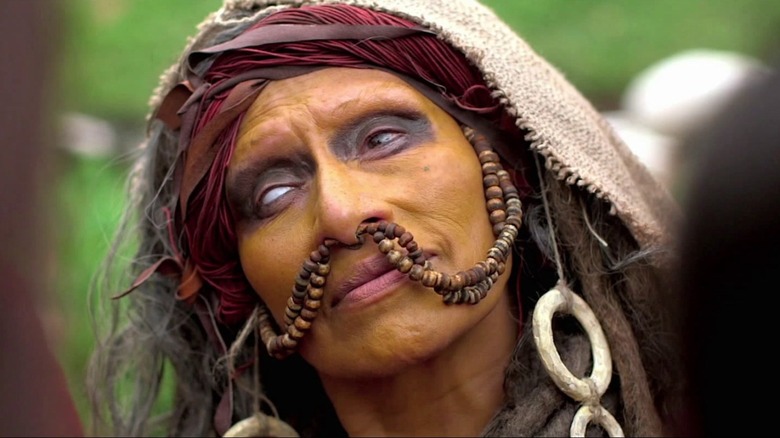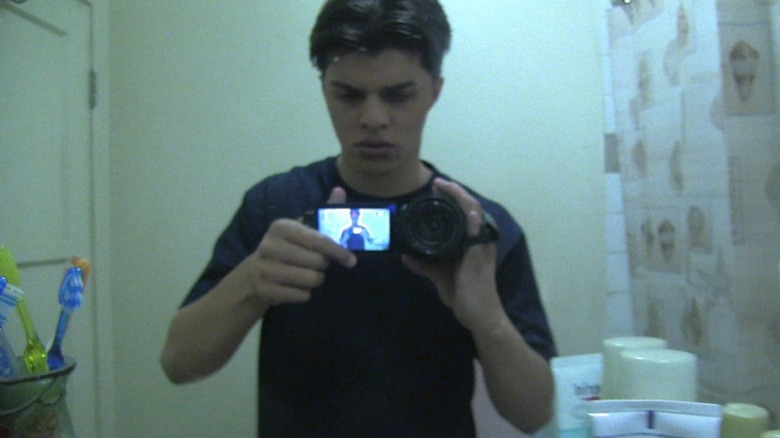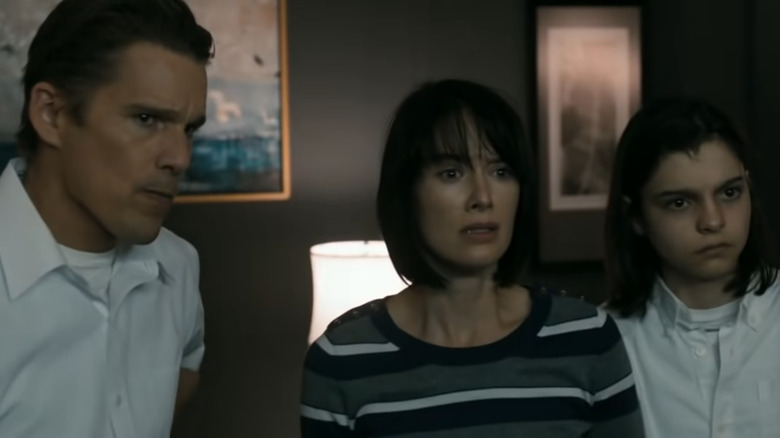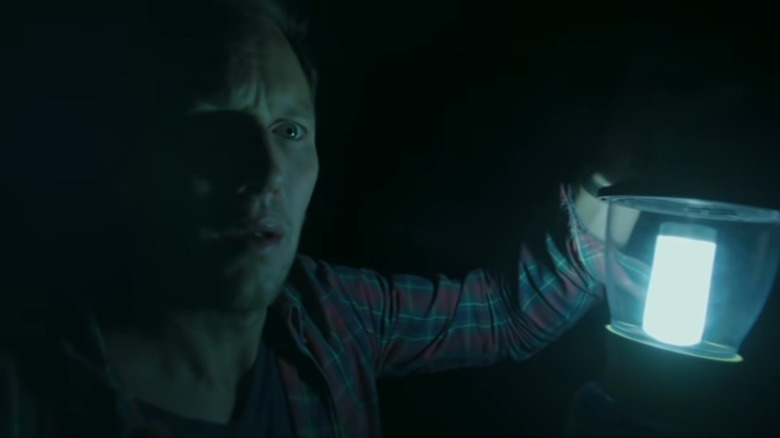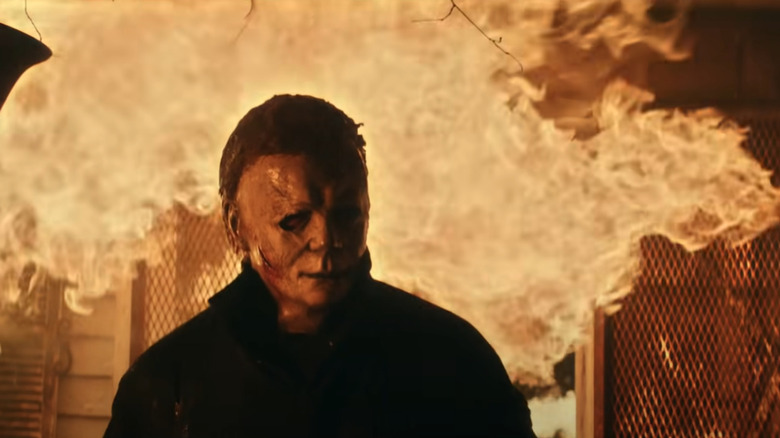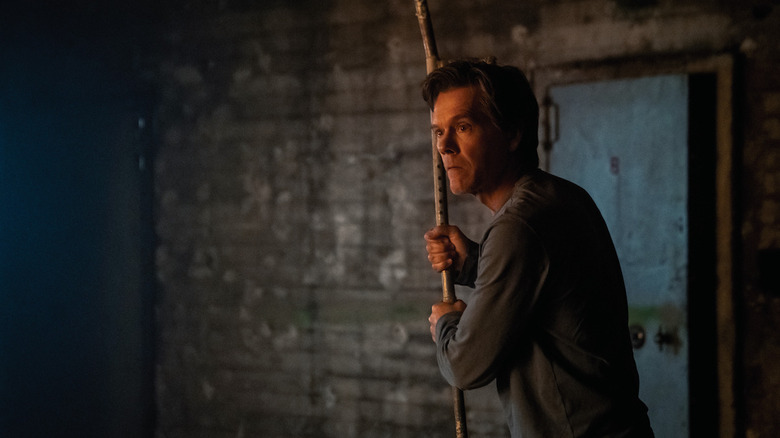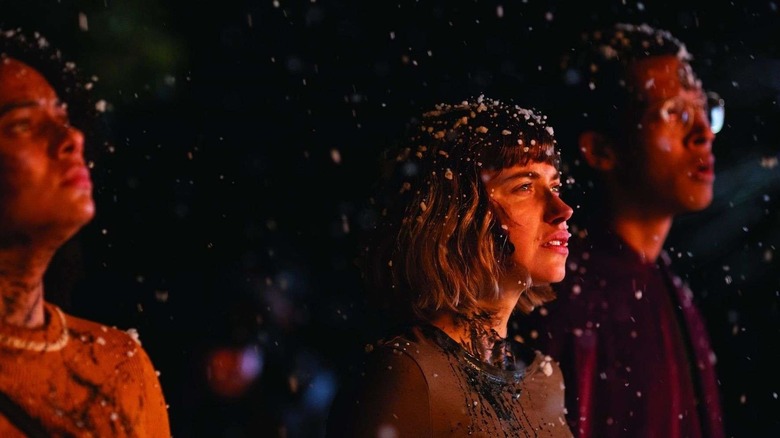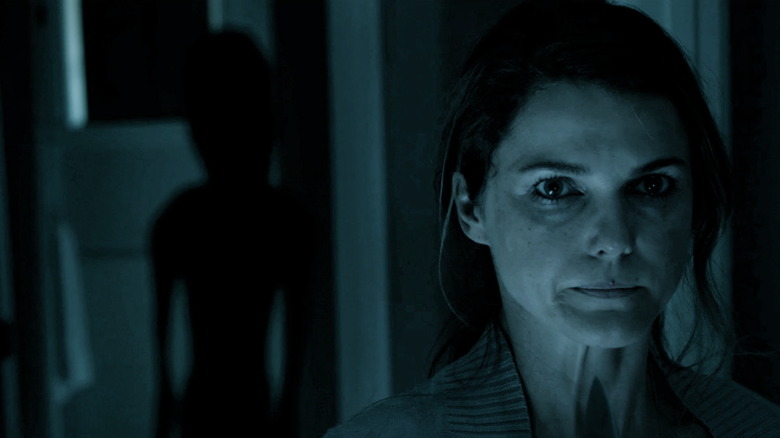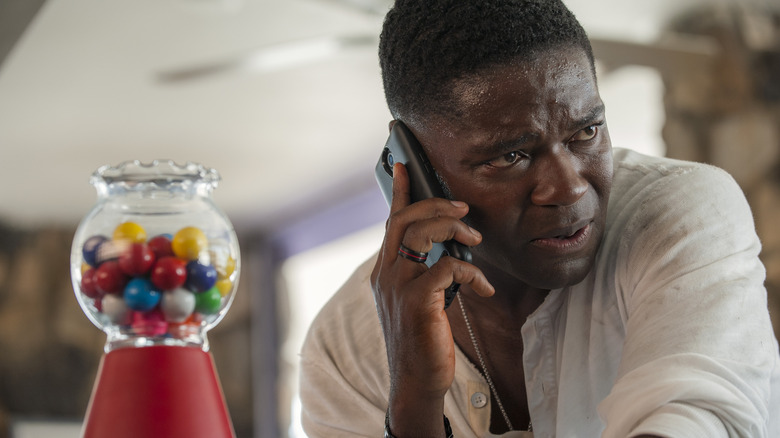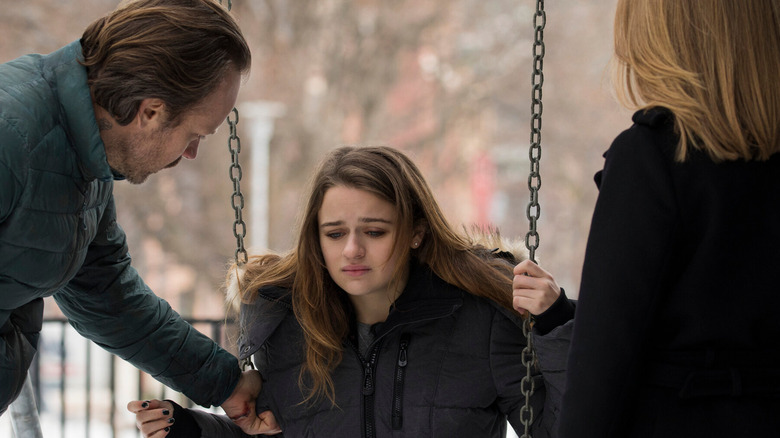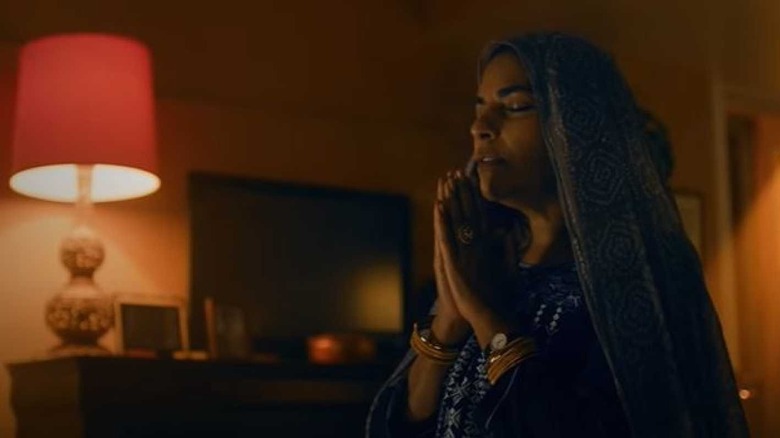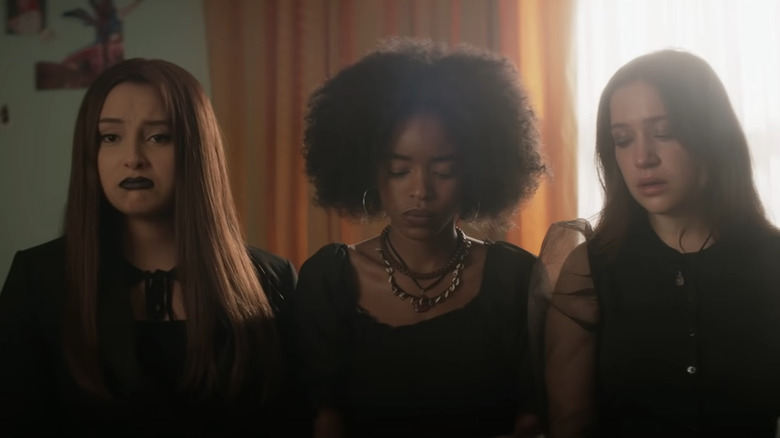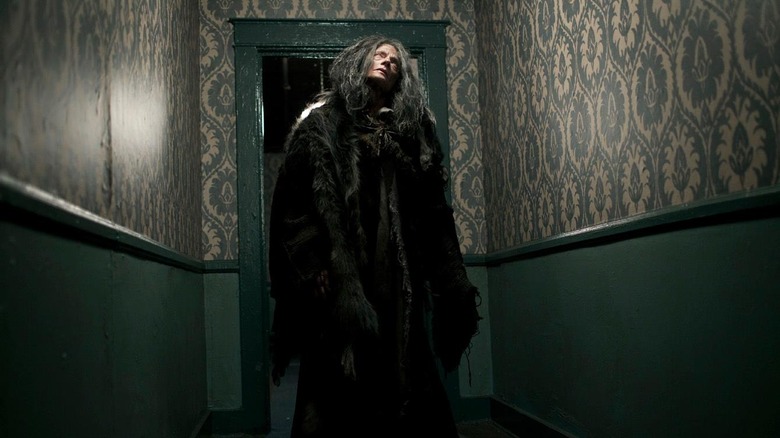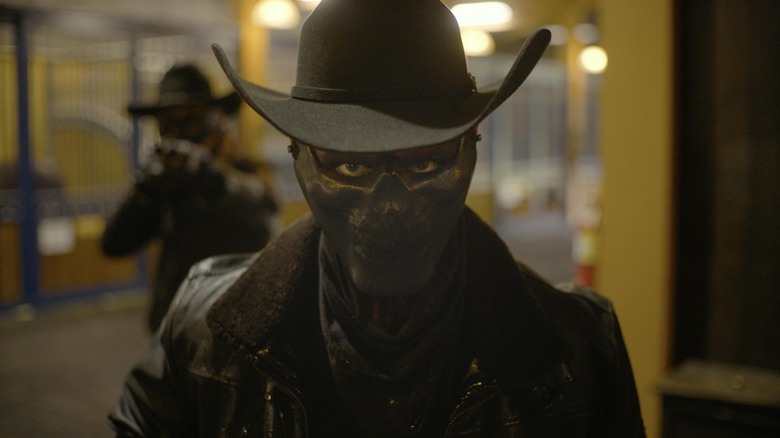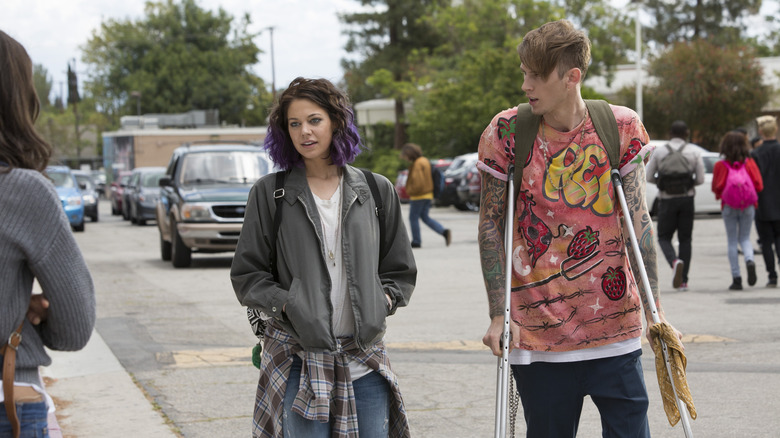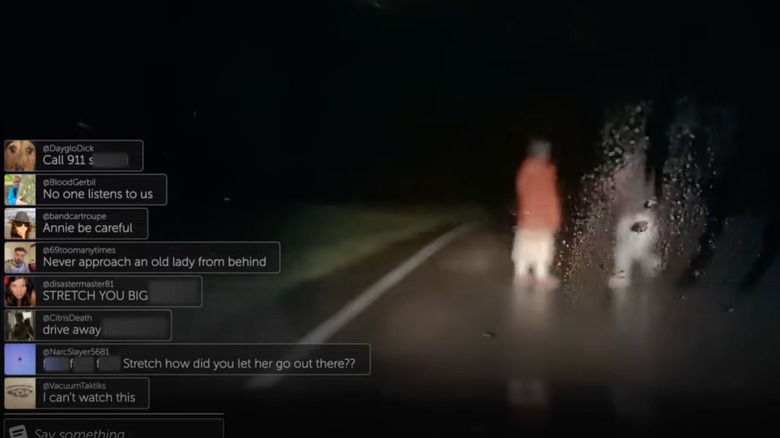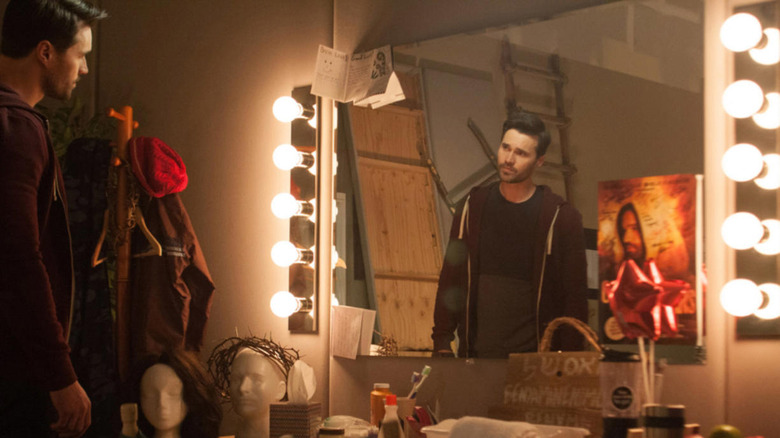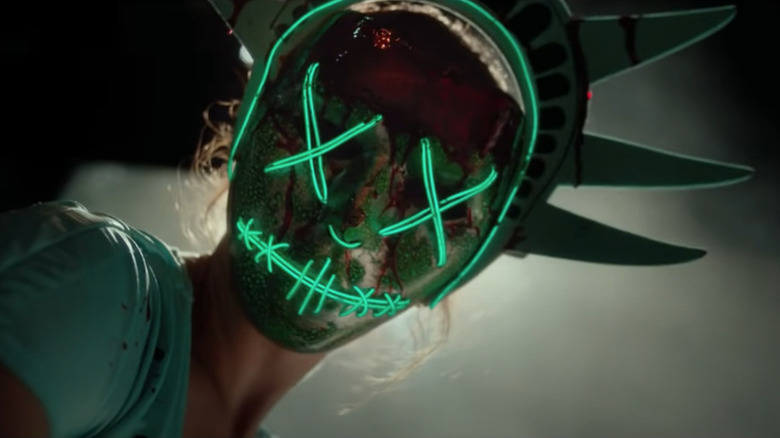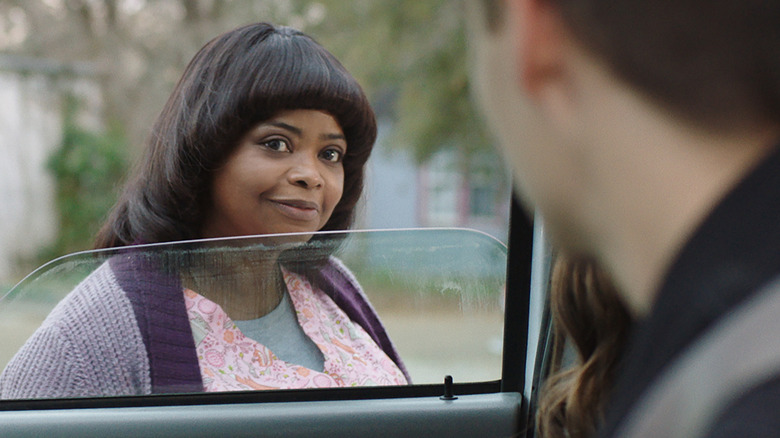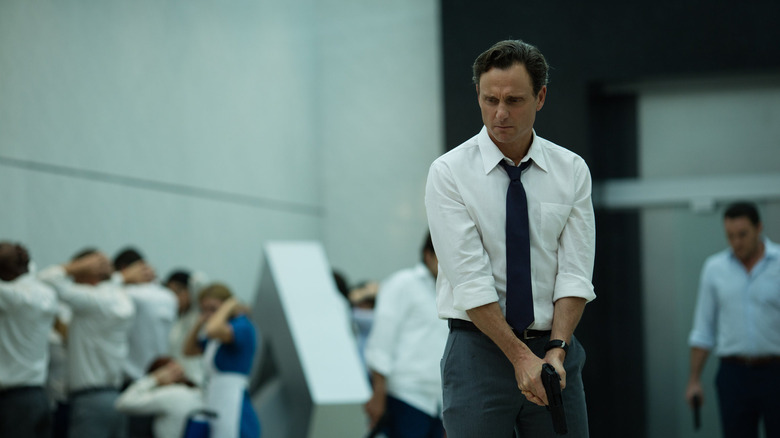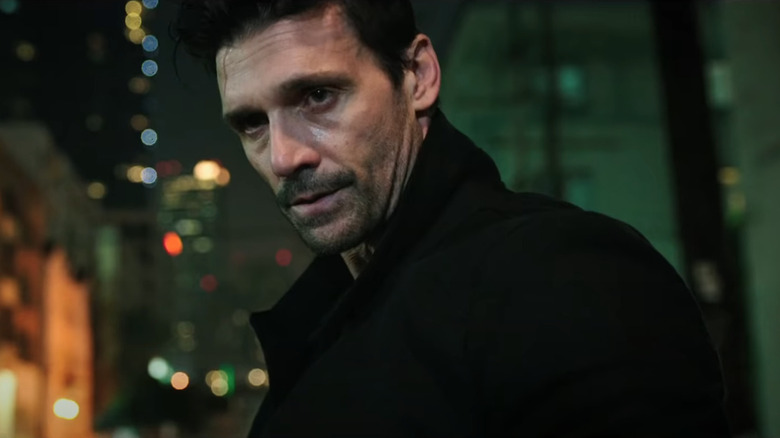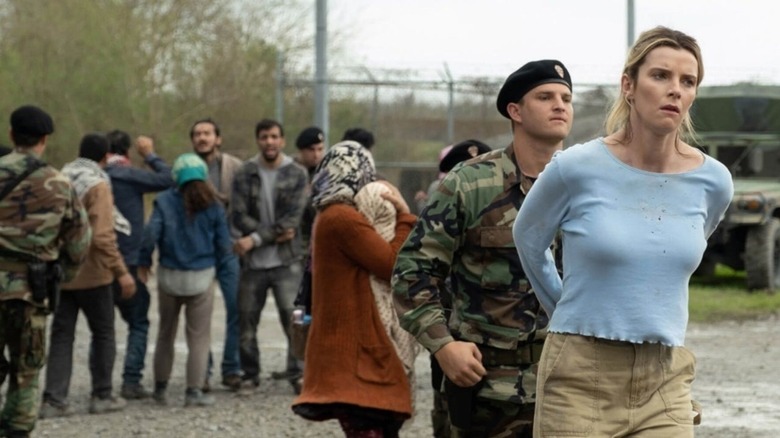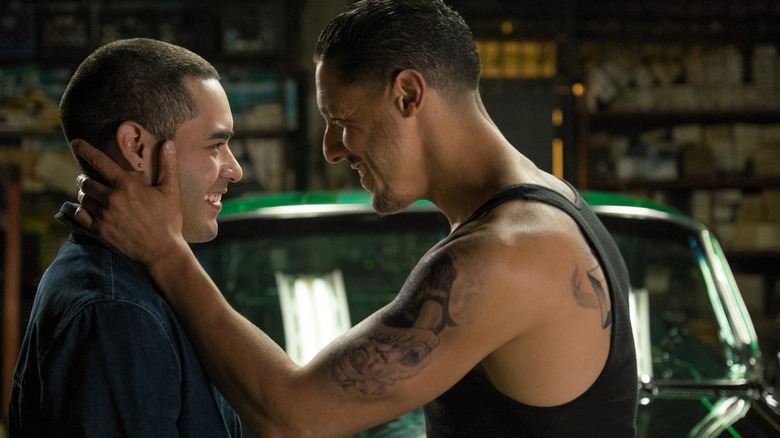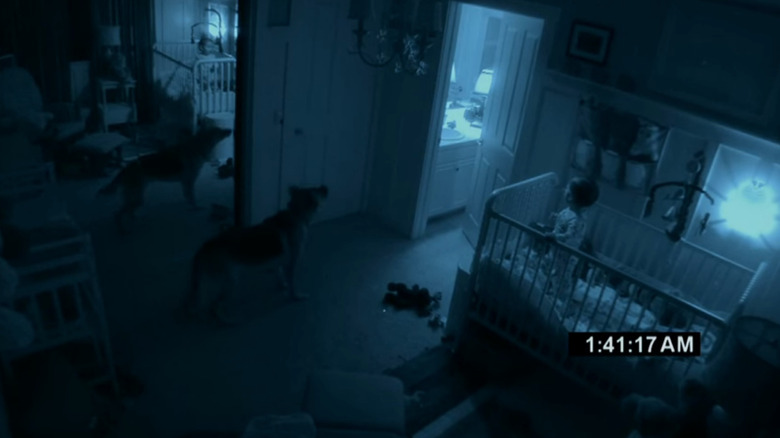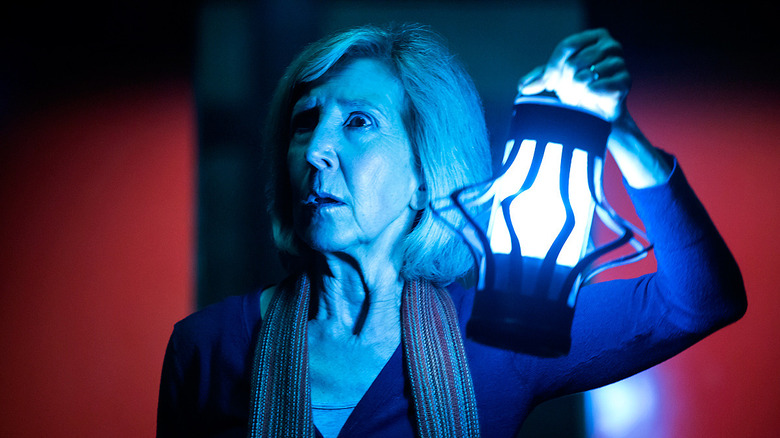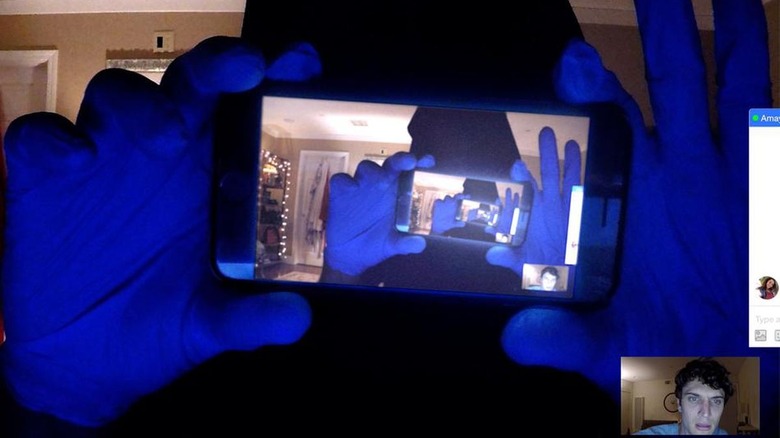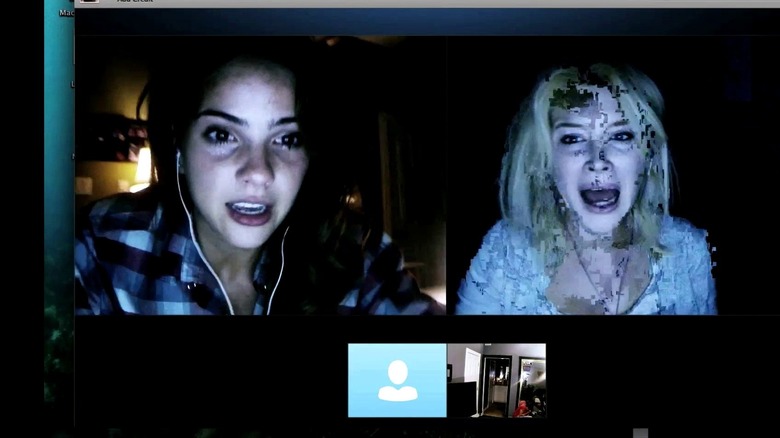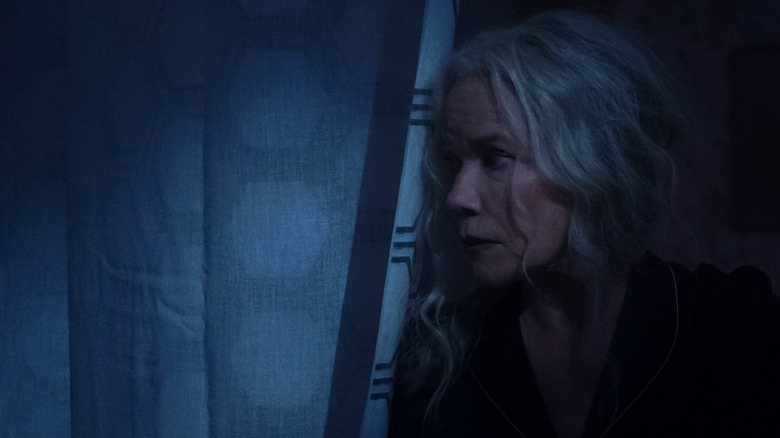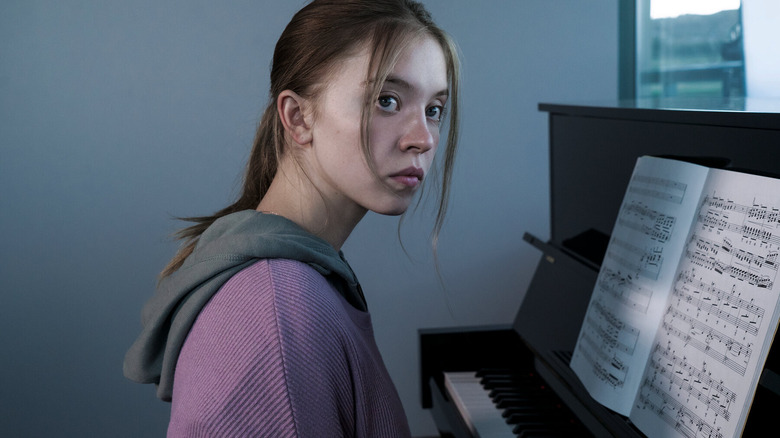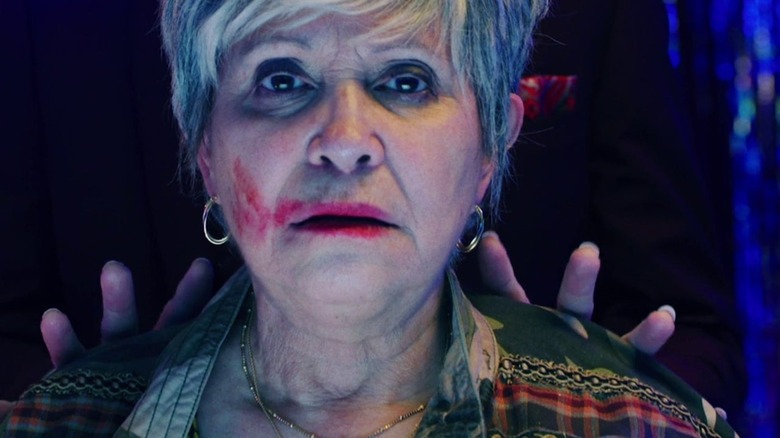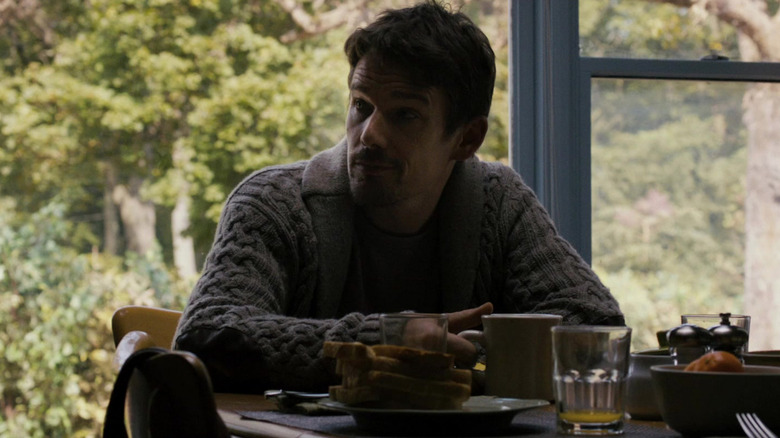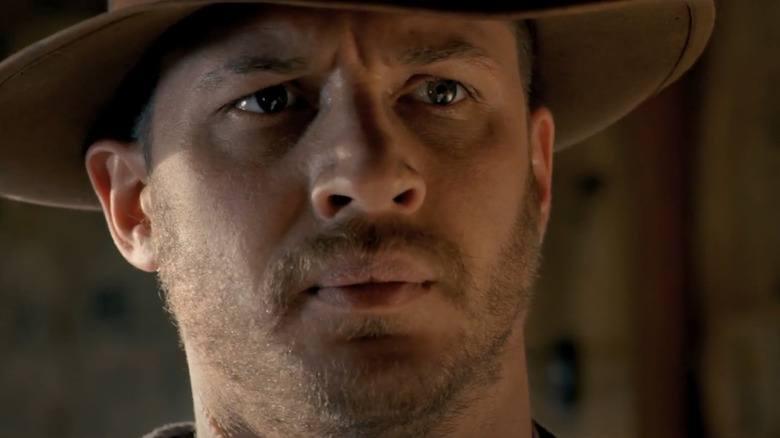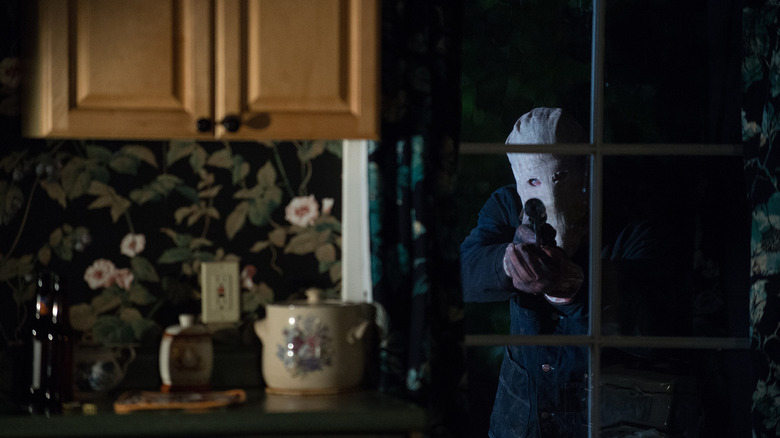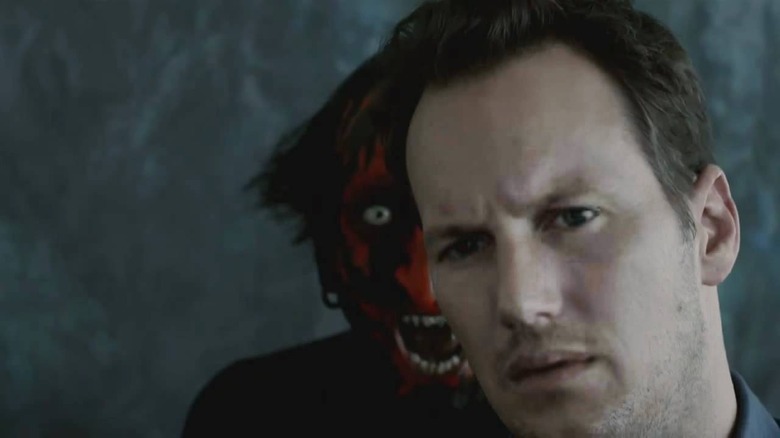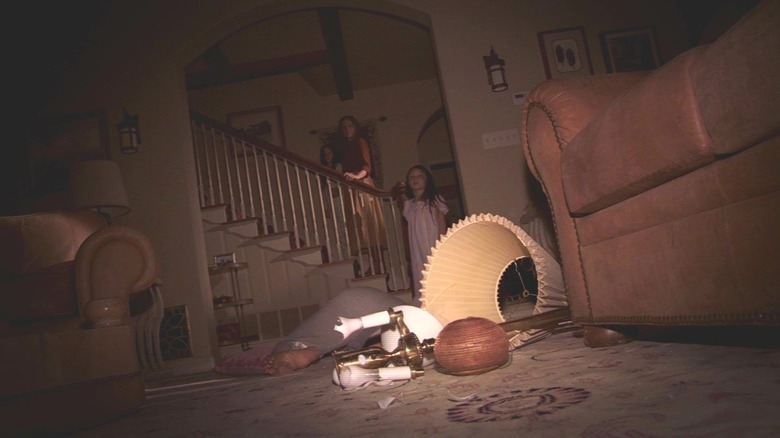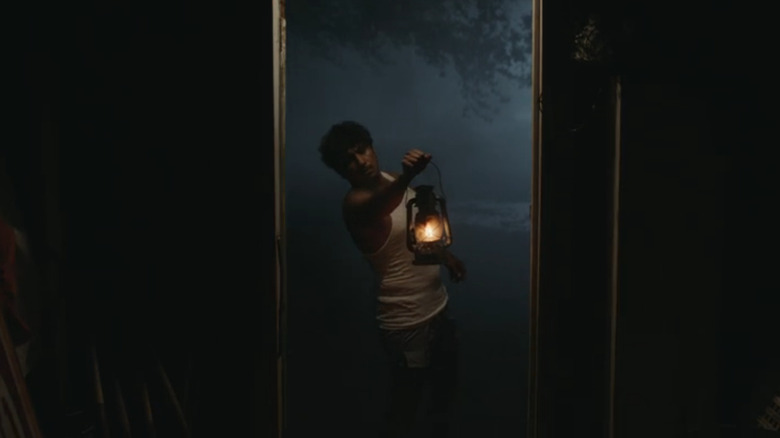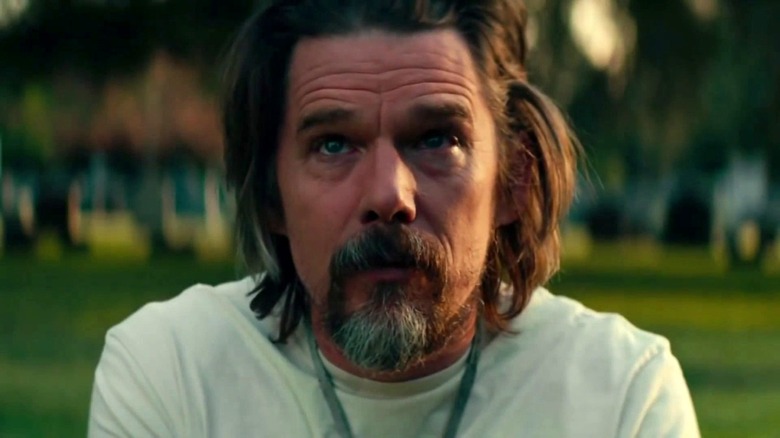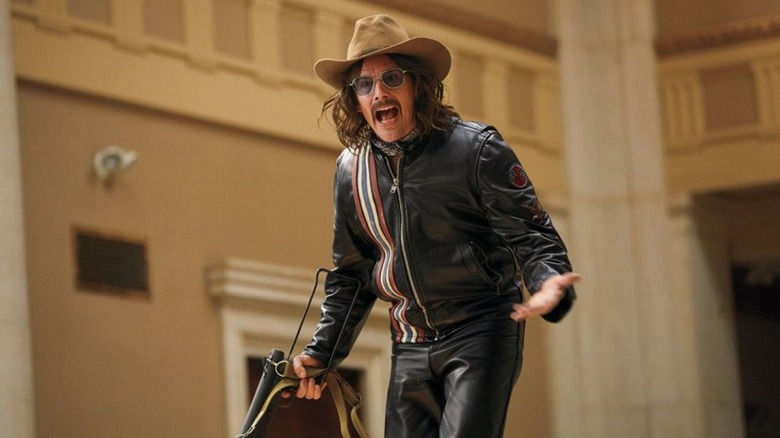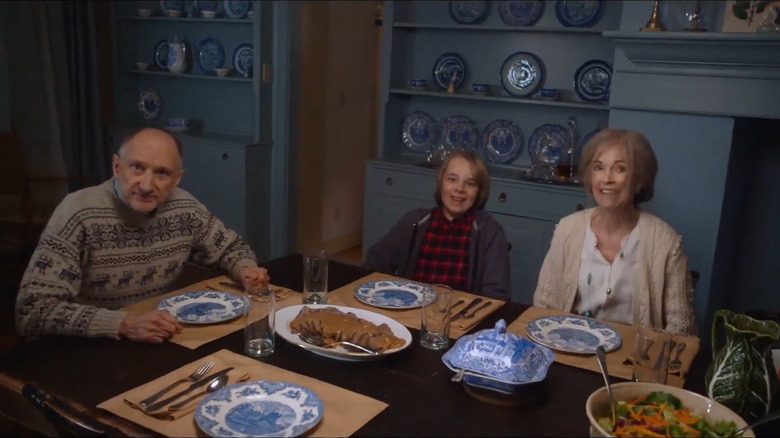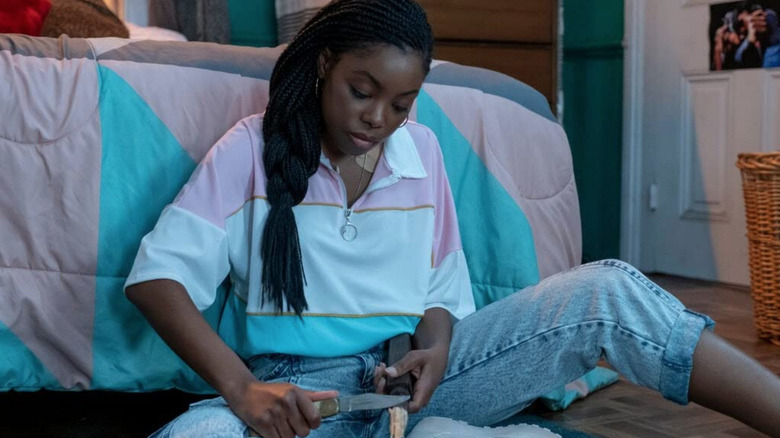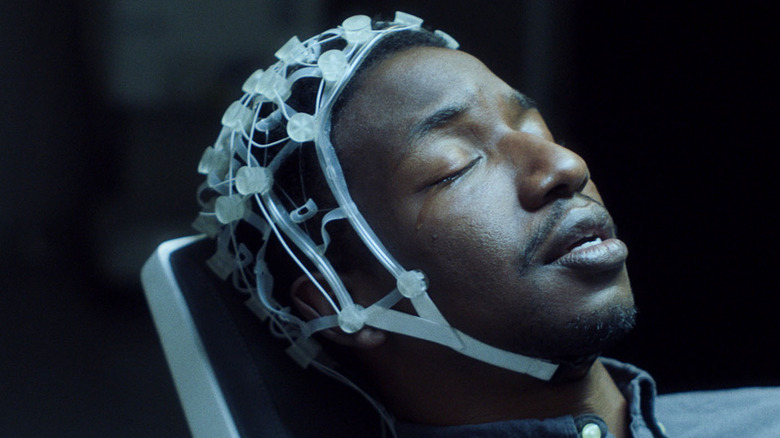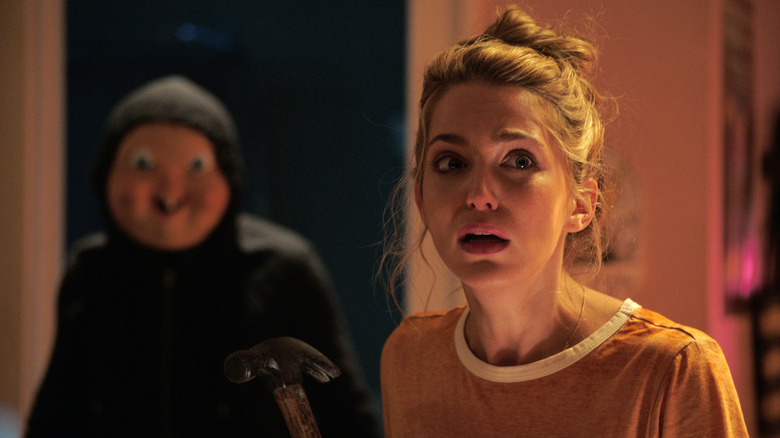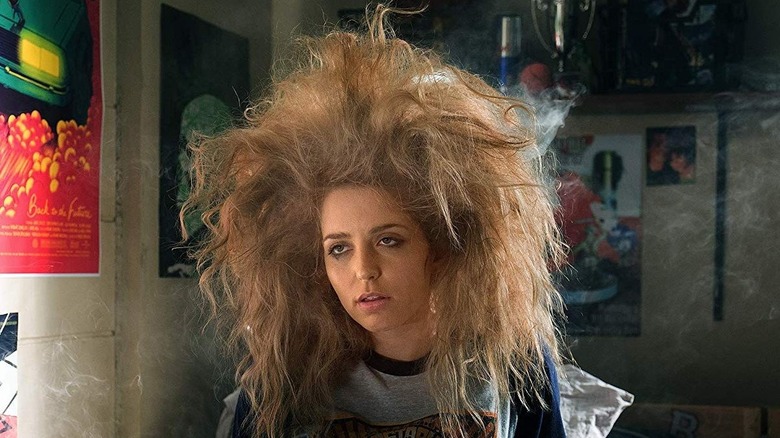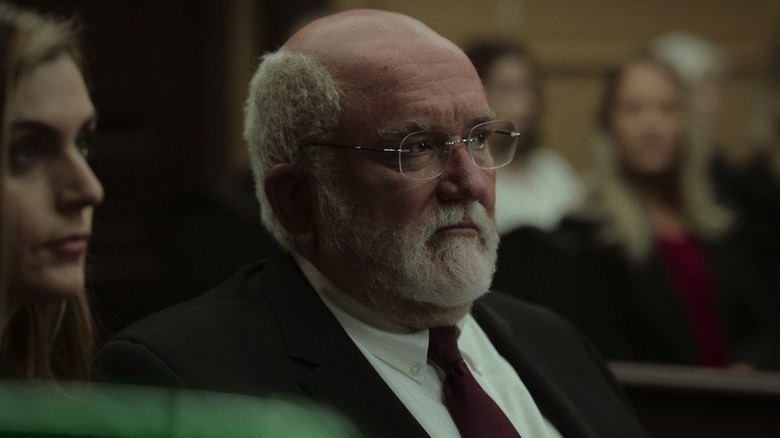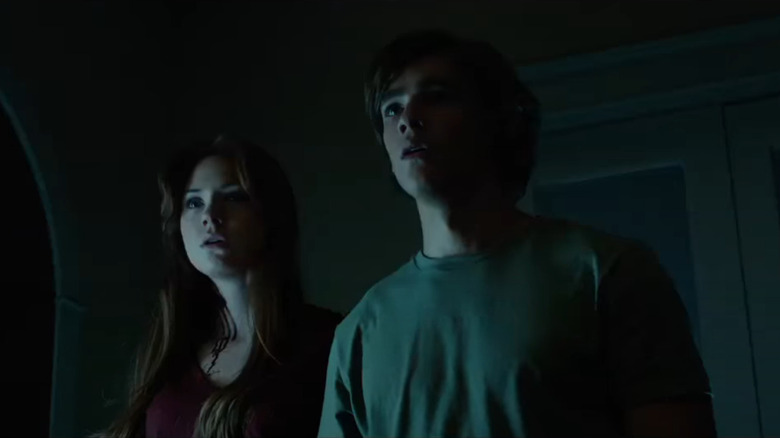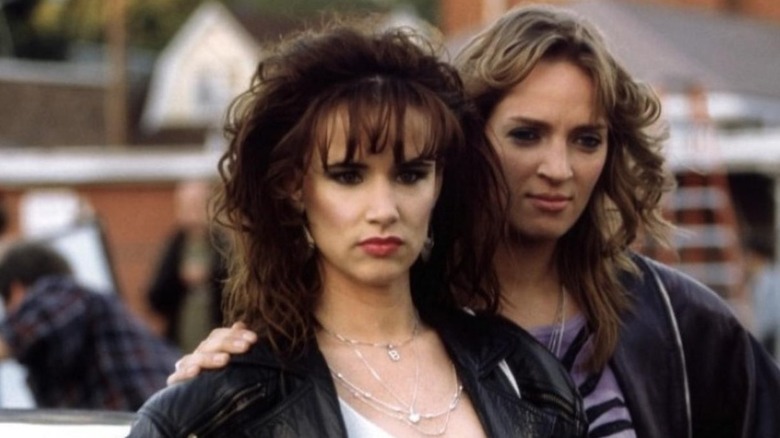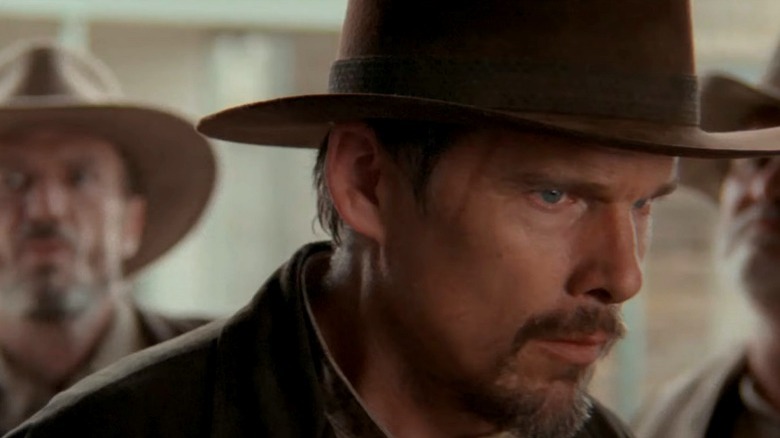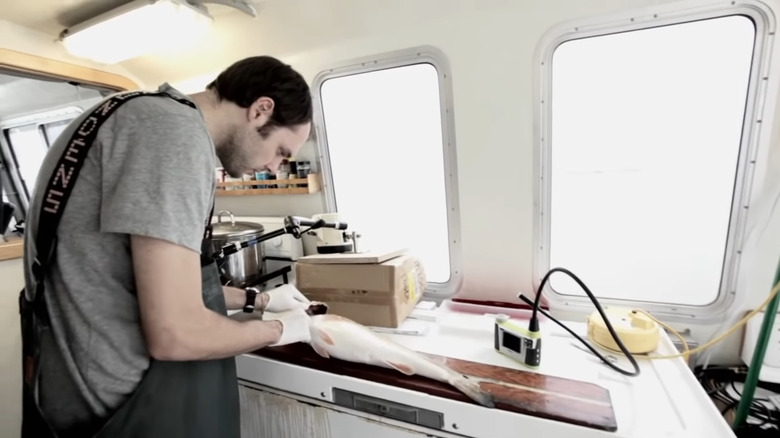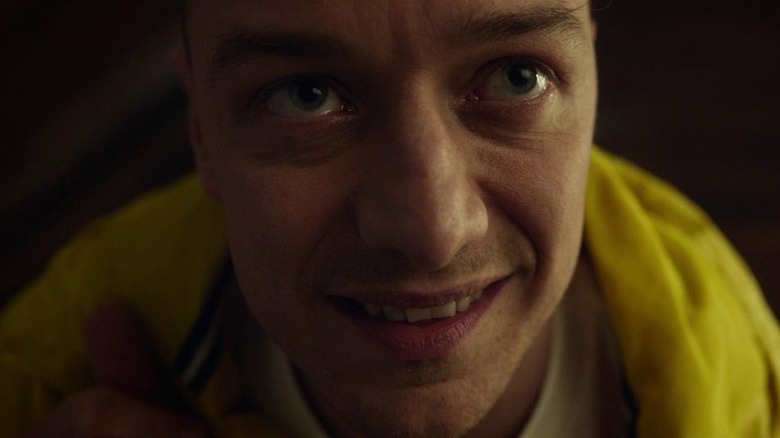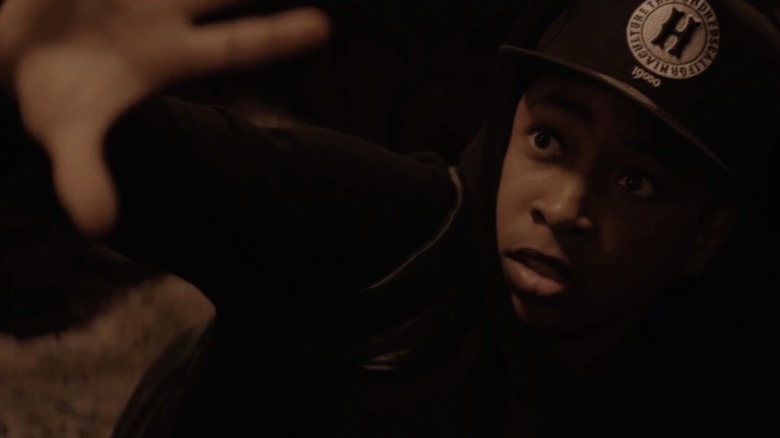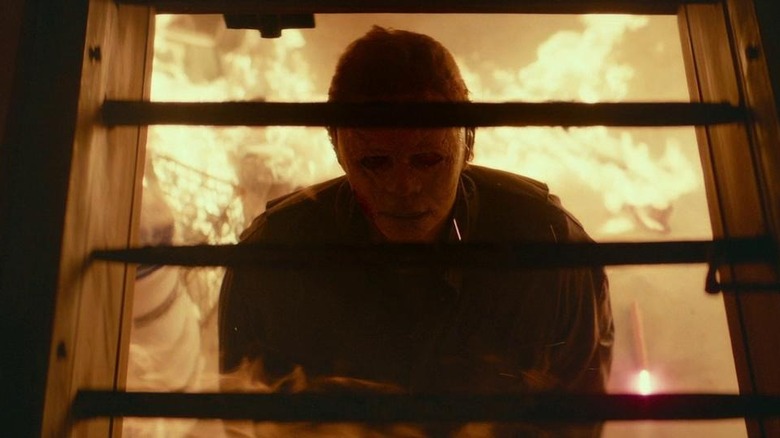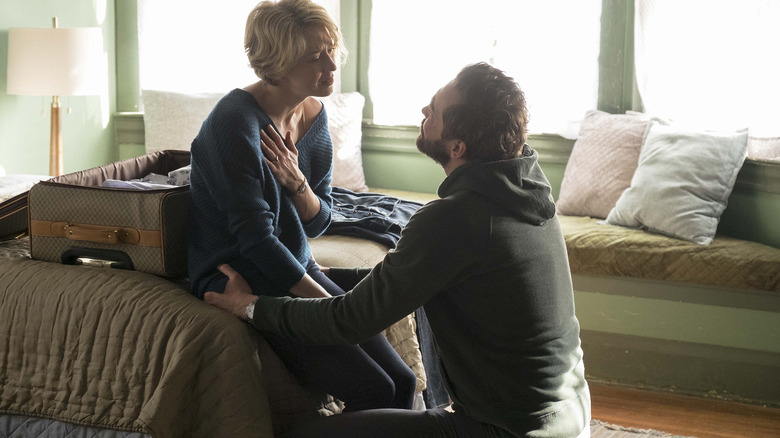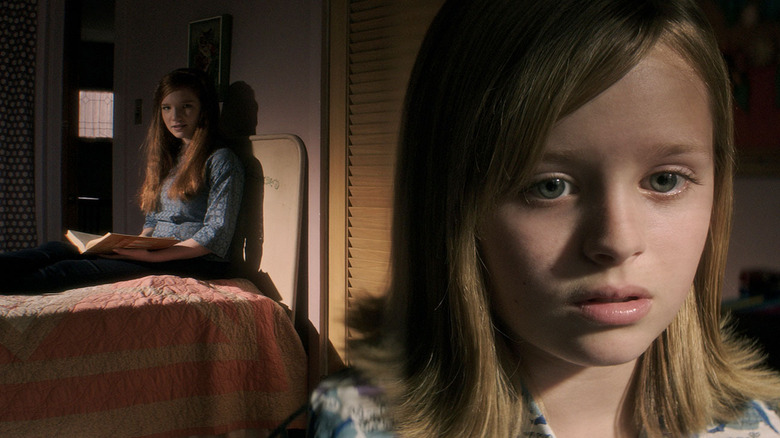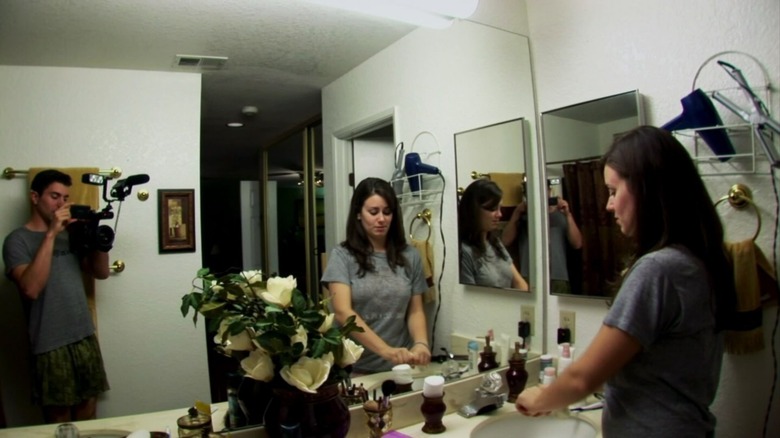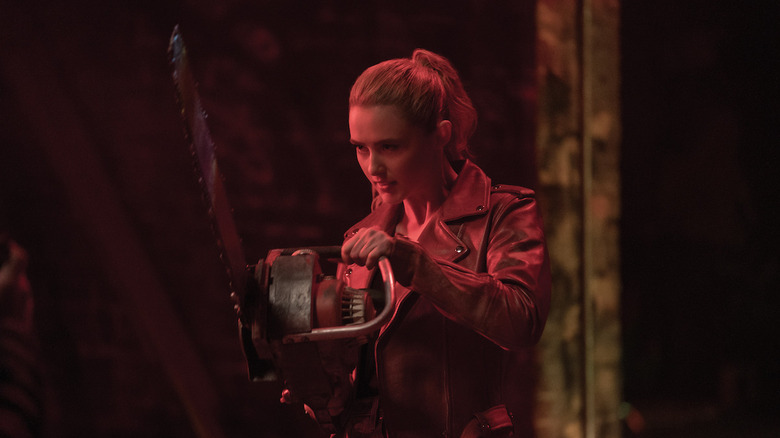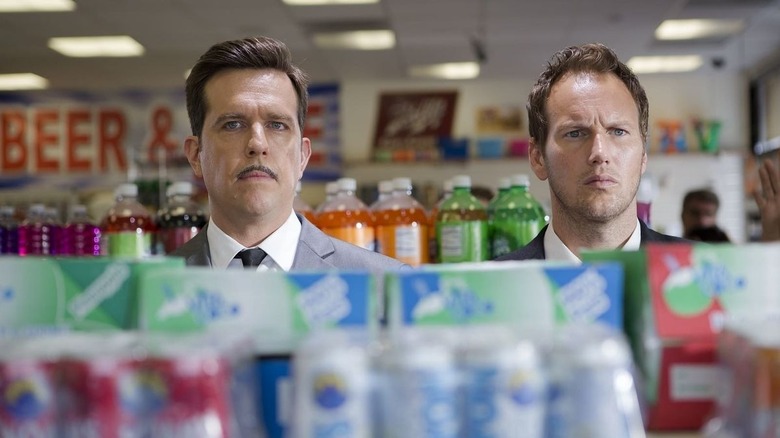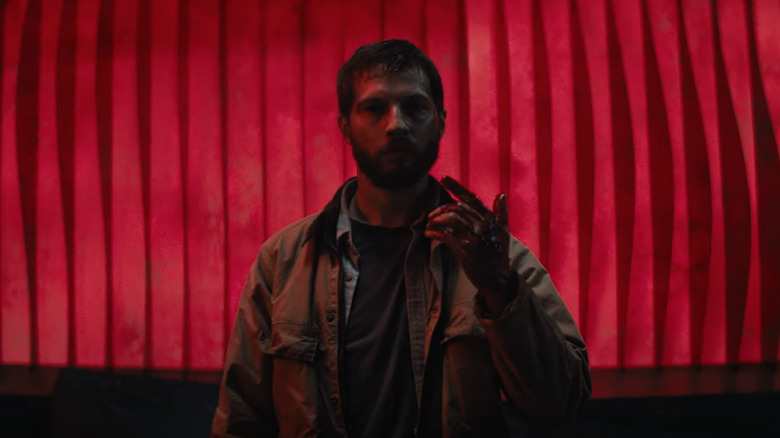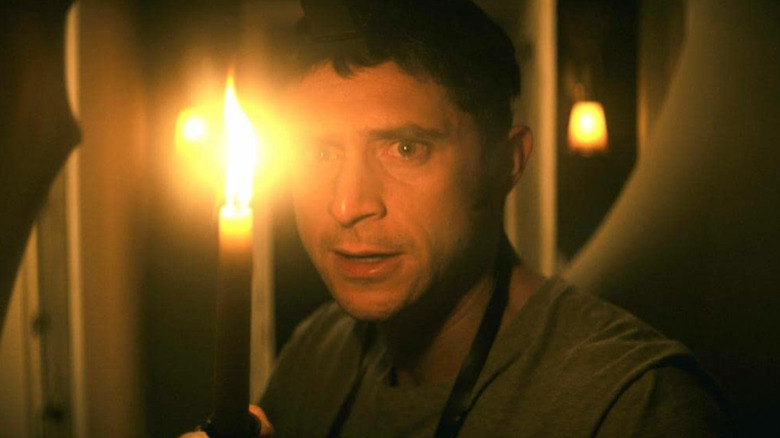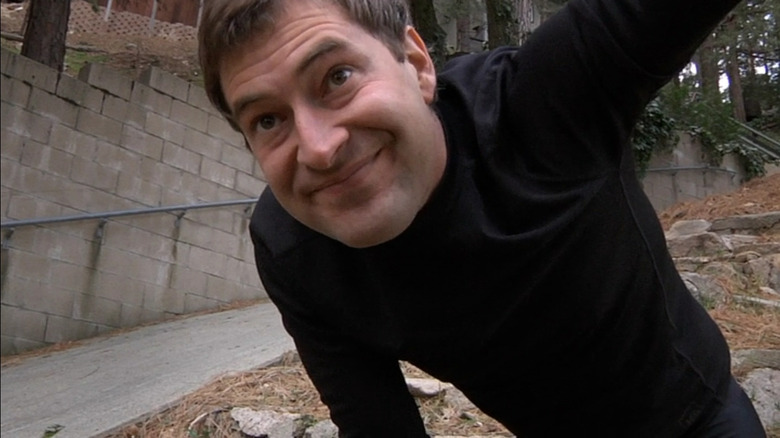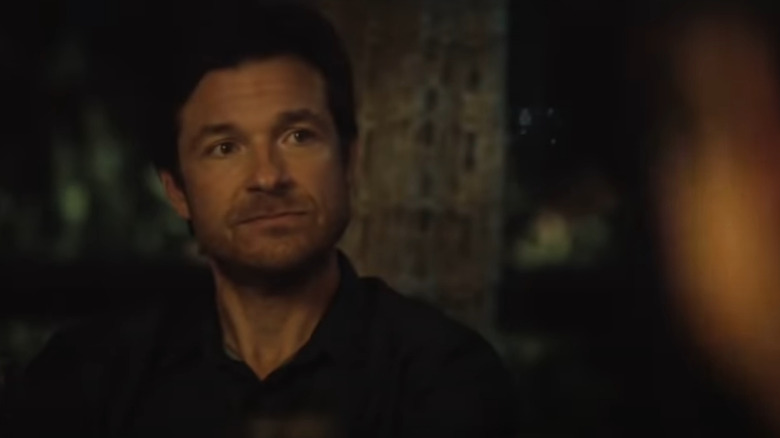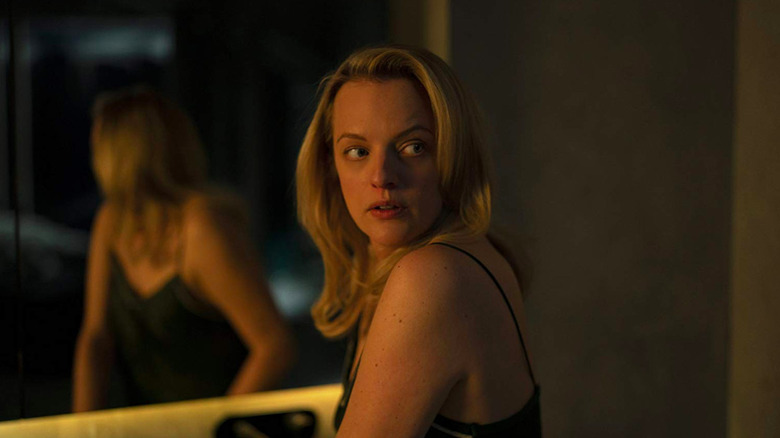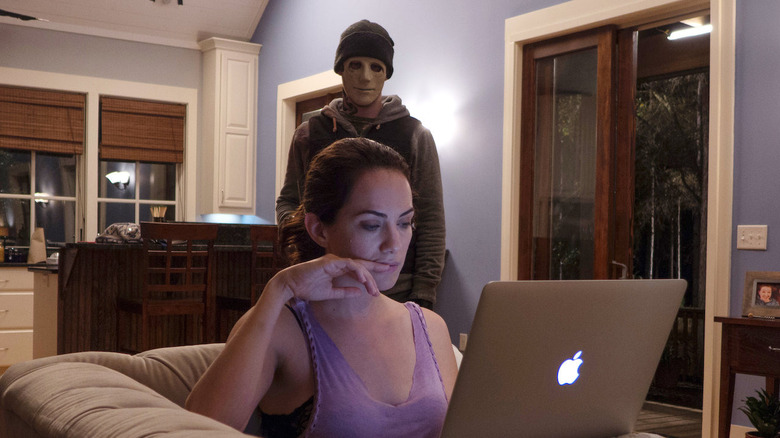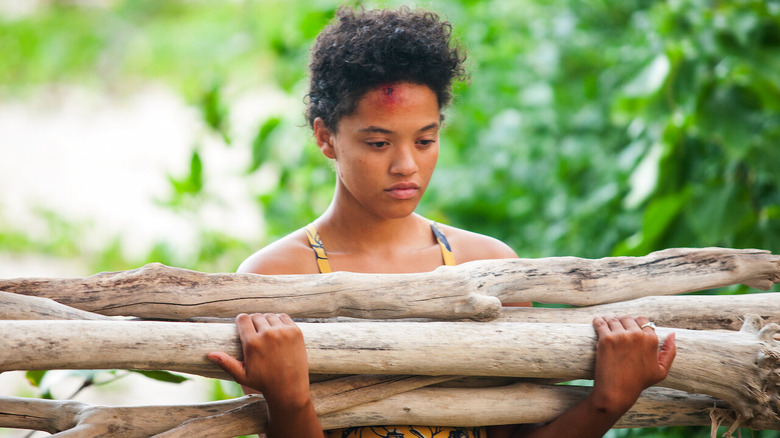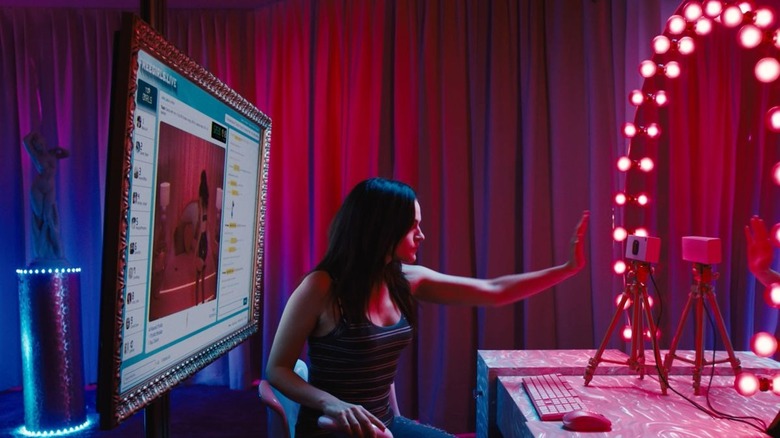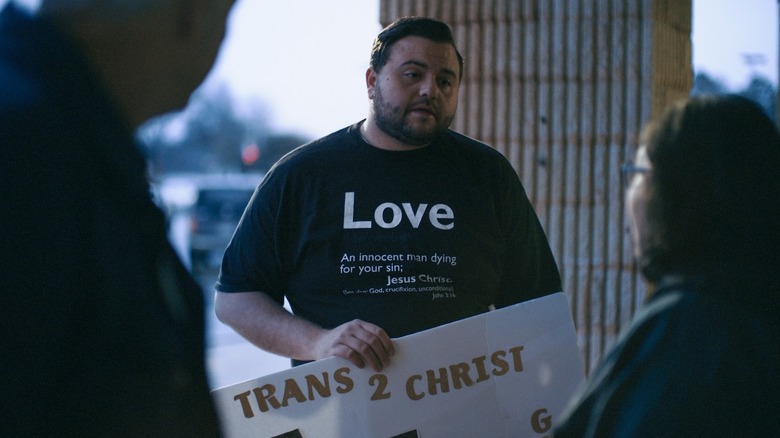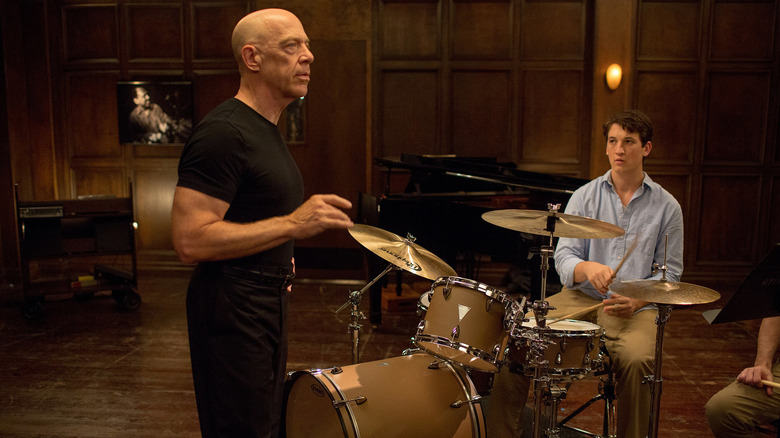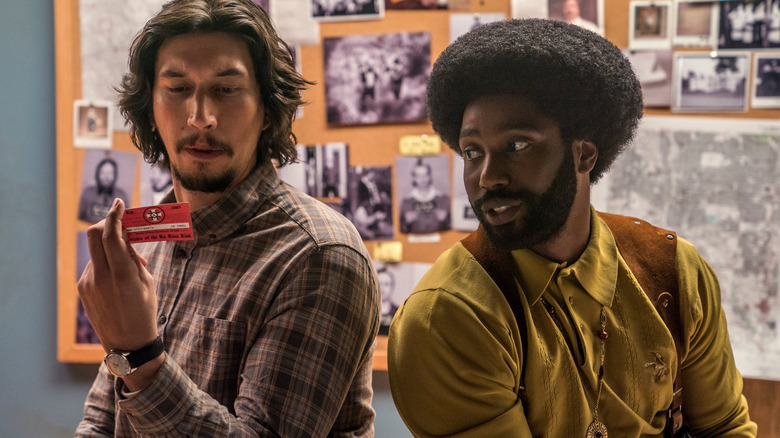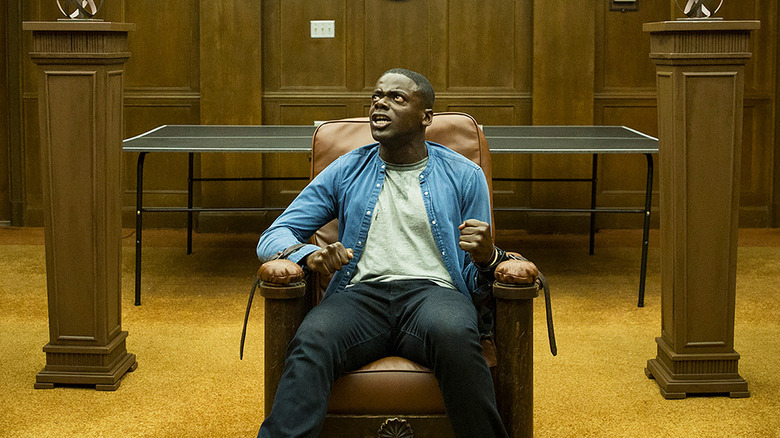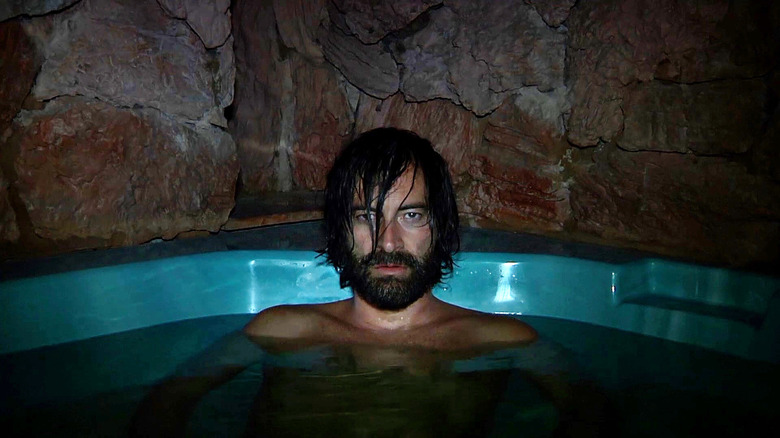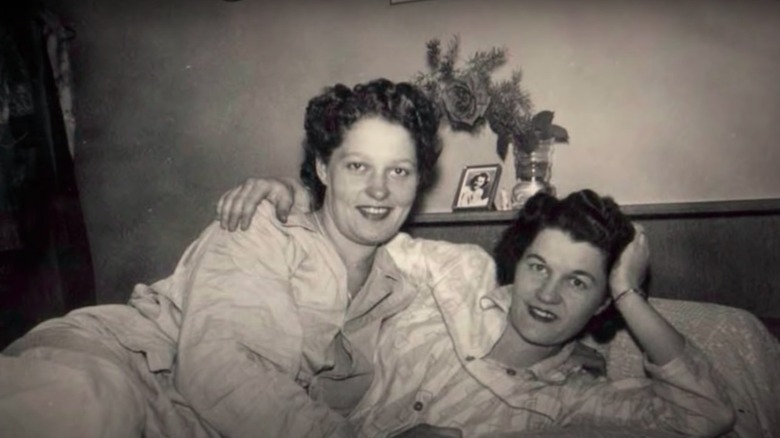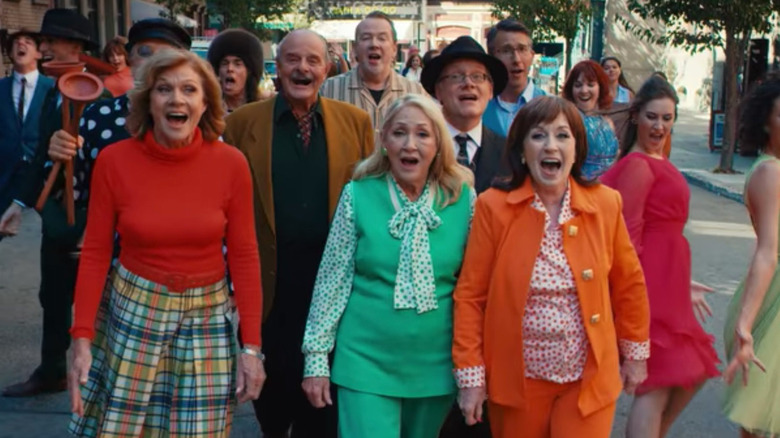Every Blumhouse Movie Ranked Worst To Best
Blumhouse Productions has been around in one form or another since 2000. For over two decades, titles from producer Jason Blum have been filling up movie theaters and streaming platforms. The outfit's 2009 title "Paranormal Activity" established a mold that many subsequent Blumhouse projects have followed: super low-budget horror films that trade an expansive scope for a deluge of scares. Since the sleeper hit success of "Activity," Blumhouse has applied this approach to titles ranging from "Insidious" to "The Purge" to "Get Out," while even expanding its horizons to include straightforward dramas like "Whiplash" and "BlacKkKlansman." The result has been a slew of massive box office successes and even multiple nominations for Best Picture at various Academy Awards ceremonies.
Blumhouse has produced over 100 projects so far, and like any studio's output, not all of them have been masterpieces. Ranking all of Blumhouse Productions' releases from worst to best in terms of critical reception makes it clear that sometimes, this company ends up backing pieces of cinema that just don't resonate with anyone. But this same exercise does allow one to also appreciate the multitude of beloved classics Blumhouse has put out. These are the titles that not only make up the best-reviewed of Blumhouse Productions but also define the best possible outcome for Blumhouse's unique practices as a studio.
103. Best Night Ever
It shouldn't be a surprise that one of the worst-reviewed Blumhouse Productions movies in history hailed from writer-director duo Jason Friedberg and Aaron Seltzer. From the creative team behind such reviled comedies like "Disaster Movie" and "Meet the Spartans," 2013's "Best Night Ever" is a comedy that chronicles the raunchy exploits of a gaggle of ladies at a bachelorette party. Critics failed to find any laughs in this found-footage film's runtime.
Even divorced from the world of spoof comedies that the filmmakers had been entrenched in for years, critics found "Best Night Ever" to suffer from faults similar to ones in titles like "Epic Movie." To most critics, the jokes came off as clumsy rather than hysterical, while the performances were by and large panned for being lifeless. Even worse, the shaky camerawork of the found-footage cinematography conceit made certain critics as sick as the "Best Night Ever" protagonists experiencing a hangover. In trying to make the next "Bridesmaids" or "The Hangover," Seltzer and Friedberg merely delivered the nadir of Blumhouse entertainment. "Best Night Ever"? According to the critics, not quite.
102. Delirium
Blumhouse Productions has worked with its fair share of big names over the years, and that includes Leonardo DiCaprio. The Oscar-winning actor's Appian Way Productions backed the company's 2018 horror film "Delirium," which stars Topher Grace and Patricia Clarkson, about a man (Grace) who leaves a mental institution and inherits a haunted house. Though DiCaprio's acting career has become synonymous with acclaimed filmmakers like Quentin Tarantino or Martin Scorsese, not everything he's produced has become an instant classic. Unfortunately, "Delirium" is one of those lesser efforts from DiCaprio as a producer, with the film's poor quality crystalized by how "Delirium" couldn't even get a theatrical release in North America and was instead sent straight to home video platforms.
The few reviews that have emerged for "Delirium" have been extremely negative, with these write-ups mostly concentrating on how Dennis Iliadis' horror movie is derivative of so many other scary films attempting to wring frights out of psychological ambiguity. A lack of energy was also routinely criticized while even the likes of Grace and Clarkson couldn't stir up much in the way of enthusiasm with their respective performances. With such a dreary and unremarkable reception, it's no wonder "Delirium" has quickly become one of the most forgotten projects to ever be associated with DiCaprio or Blumhouse.
101. The Gallows Act II
In 2019, Blumhouse Productions' "The Gallows" finally got a sequel. A customary development for horror movies and especially Blumhouse titles, "The Gallows Act II" arrived four years after its predecessor, long after the initial film had faded from the mind of moviegoers. Even the most ardent "Gallows" fans had moved on from this 2015 feature. However, had this sequel managed to deliver something extraordinary with its story of a drama student awakening an evil spirit through a viral internet challenge, it wouldn't have mattered, and "The Gallows Act II" could've excelled with audiences based on its own merits.
Unfortunately, "The Gallows Act II" was torn apart by critics, who largely found it to be even worse than its predecessor. The biggest problems highlighted through reviews were a deficiency in scares and peculiar narrative choices, namely an especially divisive twist in the third act. The late sequel was routinely dismissed as instantly forgettable. With such anemic reviews, "The Gallows Act II" finally dropped the curtain on the "Gallows" as a horror franchise.
100. The Darkness
Kevin Bacon has starred in his fair share of successful horror films, including "Tremors" and "Hollow Man." However, even his track record in this genre can't liven up the quality of the utterly lifeless "The Darkness." Released in May 2016, the film concerns a family whose autistic son begins to befriend some sort of demonic spirit. This unleashes a chain of terrifying events for each member of the family, including Bacon as the father of the group.
"The Darkness" garnered widespread bad reviews that lingered on its most obvious faults, including the lack of genuine scares and a dearth of compelling character drama. There were also recurring observations of how derivative it was of other supernatural horror cinema, notably "Poltergeist." Rather than using its influences to conjure something new and exciting, "The Darkness" left audiences without any light or fun frights to speak of. Even Kevin Bacon, so well-versed in popular horror cinema, couldn't salvage this one.
99. The Accidental Husband
Romantic comedies often have quite strange premises. It just goes with the territory and can often be a fun way to capture the ludicrous nature of love. But "The Accidental Husband" has an especially peculiar premise even by the standards of this genre. The plot here concerns Patrick (Jeffrey Dean Morgan), who exacts revenge on radio DJ and romantic expert Dr. Emma Lloyd (Uma Thurman), who inspired his fiancée (Justina Machado) to break up their engagement. His plan? To hire a neighborhood kid to use his computer hacking skills to create a fake marriage certification between himself and Lloyd. This bonkers concept puts Lloyd's plans to get married to another man (Colin Firth) in jeopardy. Hijinks ensue.
This strange premise was just one of many aspects of "The Accidental Husband" that was lambasted by critics, who took the film to task for its lack of creative screenwriting and especially for the tepid performances. Both Thurman and Morgan were routinely criticized for having zero chemistry as well as fumbling the instances when their characters engage in broad comedy. Even Firth, a veteran of rom-coms, failed to lend any sense of fun to the proceedings. Even with one of the more outlandish plots in the land of modern romantic comedies, "The Accidental Husband" was a critical nightmare.
98. Ouija
In 2014, "The Lego Movie" proved that movies based on toys could not only be good — they could be great. After the likes of "Transformers" and "Battleship," "The Lego Movie" was a sign of how to do movie adaptations of toylines right. Unfortunately, that same year would also deliver the Blumhouse horror movie "Ouija," based on the Hasbro board of the same name, in which a bunch of teens tangles with an evil spirit. The Ouija board is supposed to put you in contact with ghosts, but all the film "Oujia" does is put moviegoers in contact with especially atrocious horror cinema.
There was a lot to tear apart in a movie this subpar, but one recurring criticism among the reviews for "Ouija" was how the supernatural enemy of the film is named Doris. That's emblematic of the baffling screenwriting choices of the film, which also saddle audiences with forgettable characters and a barrage of equally disposable scares. All this despite the fact that actual Ouija boards have petrified people for decades. Even with that history to draw from, though, "Ouija" was a bust.
97. The Babymakers
"Super Troopers" director Jay Chandrasekhar went back to the point of conception for his 2012 comedy "The Babymakers," which hinges its plot on a sperm bank robbery. A rare foray into comedies for Blumhouse Productions, "The Babymakers" wasn't nearly successful enough, either critically or financially, to make the company want to return to this genre often. In terms of how it fared in its reviews, the film is one of Chandrasekhar's weaker-reviewed titles. It's worth remembering that this distinction was achieved despite this man helming such comedy turkeys as 2005's "The Dukes of Hazzard."
There were almost as few laughs in the almost-exclusively negative reviews for "The Babymakers" as there were in the movie itself as people performed an autopsy on this comedy that was dead on arrival. Sara Stewart of the New York Post, for instance, noted one critical flaw of the movie was that Olivia Munn's character, Audrey, got very little to do in terms of comedy and was mostly around to embody a stereotypical wife character. Others criticized the movie for overdoing its lewd humor to the point that instances of raunchiness became tedious rather than shocking. One thing was for sure: "The Babymakers" wouldn't be the next "Super Troopers."
96. Fantasy Island
"Fantasy Island" was a TV show in the 1960s that proved so popular that Hollywood has opted to reboot it a handful of times over the years. Usually, these reimaginings have been confined to the small screen, where the property originated. However, in 2020, the world was treated to a big-screen adaptation of the program courtesy of Blumhouse, which reimagined the concept — guests to a remote island have their fantasies brought to life by the mysterious Mr. Rourke (Michael Peña) — as a horror movie. The whole thing sounds like a parody of how desperate Hollywood can be to exploit any and all familiar IP, and unfortunately, the end result isn't much better than that.
"Blumhouse's Fantasy Island" was mostly criticized for its frightening lack of scares, a problem exacerbated by its decision to aim for a PG-13 rating. There was no chance for inexplicably graphic violence or buckets of blood to liven up the proceedings. Reviews also highlighted the atrocious dialogue as a fatal shortcoming of the film, particularly one infamous line used to establish that a character has been transported to the 1990s. Even Peña's performance as Rourke failed to drum up much enthusiasm from critics. The "Fantasy Island" property has endured for years now, so this film adaptation will inevitably be forgotten as just a footnote in its history.
95. The Boy Next Door
The greatest legacy left behind in 2015's erotic thriller "The Boy Next Door" is a moment where 19-year-old Noah Sandburn (Ryan Guzman) hands Claire Peterson (Jennifer Lopez), as a romantic gesture, a first edition of "The Iliad." Meant to convey the affection Sandburn now feels for his older lover, the moment only inspires befuddlement from viewers over how this kid was able to secure the first edition of a book published back in the eighth century B.C. and first published in English in the 1500s. Supposedly secured at "a garage sale," the moment became a go-to punchline so prominent and widespread that director Rob Cohen eventually had to comment on it. This inexplicable moment may make "The Boy Next Door" sound like the next campy masterpiece perfect for midnight screenings, but unfortunately, it was one of the rare moments in the film to get any kind of affection from moviegoers.
Criticism for "The Boy Next Door" primarily revolved around how it isn't sleazy enough despite its genre and premise. Christy Lemire of RogerEbert.com, for instance, noted that the film's climax, set in a burning barn, is just what the whole film should've been in terms of delivering tense melodramatic trash. Unfortunately, Lemire saw the rest of "The Boy Next Door" as just being tedious when it needed to be juicy or naughty. Not even the presence of a first-edition copy of "The Iliad" could spruce up the disappointingly humdrum vibes of "The Boy Next Door."
94. Firestarter
One of the great recurring disappointments of Hollywood is how promising filmmakers get famous for bold, original fare and are then recruited to make middling adaptations and remakes. The unique sci-fi visions of Duncan Jones in projects like "Moon" or "Source Code," for example, inspired Hollywood to hand him "Warcraft," while Keith Thomas, whose directorial debut was the acclaimed horror title "The Vigil," was handed a 2022 remake of the 1980s horror title "Firestarter," both based on a Stephen King story of a little girl (Ryan Kiera Armstrong) who can start fires with her mind.
All of the positive buzz surrounding "The Vigil" vanished with the arrival of "Firestarter." Nearly unanimous negativity greeted this feature, with critics' being almost entirely united in their disdain for key aspects of the movie. These included its dimly let sets, awkward camerawork, and worst of all, a dearth of frightening scares. Under any circumstances, "Firestarter" would've been perceived as a bad movie. However, it proved to be an especially disappointing strain of bad cinema given that it was another example of a once-promising filmmaker getting bogged down by Hollywood's refusal to look beyond remakes and sequels.
93. This Is the Night
With 2020's "This Is the Night," writer-director James DeMonaco opted to go for something more intimate and personal compared to his earlier forays as a filmmaker. DeMonaco had leaped into a new level of notoriety for creating the "Purge" franchise and for directing the first three installments in that saga. However, no man can live on "Purge" alone, and thus DeMonaco set off to make "This Is the Night," a quasi-autobiographical coming-of-age drama set in 1983. If done right, this would be the movie that showed off DeMonaco's artistic chops while delivering poignancy and insights into the human condition.
Unfortunately, DeMonaco didn't quite prove as effective at those pursuits as he was at coming up with new twisted masks for people to wear during The Purge. "This Is the Night" scored largely negative marks from critics, with the biggest complaint being its contrived screenplay. While praise was offered to the cast, which includes Bobby Cannavale, Frank Grillo, and Naomi Watts, critics were largely uninterested in the results of DeMonaco going in more thoughtful directions as an artist. Going the personal route did not make "This Is the Night" the next wistful masterpiece meditating on formative adolescent experiences.
92. The Gallows
If there's anything to take away from horror cinema, it's that creepy murderous figures can be lurking anywhere. In your dreams, at a summer camp, or even during a slumber party. 2015's "The Gallows" attempts to reinforce this by delivering a ghoulish killer lurking inside a high school auditorium at the staging of a haunted play. This devious figure sets off after a group of high schoolers break into the building after dark, with all the carnage captured through a camcorder. "The Gallows" didn't quite succeed in making people as fearful of high school auditoriums as "Jaws" had made moviegoers petrified of the beach. In fact, "The Gallows" failed to drum up much in the way of positivity from those who chose to hang out with this horror movie.
The primary problem with "The Gallows"? The lack of engaging characters or memorable kills. Forgettable fodder for a killer to slice up can be forgiven if the deaths are cool, while derivative deaths are manageable if a horror movie has some compelling characters. Without either of these elements, not to mention an overdose of frustrating shaky-cam cinematography, "The Gallows" was mostly inert rather than terrifying.
91. Area 51
After he delivered the massive sleeper hit "Paranormal Activity," all eyes were on director Oren Peli and what he would do next. Turned out, though, just as "Activity" was taking the world by storm, he was already hard at work on his follow-up directorial effort. In November 2009, Variety reported that Paramount Pictures had bought up the distribution rights to "Area 51," a found-footage horror movie that Peli had already finished shooting. However, the film languished on a shelf for years and was finally given an unceremonious release in May 2015. After all that waiting, it turned out "Area 51" was a dud bad enough to make it understandable why Paramount kept it buried for so long.
The scant few reviews that have been published for "Area 51" have mostly knocked it for refusing to do anything new with the found-footage horror genre as well as for a lengthy first act that proves extraneous to the overall story of a group of teens breaking into a government facility. Worst of all, there was a repeated sentiment that the film failed to show off anything new in Peli as a filmmaker — "Area 51" was just more of the same schtick audiences saw in the original "Paranormal Activity." Tragically, "Area 51" became a quintessential example of a director suffering from a sophomore slump.
90. Paranormal Activity: The Ghost Dimension
All good things must come to an end, even long-running horror franchises. Though it would eventually get a new lease on life in 2021, the "Paranormal Activity" saga initially seemed to be ready to call it quits with the 2015 entry "Paranormal Activity: The Ghost Dimension." In addition to promising finality to this long-running series, "The Ghost Dimension" was also the first "Paranormal Activity" installment to deliver supernatural frights in digital 3D. However, an extra dimension and opportunities for concrete closure weren't enough to get critics on board for "The Ghost Dimension." This entry continued the creative rut that the franchise got stuck in with "Paranormal Activity 4." Any novel scares from that original "Paranormal Activity" had long vanished.
Bilge Ebiri of Vulture was especially critical of this installment for one especially discouraging flaw: an emphasis on the human characters. Ebiri felt that "The Ghost Dimension" lingers way too much on forgettable human melodrama at the expense of potentially cool-looking — or at least scary — ghosts. Similar criticisms abounded in other reviews for the film, with other prominent critiques including an often difficult-to-comprehend screenplay and the poorly implemented 3D. All good things do come to an end, or in the case of the temporary franchise-finisher "The Ghost Dimension," so do very bad things.
89. Sinister 2
The original "Sinister" from 2012 was not an instant masterpiece but got its fair share of praise and even scored a bit of a cult following. Even those mild accomplishments evaded the grasp of its sequel, "Sinister 2." Releasing in August 2015, "Sinister 2" was trashed by critics, with Wesley Morris of Grantland even going so far as to say that the film is evidence of when audiences should just say no to cash-grab horror sequels. Such a declaration emerged thanks to, among other flaws that Morris harped on, a bunch of evil kid characters who were more bratty than unnerving as well as suffocating an occasionally engaging lead performance from James Ransone underneath a nonsensical narrative.
Robert Abele of the Los Angeles Times, meanwhile, lambasted "Sinister 2" for failing to either live up to the grimy nature of its predecessor or come up with a uniquely compelling atmosphere. There was no shortage of negative comments thrown at "Sinister 2," with even the cinematography coming under fire from the likes of Keith Uhlrich of The A.V. Club, who noted how making everything so overlit undercut the attempts at creating a foreboding atmosphere. Scarier than any of the chilling home movies featured in the pair of "Sinister" movies is the idea that "Sinister 2" was supposed to function as effective horror cinema.
88. Truth or Dare
Who hasn't played a game of Truth or Dare? It's an especially exciting game when you're young that promises inevitable excitement, whether it comes from secrets getting revealed or familiar friends engaging in a risky activity as part of a "dare." But it's doubtful anyone who ever played the game thought that it would be perfect fodder for a horror movie. Someone at Blumhouse Productions thought differently. The game was the centerpiece of 2018's "Truth or Dare," starring Lucy Hale and Tyler Posey as two teens embroiled in a high-stakes life-or-death supernatural version of the game. The reviews for this project ended up being more uncomfortable than any botched round of the actual game, with critics far and wide finding this Jeff Wadlow project coming up woefully short on anything resembling entertainment.
Valerie Complex of The Playlist dubbed "Blumhouse's Truth or Dare" as one of the worst movies of 2018 — even though it was only April when her review was published. Complex still felt confident making that declaration given the dire lack of interesting characters and how this feature manages to make something as simple as the rules behind a cursed Truth or Dare game convoluted. Other critics were no more impressed with "Truth or Dare" and advised moviegoers around the globe to pass on seeing it.
87. The Lazarus Effect
"The Lazarus Effect" had a way bigger cast than usual for a Blumhouse horror movie made on the cheap. Headlined by future "Booksmart" helmer Olivia Wilde, 2015's "The Lazarus Effect" also features indie darling Mark Duplass, Evan Peters, beloved character actor Ray Wise, and even Donald Glover a year before "Atlanta" began airing on FX, all playing researchers trying to raise the dead. The combination of all these talented performers would make one think that "The Lazarus Effect" couldn't be that bad, that surely something entertaining must emerge with all these artists collected on one set. Unfortunately, "The Lazarus Effect" manages to waste not only its cast, but also its director, David Gelb, who was previously responsible for the acclaimed 2011 documentary "Jiro Dreams of Sushi."
None of these people, though, could salvage a horror movie that was widely dismissed by critics as being a run-of-the-mill exorcism horror film. Keith Phipps of The Dissolve, for one, was disappointed in many parts of "The Lazarus Effect," including how so much of the story took place in a dreary basement lab. He also remarked that adhering to a PG-13 rating dulled the edges off strained attempts at frightening the audience while questioning why a cast of this caliber was wasted on a movie this forgettable. No amount of big-name actors could salvage a horror movie this bad.
86. Incarnate
While some Blumhouse Productions exorcism horror movies are built around generic premises, "Incarnate" bucks the trend a bit with an undeniably outlandish set-up. Aaron Eckhart plays a priest who performs exorcisms by pulling an "Inception" and going inside the mind of those who've been captured by a demonic spirit. This ludicrous concept sets one up to expect some equally preposterous scares or at least a plot that's constantly following the wildest parts of its imagination. Unfortunately, "Incarnate," directed by "San Andreas" helmer Brad Peyton, doesn't offer up much innovation beyond its starting concept. Critics were not enthusiastic about the film, with many being gravely disappointed that "Incarnate" turned out to be so boring.
Katie Rife of The A.V. Club observed that the primary failing of "Incarnate" was how its central mythos turns out to be so dense that it's hard to ever get invested in the central drama or any of the characters. This was a case where lore didn't just supersede but overwhelmed any semblance of dramatic tension. Other critics also took issue with how "Incarnate" is so often derivative of other exorcism features. While it's true "Incarnate" has a solid starting premise, it needs way more than that to make an entertaining feature-length movie.
85. Tooth Fairy
Primarily, Blumhouse has focused on horror movies, with occasional detours into dramas and documentaries. But believe it or not, one of the earliest projects from Blumhouse was a family movie. And not just any kid-friendly feature, it was the 2010 comedy "Tooth Fairy." Starring Dwayne Johnson as a hockey player turned into the titular mythological figure, "Tooth Fairy" was a departure from most Blumhouse movies with its target demo, while its atrocious reviews were a sharp contrast to the praise that's greeted the most beloved Blumhouse projects.
"Tooth Fairy" was mostly raked over the coals for taking a concept as strange as "The Rock becomes a tooth fairy" and turning it into something mundane. The familiar plot beats and emotional moments felt so lazy for a film with a ludicrous starting concept. Lazy humor and unimpressive visual effects only further reinforced the negative reception of this production. "Tooth Fairy" is now an outlier in the Blumhouse canon, and the dismal reviews it received indicate that the company won't be returning to family movie terrain anytime soon.
84. Visions
With Isla Fisher, Jim Parsons, and Gillian Jacobs in its cast, you'd be forgiven for imagining that the 2016 Blumhouse feature "Visions" is one of the studio's rare comedy titles. However, this is a decidedly spooky horror movie, one helmed by "Saw 3D" director Kevin Greutert to boot. The juxtaposition of such predominately comedic performers with a grim horror premise — haunted happenings at a California vineyard — didn't result in a compellingly unique concoction or even an all-time great example of mismatched filmmaking. Instead, the general reviews for "Visions" captured a sense of tedium, as many of its biggest critics opined on how this feature was far too similar to other past horror films, many of them also made by Blumhouse.
Trace Thurman of Bloody Disgusting did admit that the final 15 minutes of "Visions" were entertaining but also remarked that everything leading up to that worthwhile finale was utterly torturous to sit through. For Thurman, the primary issue with "Visions" came down to a truncated runtime that stripped the story of any deeper themes or opportunities to get to know the characters better. Flaws like this ensured that "Visions" was destined to be critically eviscerated and become one of the more forgotten entries in the Blumhouse canon, even if it is the rare horror film to be headlined by Sheldon Cooper.
83. Jem and the Holograms
The concept of turning the 1980s cartoon "Jem and the Holograms" into a movie makes the mind reel with the possibilities of all the fun that could entail. The source material was so unabashedly goofy — the stories of a band of lady musicians who also work as spies — that one could see it easily becoming an irresistible camp masterpiece. Unfortunately, 2015's "Jem and the Holograms" was executed as a super low-budget Blumhouse movie and one grounded deep in reality to boot. There was no room for ridiculousness or high-concept flights of fancy, just melodrama ripped straight out of a Disney Channel Original Movie.
This flaw was often repeated in the scathing reviews that greeted "Jem and the Holograms," with many of these assessments also bemoaning that potentially funny source material and talented actors were wasted on such generic material. The film's reputation has only gotten worse in the years since considering director Jon M. Chu has gone on to make movies like "Crazy Rich Asians" and "In the Heights." The superb direction and visual energy in those projects only underline how lifeless "Holograms" is. This feature couldn't even be bothered to deliver a fun soundtrack of nifty girl power anthems or rebellious rock ditties. No matter how you slice it, "Jem and the Holograms" just came up ridiculously short.
82. Paranormal Activity 4
The first three "Paranormal Activity" movies weren't free from criticism, but they generally got more positive reviews than they didn't. But this streak of prominently approving reviews came to a grinding halt with the fourth entry in the series in 2012, which picks up the possessions after the events of "Paranormal Activity 2." The novelty of seeing supernatural scares creeping up on people, all captured through a found-footage style, had apparently worn off.
Critics were largely unimpressed with this entry primarily because of how it refused to take the franchise anywhere new. Rather than delivering a new period-era setting like "Paranormal Activity 3" or finding a cool new manifestation for the found-footage gimmick, "Paranormal Activity 4" just played like a retread of the earlier films. While some critics found it delivered just enough scares to get a pass, the general reception to "Paranormal Activity 4" indicated that this saga was now haunted by something truly terrifying: creative stagnation.
81. The Darwin Awards
One of the earliest projects to emerge from the Blumhouse Productions banner, "The Darwin Awards" was a comedy about a disgraced detective (Joseph Fiennes) working alongside an insurance investigator (Winona Ryder) to investigate peculiar ways that people have perished. Wacky antics ensue. Interestingly, "The Darwin Awards" served as a harbinger for the kind of cinematography early Blumhouse movies would predominately employ. This feature from Finn Taylor, much like other comedies such as "Drop Dead Gorgeous" or "This Is Spinal Tap," was shot like a documentary. Though not the exact same thing as the found-footage mold that titles like "Paranormal Activity" would adhere to, "The Darwin Awards" did help establish Blumhouse's affinity for handheld camerawork.
Unfortunately, that was one of the few distinctive things about the movie, as it otherwise was widely rejected by critics. Like many comedies that miss the mark, "The Darwin Awards" was faulted for failing to bring the laughs and for thinking a one-note gimmick premise was enough to sustain a whole feature. More specific to this film, "The Darwin Awards" was also criticized by writers like Eric D. Snider for being anchored by a forgettable lead performance by Fiennes. Blumhouse would up making more movies after "The Darwin Awards" captured in a quasi-documentary fashion, but thankfully, the studio would also end up making more movies significantly better than this one.
80. Jessabelle
Today, Sarah Snook is best known for her work as Shiv Roy in "Succession." Winning a Golden Globe for the role, Snook is now famous for delivering some of the most iconic lines in the entire show and for having fascinatingly complex chemistry with her costars, namely Jeremy Strong and Matthew MacFayden. However, Snook has been acting long before she joined the wealthy debauchery on "Succession," and that included her scoring the lead role in the Blumhouse horror film "Jessabelle." Helmed by Kevin Greutert, the project, about a vengeful spirit in a Louisiana family home, wasn't quite as acclaimed as Snook's eventual HBO show, to put it gently. "Jessabelle" was largely dismissed by critics, though some did take the time to praise Snook in the lead role.
Though Sheila O'Malley of RogerEbert.com did give "Jessabelle" credit for setting its story in the unique and visually pleasing world of the Louisiana bayou, she was otherwise highly critical of the production, with her greatest complaint being that it utterly failed at meeting the barest requirements for a competent horror movie. Monica Castillo for Movie Mezzanine, meanwhile, was more mixed than negative, and gave the movie props both for Snook's performance and for avoiding certain racist stereotypes associated with horror movies rooted in voodoo culture. However, she was still critical of other derivative aspects of the movie, which dominated most other reviews for the forgettable "Jessabelle."
79. Amityville: The Awakening
After years of dormancy, the "Amityville Horror" franchise came roaring back to life with "Amityville: The Awakening," though it wasn't quite the prolific return one would expect for such an iconic series. Despite coming courtesy of Blumhouse Productions, "Amityville: The Awakening" was constantly delayed from its original January 2015 release date until it was unceremoniously dumped into theaters and onto video-on-demand platforms in October 2017. Some quality movies just run into a string of bad luck when they receive such a worrisome barrage of postponements. Unfortunately for "Amityville: The Awakening," this unceremonious release was a pronounced indicator that this wasn't a very special horror movie.
Credit where credit is due, "Amityville: The Awakening" didn't get scorched by critics, with some outlets like IGN even admitting that it was better than several other entries in the "Amityville Horror" saga. Unfortunately, not being the next "The Gallows" wasn't enough to make "Amityville: The Awakening" actually well-liked. Despite a meta angle, the film still does the same "doomed family in a spooky new house" plot, and critics were largely dismissive of the production's erratic tone and a lack of originality in the scares. Even performances from experienced and acclaimed actors like Jennifer Jason Leigh and Kurtwood Smith mostly inspired indifference from critics. With these kinds of criticisms running rampant, perhaps it would've been best if "Amityville: The Awakening" had kept on postponing its release indefinitely.
78. Paranormal Activity: The Next of Kin
After six years, "Paranormal Activity" got a sudden resurgence thanks to the Paramount+ streaming service. A new installment entitled "Paranormal Activity: The Next of Kin" got released in 2021 on this streamer as Paramount+ pushed into original movies. While the preceding "Paranormal Activity" movies had been unified by a dense mythology that spanned decades, "Next of Kin" played things entirely standalone in an isolated Amish community, save for featuring the nefarious demon Tobi. While that would sound like an opportunity for "Next of Kin" to do something truly extraordinary with so much creative freedom, instead, "Next of Kin" just ended up being another rote "Paranormal Activity" movie.
The biggest problem that kept cropping up in the negative reviews of William Eubank's "Next of Kin" concerned how empty the movie felt. In avoiding feeling too much like its predecessors, "Next of Kin" ended up being a hollow shell of a feature. Kristy Puchko of Mashable, for instance, labeled the film a "shrug" and felt it was far too similar to other found-footage horror titles, while other reviews complained about "Next of Kin" feeling too derivative of "Midsommar." Though it made bold swings in redefining what kind of stories a "Paranormal Activity" movie could tell, "Next of Kin" failed to deliver any kind of memorable scares.
77. Stephanie
Not all of his screenplays have been beloved by fanboys and critics alike, but Akiva Goldsman has penned his fair share of scripts that have gone on to great success. In addition to winning the Best Adapted Screenplay Academy Award for his work on "A Beautiful Mind," he's penned scripts for movies ranging wildly from "The Client" to "I, Robot" to "The Da Vinci Code." However, as a film director, Goldsman's been objectively on a cold streak, with his only two forays into this field getting terrible marks critically. His debut in this craft was "Winter's Tale," a 2014 romantic drama that became a punchline for its bizarre and often incoherent storytelling. As a follow-up to that feature, Goldsman next helmed 2017's "Stephanie," which didn't fare any better with its largely negative critical reception. The film follows a little girl (Shree Crooks) who lives in the woods with her parents (Frank Grillo and Anna Torv) in the wake of an apocalyptic event.
The most fatal shortcoming of "Stephanie" was pinpointed in Meredith Border's review of the movie for Birth.Movies.Death., in which this writer bemoaned how "Stephanie" failed to realize that its central story would be much more compelling if it was told through a more intimate lens. By eschewing that approach in favor of bloat and scope, Borders observed that "Stephanie" left so much potential on the table. Other critics echoed such negative critiques, thus ensuring that Goldsman's cold streak as a director continued unabated.
76. Insidious: The Last Key
The "Insidious" movies have amassed an oddly middle-of-the-road reputation among critics. None of these films have become critical darlings, yet they've also never become truly scorned. Often, the "Insidious" installments just register as middle-of-the-road fare, nothing to pinpoint as special, but also nothing to single out as especially terrible. The closest the series has gotten to a movie that just didn't gain much traction at all from critics was "Insidious: The Last Key," the fourth installment in the saga which was released to theaters in January 2018. Serving as a prequel to the initial two "Insidious" entries, "The Last Key" was not quite good enough to justify to critics why the "Insidious" franchise was still going after so much time.
However, if there was one part of "Insidious: The Last Key" that did score positive marks, it was the lead performance of Lin Shaye as paranormal investigator Elisa Rainer. Karen Han for The Daily Beast praised how Shaye had emerged as the protagonist of the franchise and how compelling she was in "The Last Key." Unfortunately, Shaye wasn't enough to save the rest of "The Last Key," which Jordan Hoffman of The Guardian dubbed a tedious rehash of familiar hallmarks from past "Insidious" and supernatural horror movies. Shaye's work in "The Last Key" embodies why the "Insidious" films haven't been written off entirely, but the flaws of this entry also crystallize why this saga can't get more consistent respect.
75. Plush
After her work on "Twilight," director Catherine Hardwicke initially attempted to recapture the young-adult fantasy romance angle yet again with the 2011 film "Red Riding Hood." When that feature didn't quite take off at the box office, Hardwicke went back to the days when she made microbudget indies like "Thirteen" with the 2013 feature "Plush." Produced for a modest sum (as per any movie made at Blumhouse Productions), "Plush" was a darker R-rated project from Hardwicke, an erotic drama about a rock starlet (Emily Browning), but it didn't reverse the negative critical trajectory of her then-recent directorial efforts.
Jen Chaney of The Dissolve, for instance, bemoaned how "Plush" was such a step down from Hardwicke's earlier more promising works like "Thirteen" while also offering mild praise for how the last 15 minutes were much more preposterous and melodramatic compared to the more lifeless sequences that preceded this conclusion. The general reception to "Plush" wasn't much better than that, with other critics also pointing out how the production suffered from a dire lack of confidence in its supposedly rebellious identity. Hardwicke has been responsible for several acclaimed and influential movies in her career, but unfortunately, "Plush" is not one of her directorial efforts that fits that bill.
74. Glass
With "Glass," writer-director M. Night Shyamalan was delivering on nearly two decades' worth of promises by finally delivering the "Unbreakable" sequel that fans had been craving. Even better, this project wouldn't just be bringing back Bruce Willis and Samuel L. Jackson in their respective roles from that earlier Shyamalan film. It would also intersect directly with the world of "Split" from 2017 for a major clash of realistic superheroes. Given that both "Unbreakable" and "Split" are among the better-reviewed titles in Shyamalan's oeuvre, it wouldn't have been unreasonable to assume that bringing them together would result in something equally acclaimed. Unfortunately, "Glass" received much more mixed feedback compared to its predecessors, with many feeling it just didn't live up to the long wait.
Anthony Lane of The New Yorker, for one, expressed fondness for how much passion Shyamalan brought to his deconstructions of the superhero genre, but also noted that the overall emptiness of the production swallowed up all those good creative intentions. The ambition Lane was referencing did inform some of the positive marks that "Glass" received, with Brian Lowery of CNN feeling that the feature hit enough of its targeted goals to make "Glass" a successful creative endeavor. However, that kind of sentiment was far from the norm for "Glass," which was overall more divisive than beloved despite all the pre-release hype.
73. The Green Inferno
Eli Roth became a hot name in the world of horror cinema in the 2000s thanks to his breakout projects "Cabin Fever" and "Hostel." However, after just his third directorial effort, "Hostel: Part II," Roth spent six years engaging in other creative pursuits, like writing and producing "The Man with the Iron Fists" and taking up small acting roles in movies like "Inglourious Basterds." However, he came roaring back as a filmmaker with his 2013 feature "The Green Inferno." Roth was already known for being a man who didn't flinch from depicting gruesome horror in his works, but "Inferno" took this to a new level by making the movie a tribute to 1980s cannibal horror cinema like "Cannibal Holocaust." It was a disturbing and graphic work and one that was never going to appeal to a wide audience.
Still, even considering the divisive nature of the brutal material, "The Green Inferno" failed to gain much traction critically. Alison Willmore of Buzzfeed observed that "The Green Inferno" failed to reach its fullest potential as a piece of social commentary (one that would criticize Western activists for treating indigenous people as props for personal gain) because it succumbed to stereotypical portrayals of indigenous people itself. With such thoughtless sociopolitical underpinnings, critics mostly found "The Green Inferno" to be an overlong compilation of grisly murders and uncomfortable stereotypes.
72. Paranormal Activity: The Marked Ones
With 2014's "Paranormal Activity: The Marked Ones," this horror franchise expanded its narrative gaze considerably. While a found-footage filming style was maintained, "The Marked Ones" largely abandoned the lead characters of the preceding movies in favor of a new cast of largely Latinx characters. It was a gamble, but a necessary one for the series. Having already produced four installments, the "Paranormal Activity" movies had to do something new and bold to stave off creative stagnation. However, this conceptually bold maneuver didn't quite pay off for the film itself. "Paranormal Activity: The Marked Ones" wasn't quite the worst-reviewed entry in the saga, but it was still largely rejected by critics, with the primary criticism being that it failed to offer anything new for the franchise.
Wesley Morris of Grantland praised the new Latinx cast and the setting while bemoaning how trite the set-up has become: "the fifth installment ... has come to the hood, and what happens is more or less the same as what's happened previously," he wrote. A.A. Dowd of The A.V. Club felt that "The Marked Ones" was different from other "Paranormal Activity" movies to its own detriment, with Dowd feeling there was way more dead air between scares in this installment compared to its predecessor. "The Marked Ones" marked a bold detour for the "Paranormal Activity" saga, but that wasn't enough to salvage a long-running series short on scares.
71. The Purge
The saga of "The Purge" began with the aptly titled "The Purge." While later entries in the series would spawn fans thanks to their mixture of hot-button sociopolitical edge and hard-R action, this inaugural entry in the series scored a more mixed reception. This initial "Purge" limited its focus to one wealthy family trying to survive an onslaught of invading attackers after they help give shelter to a homeless man, a noticeably smaller-scale narrative than the sequels. A more limited story didn't necessarily result in a more intense storyline, though, as "The Purge" got a negative enough reception to make it seem like nobody would want to see further adventures in this universe.
While critics largely recognized the unique concept at the heart of "The Purge" concerning a 12-hour period where everything is legal, there was a similarly widespread perception that "The Purge" failed to utilize that idiosyncratic premise for all its potential mileage. Leslie Felperin of Variety, for one, was disappointed with how a distinctive starting concept was wasted on a bunch of forgettable scares as well as a strange narrative structure that separated the family for much of the runtime. Such shortcomings were widely recognized in other reviews for "The Purge," whose biggest virtue turned out to be providing an underwhelming enough adventure that the sequels could surpass it with ease.
70. Insidious: Chapter 2
In July 2013, James Wan's "The Conjuring" hit theaters and immediately scored critical acclaim, the kind that signaled that Wan had hit a new level of mastery as a filmmaker. But that wasn't his only horror title that year. He also had "Insidious: Chapter 2," a follow-up to his 2011 sleeper hit "Insidious." Bringing back the principal cast from that production, "Insidious: Chapter 2" was a box office phenomenon, but it didn't quite resonate so deeply with critics. Jesse Hassenger of The A.V. Club, for instance, was deeply disturbed by how often the screenplay's clunky dialogue undercuts the moments of suspense, a flaw that can prove deadly for a horror movie.
Ian Buckwalter of The Atlantic, complimented some elements of the story structure in "Insidious: Chapter 2" but was otherwise unimpressed with the film and its attempts at wringing more frights out of the "Insidious" mythology. In fact, he used the film, and the diminishing returns its world had in terms of providing scares, as a key example of why horror movies are poor fits for sequels. While some writers, like Bilge Ebiri of Vulture, praised Wan's immersive filmmaking, the general response to "Insidious: Chapter 2" was disinterest, a sharp contrast to the widespread raves that greeted "The Conjuring" just a few months earlier.
69. Halloween Kills
The 2018 "Halloween" movie from director David Gordon Green resurrected the "Halloween" franchise by re-centering the focus on Jamie Lee Curtis's Laurie Strode character and by injecting some totally unique scares into this series. Shortly after its enormous success, a pair of sequels were announced, the first of which was "Halloween Kills." Continuing on mere minutes after the 2018 "Halloween" ended, "Halloween Kills" amped up the brutality of the kills and focused heavily on the horrors of mob violence. Unfortunately, despite maintaining the same creative team as its predecessor, "Halloween Kills" was a far cry from the 2018 "Halloween" in terms of general critical reception, with this sequel scoring largely mixed notices.
The flaws of "Halloween Kills" were numerous, including the bizarre decision to restrict Strode, the horror movie action hero of the last movie, to a hospital bed for the entire runtime. The extreme emphasis on flashback sequences and nods to even the most obscure characters from the 1978 "Halloween" also scored derision. Oliver Jones of Observer was so dismissive of the final product that he summed up this entire enterprise as something resembling a "desecration" of the "Halloween" saga. While the 2018 "Halloween" managed to breathe new life into this saga, "Halloween Kills," unfortunately, flatlined the franchise.
68. You Should Have Left
"You Should Have Left," a Blumhouse horror movie helmed by David Koepp and starring Kevin Bacon and Amanda Seyfried, debuted on digital rental platforms in June 2020, just a few months into the COVID-19 pandemic. At this point, the media landscape was so devoid of new movies that it would be excusable if critics had embraced any new feature, no matter how lousy, as being akin to an old friend, one they were so glad to see and had no faults to speak of. But even in these potentially charitable conditions for fresh films, "You Should Have Left" was largely rejected by critics. It didn't matter if there were no other new horror motion pictures in the marketplace, scarcity didn't turn "You Should Have Left" and its story of a family moving into a time-bending Welsh mansion into the next "Get Out" or "Upgrade."
Jocelyn Noveck of Associated Press didn't feel that "You Should Have Left" was totally devoid of merit and particularly praised Bacon and Seyfried's believable and engaging chemistry as the central married couple. However, she also bemoaned that the horror elements weren't anywhere near as interesting as the more grounded character details while also commenting that the screenplay was too evocative of the vastly superior "The Shining." Similar sentiments reappeared throughout the general reviews for "You Should Have Left," which often praised the atmosphere and performances but otherwise felt this was a disposable horror title.
67. Black Christmas
The 1970s slasher movie "Black Christmas" already got the remake treatment in 2006, but Blumhouse Productions opted to revamp the title once more in 2019 with director Sophia Takal. The filmmaker behind the acclaimed 2016 indie "Always Shine," it was reasonable to assume that Takal had the chops necessary to ensure that a second "Black Christmas" remake wasn't weighed down by redundancy. Unfortunately, the final product scored mixed marks from critics, a far cry from the general reception of other Takal movies.
Leah Greenblatt of Entertainment Weekly expressed an extreme sense of disappointment that "Black Christmas" fell short of its potential given that Greenblatt felt that the notion of using "Black Christmas" to reinterpret horror movie hallmarks through a female gaze was quite enticing. Unfortunately, for Greenblatt, the often-impenetrable screenplay negated that potential and left the film coming up short of what it could've been. Similar sentiments abounded in the general response to "Black Christmas," though it wasn't without its defenders. Angelica Jade Bastien of Vulture, for instance, commended how the film blended a slasher movie with "an in-your-face fury" regarding how sexual assault is handled on college campuses. Such opinions indicated that "Black Christmas" had hit the mark for some moviegoers, giving this divisive film at least more of a cult fanbase than typical horror movie remakes.
66. Dark Skies
"Dark Skies" is probably one of the more obscure titles in the Blumhouse Productions library to have scored a wide theatrical release. Neither a remake of a beloved earlier film nor a title successful enough to even spawn a direct-to-video follow-up, "Dark Skies" came and went without much fanfare in 2013. There's a multitude of reasons for this, including how the film wasn't distributed by Universal like most Blumhouse titles but rather by the extremely troubled Weinstein Company. However, the likeliest culprit for the obscure status of this story of a suburban family terrorized by aliens is that it simply wasn't all that great. "Dark Skies" got unremarkable notices from critics, who didn't feel this sci-fi horror film did much to distinguish itself in a crowded marketplace of frightening films.
Drew Taylor of IndieWire commended "Dark Skies" for wringing some effective frights out of the concept of alien abductions, as well as for its instances of creative camerawork and a memorable lead performance from Keri Russell. However, he also noted that the film failed to fulfill its potential thanks to its inability to properly merge together the grounded and sci-fi elements of its plot while also bemoaning an ending that nearly capsized the whole film. The general reception to "Dark Skies" echoed this review, with few finding it to be a total waste, but an equally slim number of viewers found it to be as good or scary as it could've been.
65. Don't Let Go
It's always a treat to see genuinely talented dramatic performers lend their craft to horror movies. Whether it's Gregory Peck in "The Omen" or Ewan McGregor in "Doctor Sleep," these acclaimed actors injecting genuine gravitas into horror characters can add an extra layer of urgency and believability to outlandish premises. David Oyelowo in "Don't Let Go" was firmly planted in this tradition, given this actor's experience in weighty projects like "Selma." The best outcome for "Don't Let Go" would've seen this horror film transforming into something relentlessly compelling thanks to the gifts of Oyelowo as a performer. Unfortunately, "Don't Let Go" wasn't nearly as good as its leading man, with not even Oyelowo managing to turn it into something truly worthwhile.
Among the mixed critical reviews for "Don't Let Go" was a review by Cath Clarke for The Guardian, which commended the feature for some of its most creative uses of its storytelling conceit of a man who can communicate with a past version of his deceased niece. However, she also noted that the execution of this premise lacked tension or propulsion and amounted to little of note, despite Oyelowo delivering strong work in the lead role. Other critics largely echoed this sentiment, with "Don't Let Go" largely fading out of the pop-culture consciousness, a tragic outcome for a unique horror movie anchored by someone as gifted as Oyelowo.
64. The Lie
One little lie can end up becoming a big problem. Unfortunately, the 2020 Veena Sud movie "The Lie" is not one of the better instances of art being used to reflect the unfortunate ramifications of a lie spiraling out of control. Starring Joey King, Mireille Enos, and Peter Sarsgaard, "The Lie" was largely rejected by critics, with the film being described by Kate Erbland of IndieWire as a tonally confused mess, one that was too gloomy to be fun and also too preposterous to function as a proper straightforward drama. She also noted that Sud's approach to handling the central familiar conflict at the heart of "The Lie" ended up just indulging in showy antics that didn't offer much substance or entertainment.
Meagan Navarro of Bloody Disgusting was a touch more forgiving of "The Lie" and singled out its acting as a key reason the film wasn't a total disaster. However, even Navarro still found the production to be largely disappointing, and much like Erbland saw Sud's screenplay as being the greatest issue that the feature just couldn't overcome. It's the unavoidable truth to say either that "The Lie" was a movie critics just didn't have much fondness for or that there are countless better options for movies about lies leading to chaos.
63. Evil Eye
Released as part of the "Welcome to the Blumhouse" collection of movies on Amazon Prime, "Evil Eye" had a tantalizing and unique premise on its hands concerning a woman (Sarita Choudhury) who becomes concerned over her daughter's new boyfriend (Omar Maskati), who may be intertwined with her past. Told with a cast and crew of Indian descent, a rarity in American cinema, "Evil Eye" had the potential to offer something new and exciting in the world of American horror. However, critics ended up divided over whether or not it truly worked as a piece of scary cinema. Shubhra Gupta of The Indian Express, for example, was disappointed in how often the film engaged in broad storytelling and acting choices, particularly regarding the "exaggerated accents" employed by some of the performers, that undercut the emotional authenticity of this story.
By contrast, Brian Tallerico of The Playlist felt that, while the production was overall a little too meager to be substantive, felt that the unique flourishes in the narrative and a collection of strong lead performances kept "Evil Eye" afloat. Even if it wasn't everyone's cup of tea, "Evil Eye" still scored some positive marks for critics for taking a big swing.
62. The Craft: Legacy
Given Hollywood's love for all familiar brand names, it was only a matter of time before somebody in the industry attempted to deliver some kind of continuation of "The Craft." This 1996 horror title spawned the 2020 follow-up and reboot "The Craft: Legacy," a directorial effort hailing from filmmaker Zoe Lister-Jones. The original film, which also depicted four teenage girls learning witchcraft, developed a passionate fanbase over the years, but admittedly, its general critical reception when it first hit movie theaters was far from perfect. "Legacy" scored slightly worse but similarly mixed marks compared to its predecessor, with a nearly even divide between those who saw "Legacy" as a fine extension of what came before it and others who perceived it as a superfluous exercise in wringing dollars out of a marginally famous brand name.
Kristy Puchko of IGN was in the former camp and felt that aside from some strange details to work it into the fabric of the broader "Craft" franchise, "The Craft: Legacy" was an entertaining horror yarn. Sheila O'Malley of RogerEbert.com, by contrast, felt that "The Craft: Legacy" resembled more "a teenage soap opera" than a chilling horror movie and expressed disappointment over how little personality was afforded to three of the four leading ladies of the story. "The Craft: Legacy" wasn't a worst-case scenario for a horror movie sequel or remake, but it also didn't live up to its potential.
61. The Lords of Salem
After delivering a pair of "Halloween" reimaginings, Rob Zombie returned to directing with 2012's "The Lords of Salem." This was a horror title whose story intertwined directly with Zombie's extensive experience as a musician, as "The Lords of Salem" concerned a record that ends up giving a radio DJ (Sheri Moon Zombie) a series of horrifying visions that she can't escape. This title was jam-packed with unorthodox imagery, atmosphere, and unabashedly ludicrous story turns, but "The Lords of Salem" was a far cry from mainstream horror and not a film that was ever destined to score universal praise. It's no surprise, then, that "Lords of Salem" scored mixed reviews from critics, with many writers understandably not clicking with its unique ambiance.
But there were also notable fans of the project, such as Noel Murray of The A.V. Club. Murray did concede that "Lords of Salem" got bogged down by some pointless narrative digressions, but he also praised elements like the committed performances from the cast, the unnerving sound work, and Zombie's penchant for surrealism. Such offbeat details were bound to turn off some moviegoers, but for those on Zombie's wavelength, "The Lords of Salem" was bound to provide some level of nasty enjoyment.
60. The Forever Purge
The fifth installment in the "Purge" saga, 2021's "The Forever Purge" took a cue from its predecessor, "The First Purge," and focused on a wholly new group of characters navigating an especially nightmarish version of the titular event. In this case, "The Forever Purge" focused on the collapse of America as a large group of citizens decide they don't want the suspension of laws to end after 12 hours. They want it to go on permanently. Now, a collection of characters, led by Ana de la Reguera and Tenoch Huerta, must make their way to Mexico to avoid all the carnage. It was a bold premise that took the whole Purge concept to its nihilistic endpoint, though many critics didn't find the exploration of such bleak material to stack up to prior installments in the "Purge" series.
Matt Zoller Seitz of RogerEbert.com, for one, was disappointed that its seemingly audacious political underpinning was undercut by a plot that ended up considering evildoers as just anomalies in American society rather than emblematic of a larger systemic problem. Still others, like Ed Power of The Telegraph, found the film's approach to tackling timely issues to be effective and the action entertaining. "The Forever Purge" was one of the more divisive entries in the "Purge" saga, though most agreed it wasn't quite as good as the films that had preceded it.
59. Viral
"Viral" is a movie about a flu that begins to spread across a small town, with its terrified denizens dreading which of them will become sick next as the government descends on the populace to stop the plague from spreading further. Made in the mold of "The Crazies," "Viral" can't help but now feel like a precursor to the terrifying everyday realities brought by the COVID-19 pandemic. Unfortunate and unpredictable timeliness, though, is about all that's made "Viral" stand out in the years since its release. When it first premiered in July 2016, most reviews for the film didn't think much of the project one way or another. "Viral" had little to offend prospective moviegoers, but it also offered similarly minimal rewards for those who took the plunge and watched it.
Ed Gonzalez of Slant Magazine, though, did offer praise for "Viral" as a whole, particularly regarding how pushing the virus and its effects to the background allowed for a greater emphasis on the main characters and their internal struggle. On the other hand, Marija Loncarevic of Cairo 360 walked away from "Viral" highly disappointed in the film, particularly in its lack of creativity when it came to approaching a horror movie about a biological disaster. "Viral" didn't garner much in the way of acclaim, but it's worth mentioning that some critics found it to be an antidote to lesser horror films rather than a form of cinematic sickness.
58. Dashcam
While the found-footage genre has fallen out of favor with general moviegoers, the "screenlife" film has exploded in recent years. Describing a film told as if it's unfolding live on the screen of a device (like a computer or smartphone), this subgenre has gained popularity thanks to titles like "Searching" and "Host." The director of the latter film, Rob Savage, returned to this mold to helm the feature "Dashcam." This production chronicles an anti-vaxxer woman filming her exploits as she attempts to evade COVID-19 lockdowns in the U.S. Her plans get upended when she picks up a deathly sick passenger, which sends her spiraling into unpredictable chaos.
The timely nature of the film's premise wasn't enough to garner widespread favor from critics, who gave the project mixed reviews. Kristy Puchko of IGN was one critic who ended up being severely unimpressed with "Dashcam," with this writer being especially frustrated by how the film had nothing unique or interesting to say despite engaging with so many hot-button political issues. Others, like Wendy Ide of Screen Daily, were more impressed with aspects of "Dashcam," especially the dark comedy generated by snide and snarky comments from viewers of the protagonist's live video feed. The screenlife subgenre has become a ripe field for unique cinematic experiences in recent years, though "Dashcam" wasn't quite the most consistently beloved example of this trend.
57. The Resurrection of Gavin Stone
In hindsight, "The Resurrection of Gavin Stone" feels like the result of somebody at Blumhouse Productions playing Mad Libs to formulate what movie the studio could make next to potentially buck audience expectations. A faith-based comedy made with WWE Studios and starring "Agents of S.H.I.E.L.D." mainstay Brett Dalton as an egotistical, washed-up movie star eager to reclaim some fame, "Gavin Stone" was a far cry from "Insidious" and "The Purge." Thankfully, its general critical reception was also quite a departure from the generally toxic reputation of other faith-based movies like "God's Not Dead." Though far from acclaimed, "Gavin Stone" at least was recognized as being something that would fulfill its target audience's expectations without repulsing everyone else in the process.
Frank Scheck of The Hollywood Reporter was one such critic to make this assessment of "Gavin Stone," and made not of how it was "lacking in preachiness" compared to other faith-based films. These kinds of mild praise were not shared by all, though. Jesse Hassenger of The A.V. Club was especially critical of the whole production in his write-up, particularly criticizing the film's strained attempts at comedy. This kind of response makes it clear "Gavin Stone" was far from universally beloved, though its critical reception could've been a lot worse considering what a strange-sounding project it was, especially as a Blumhouse release.
56. The Purge: Election Year
Was there any chance the politically active "Purge" series was going to avoid referencing the 2016 presidential election when it dropped its third installment the same year as that momentous American event? "The Purge: Election Year" attempted to tap right into the zeitgeist by making its lead character a blonde white woman running for the presidency while her bodyguard is none other than "The Purge: Anarchy" lead Leo Barnes (Frank Grillo). Leaning so heavily into topical headlines had the opportunity to alienate rather than excite moviegoers, but then again, these kinds of real-world parallels were all par for the course in the "Purge" film series. As for how "The Purge: Election Year" pulled off all those attempts at relevancy, well, some critics ended up liking it better than others.
Peter Bradshaw of The Guardian was firmly in the disapproval camp, feeling that the movie ran out of momentum almost from the get-go and never regained it. Sara Michelle Fetters of MovieFreak, meanwhile, echoed many of the sentiments shared by those approving of "The Purge: Election Year" by commending how much confidence it had in its strange blend of horror, action, and political fury. There were still plenty of bumps in the road, but "The Purge: Election Year" was another sign that the "Purge" franchise was getting comfortable in its own skin.
55. Ma
Octavia Spencer's lengthy career as a successful, beloved actress has led to her appearing in a wide assortment of movies, from Oscar-friendly titles like "The Help" to socially conscious action films like "Snowpiercer." But even with her eclectic list of credits and affinity for doing anything and everything, Spencer had never done anything quite like the 2019 horror film "Ma." Here, Spencer played a middle-aged woman who bonds with some local teens by letting them use her basement for their parties. However, there ends up being a darker reason for why Ma struck up this friendship in the first place, which leads to all kinds of disturbing events. "Ma" was a wild ride of a movie, though one that several critics took umbrage with for not quite living up to its fullest potential.
K. Austin Collins of Vanity Fair was extremely disappointed in "Ma" despite moments of ludicrous fun and Spencer's top-tier performance. Collins chalked this up to director Tate Taylor struggling to understand that the story of "Ma" would work best embracing trashiness and weightier material related to its lead character being a middle-aged Black woman. While such takeaways were echoed in many other reviews of "Ma," the movie did manage to garner a committed fanbase, with Entertainment Weekly noting two years after its release that "Ma" had garnered a sizable cult following.
54. The Belko Experiment
In 2016, between the first two mammoth "Guardians of the Galaxy" movies, James Gunn produced his 2007 screenplay for a horror movie called "The Belko Experiment," in which a gaggle of office workers is forced to slaughter one another after a voice on the intercom tells them to if they want to survive. It's a grim and grimy descent into the darkness humanity is capable of, with Gunn's downbeat screenplay getting told through the direction of filmmaker Greg McLean. The end result of something that was more "The Purge" than "Guardians of the Galaxy" was a critical reception that proved mixed. Some found the film's onslaught of pessimism to be entertaining, while others just found it a relentless slog.
Angie Han for /Film was firmly in the positive camp when it came to "The Belko Experiment," noting that the film didn't achieve much substance but its modest goals as a brutal R-rated movie made that less of a fatal issue. Writing for The Verge, Tasha Robinson observed how the film felt too half-formed to ever achieve its fullest potential or loftier goals. A film that left critics sharply divided, "The Belko Experiment" was a uniquely brutal feature that, if nothing else, let Gunn flex his R-rated creative muscles while in the middle of his tenure helming "Guardians" movies.
53. The Purge: Anarchy
There wasn't much reason to suspect this 2014 sequel to the negatively received "The Purge," cranked out just 13 months after the original hit theaters, would be any good, especially since it was maintaining the creative team of its predecessor. But lo and behold, James DeMonaco's "The Purge: Anarchy" didn't quite manage to become a horror masterpiece, but it did secure noticeably better marks from critics than the first "Purge." Shifting the action from a single house into a mad dash for survival through a city consumed by Purge mayhem turned out to be a great choice for the franchise. Expanding the scope allowed "Anarchy" to play with more of the unique opportunities afforded by its singular premise.
Mark Kermode of The Guardian, for one, appreciated that not only was "The Purge: Anarchy" more willing to engage in fiery political commentary than its predecessor, but it was also unapologetically taking cues from classic grimy B-movies. The result was a film he found to be an uneven yet efficient thriller. However, Joe McGovern of Entertainment Weekly criticized the film for refusing to go all-out with its wacky premise until its climax. It still had its detractors, but "The Purge: Anarchy" represented a massive step forward critically for the "Purge" saga.
52. The Hunt
It would be believable to discover that someone put a hex on the theatrical release of "The Hunt." This political satire was originally scheduled for a September 2019 release date before having its release cancelled in the wake of controversy over its premise (concerning right-wing people adducted to serve as hunting subjects by rich left-wing individuals, in a take on "The Most Dangerous Game") and a smattering of mass shootings in the summer of 2019. It would be rescheduled for a March 13, 2020, debut, where it ended up being one of the very last films to premiere in North American movie theaters before the COVID-19 pandemic shut those locations down. "The Hunt" was plagued with every problem imaginable, and unfortunately, its issues extended to severe flaws within the movie itself.
The generally mixed response to "The Hunt" was based on several shortcomings in the project, but a key fault was its flawed attempt at providing timely social commentary. Alissa Wilkinson of Vox pinpointed that a chief problem here was that "The Hunt" didn't offer much new in its exploration of the modern sociopolitical landscape, just regurgitated material you could already get on the internet. Richard Whittaker of Austin Chronicle, meanwhile, felt the film hit the mark mainly because of how compelling Betty Gilpin was as an action hero. Wherever you landed with this movie, "The Hunt" was bound to spark some conversation.
51. Lowriders
This grounded drama is about a graffiti artist in East Los Angeles, Danny (Gabriel Chavarria), struggling to figure out where he wants to go in his life. He's torn in so many directions, between the expectations of his father, Miguel (Demián Bichir), and the hopes of his brother, "Ghost" (Theo Rossi). Directed by Ricardo de Montreuil, "Lowriders" was an intimate production that ended up dividing critics.
Reviewers like Elizabeth Weitzman of TheWrap were impressed by how actors like Bichir brought new personality and depth to familiar storylines about fractured father-son dynamics as well as the way de Montreuil's camera framed the automobiles at the heart of "Lowriders" story. Mike D'Angelo of The A.V. Club, on the other hand, observed how the formulaic screenplay let down its cast and the vibrant culture it wanted to represent. Even the positive reviews of "Lowriders" tended to concede issues with the superficial, generic storytelling. "Lowriders" had plenty of dents in its hood, but for some critics, it still managed to be a smooth enough ride worth taking.
50. Paranormal Activity 2
The first "Paranormal Activity" was such a bolt out of the blue that it didn't have to live up to lofty expectations, it could just deliver scares that moviegoers had no preconceived notions about — so the pressure was on for "Paranormal Activity 2." By contrast, the supernatural sequel was riding the coattails of the original film's success. There was a guaranteed massive audience waiting to see this story of a demon terrorizing a suburban home, and in the end, the critical response to "Paranormal Activity 2" was mostly just so-so — thankfully, though, it was far from outright dreadful, like many of its other sequels would turn out.
Though some found that "Paranormal Activity 2" was stretching the premise of the franchise thin, others found it a worthy and even a more thoughtful extension of its predecessor. Simon Abrams of Slant, for instance, complimented how "Paranormal Activity 2" confronted the implications of its found-footage filming technique, which lent it an extra thematic heft that the original film lacked. Others like Ty Burr of The Boston Globe were decidedly unimpressed with what they saw, with such opinions proving influential in defining the mixed critical reception to "Paranormal Activity 2."
49. Insidious: Chapter 3
The "Insidious" sequels hit a critical high with "Insidious: Chapter 3," an entry unleashed in June 2015. Though still not as well-received as the original "Insidious," "Chapter 3" benefited from first-time director Leigh Whannell, who wrote the first two films and many other James Wan productions. Though perhaps not a household name, Whannell would go on after his work on this "Insidious" film to direct acclaimed Blumhouse titles like "Upgrade" and "The Invisible Man." The assuredness that defined those later projects helped to ensure that "Insidious: Chapter 3," which tells a prequel story about a bereaved family set upon by a demon, was heads and shoulders above the other follow-ups in this series in terms of its critical response.
Gary Goldstein of The Los Angeles Times emphasized Whannell's direction as a key reason for "Insidious: Chapter 3" working as well as it did, taking special note of how well the genuinely unnerving moments worked within the confines of a PG-13 rating. By contrast, though, Lenika Cruz of The Atlantic saw "Insidious: Chapter 3" as a steep downgrade from its two predecessors that would be instantly forgotten the moment one left the theater. While it was true that "Insidious: Chapter 3" had a worse reception than the original "Insidious," it at least fared better than other entries in the series thanks to Whannell.
48. Benji
Believe it or not, there was an attempt to reboot "Benji" in 2018 through Blumhouse Productions. Released onto Netflix, "Benji" didn't attempt to deliver a dark and gritty version of the famous pooch, nor did it strain to make the titular canine fit into the modern world of kid-friendly fare. This was an old-fashioned title through and through about a dog repairing a broken family, which may have hurt its ability to stand out compared to the original. However, confidence in that kind of old-school sensibility did inform some of the positive reviews for "Benji," with Peter Debruge of Variety complimenting how this feature felt akin to its predecessors tonally while also injecting the franchise with a new level of polish in its filmmaking.
This positive sentiment wasn't shared by all who viewed "Benji." Gary Goldstein of The Los Angeles Times, for instance, said that this sequel was a chore to sit through, even with a 90-minute runtime. The general response to "Benji" was, at best, mild approval, but it did have its share of fans who felt that this title did the famous cinematic dog proud.
47. Unfriended: Dark Web
Three years after the original movie, "Unfriended: Dark Web" hit movie theaters in 2018 to inspire more scares over what evils could be lurking on the worldwide web. This time, the supernatural horror angle of the original film was dropped in favor of a plot focused on a fresh bunch of teenagers who find their mischievous fun getting them caught up in a skeevy, murderous operation run by cybercriminals. Going in a different direction wound up giving "Unfriended: Dark Web" the same tepid critical reception as its predecessor. Andrew Whalen of Newsweek commended the sequel for going "weird" with its central premise as well as finding ways to wring terror out of grounded scenarios and the sadistic recesses of the dark web.
On the other hand, Richard Brody of The New Yorker summed up the more critical assessments of "Unfriended: Dark Web" by declaring it to be an ultimately "trivial" horror movie that failed to use its multitude of twists and screens towards something greater. Even with these kinds of criticisms, though, "Unfriended: Dark Web" managed to get decent reviews and solidify itself as more than just a rehash of "Unfriended."
46. Unfriended
The internet is already a terrifying enough place without the ghosts of teenage girls popping up out of nowhere to kill you. "Unfriended" was a horror movie filmed entirely from computer screens, looking to convey that there was something much scarier lurking on the web than relentless pop-up ads, with its scary story confined solely to an assortment of computer screens. This restrained "screenlife" approach proved to be something that some critics found to be ingenious, a perfect way to immediately differentiate "Unfriended" from countless other horror titles. Hazel Cillis of Grantland, for example, was very impressed with the way "Unfriended" took recognizable shortcomings and disturbances about the default state of the internet and then utilized them as the baseline for a gripping horror movie.
Others were more mixed in their judgment of the film, with Ann Horanday of The Washington Post finding "Unfriended" to be more tedious than engrossing. She also noted that the filmmakers couldn't properly juggle between intended subtext about the dangers of cyberbullying and the impulse to ratchet up the mayhem of grisly death scenes. Though it proved divisive among critics, "Unfriended" was perceived by some as being successful at unearthing new, modern ways to terrify.
45. The Manor
Rich or poor, lonely or sociable, the fate of growing old is one we all must face. Titles like "Old" have built entire premises on the horrifying march of time across our bodies. The 2021 Blumhouse Productions title "The Manor," written and directed by Axelle Carolyn, is another prominent example of this trend, focusing on an elderly woman (Barbara Hershey) who encounters strange events at a new nursing home she's been forced into.
The premise is immediately rife with possibilities for scares rooted in tangible reality, though some critics found that "The Manor" didn't quite explore all of those possibilities to their most chilling extreme. Katie Rife of The A.V. Club wasn't entirely dismissive of this film but did feel it would've been a better production with a bit more polish. Nick Allen of RogerEbert.com was critical of the underwhelming cinematography, though Lena Wilson of The New York Times delivered a more positive assessment, especially praising the film's elderly protagonists. These virtues gave "The Manor" some signs of creative life, even if others found that its schtick got old fast.
44. Nocturne
Though her most famous role to date has been playing Cassie Howard on "Euphoria," Sydney Sweeney has scored several other high-profile roles in her acting career, including supporting turns in projects like "Under the Silver Lake" and "Once Upon a Time in Hollywood." Among those non-"Euphoria" parts has been the lead role in the 2020 Blumhouse horror "Nocturne." This film focuses on a pianist (Sweeney) who feels like she's constantly working in the shadow of her twin sister (Madison Iseman), though the sibling dynamic gets upended once Sweeney's character comes into possession of a dead classmate's notebook. The creepy feature, written and directed by Zu Quirke, garnered a critical reception that admired "Nocturne's" accomplishments while recognizing that it could've been better.
This sentiment was embodied by a review by A.A. Dowd for The A.V. Club, in which the writer said that "Nocture" was effective enough as a horror title to make him wish it hadn't been dragged down by flaws like a derivative ending. Devika Girish of The New York Times was a bit harsher in her assessment of "Nocturne," noting that Quirke didn't bring the kind of filmmaking flair necessary to make the movie's preposterous plot truly entertaining. While it provided an opportunity for Sweeney to score a lead role in a feature, "Nocturne" is a bit too off-key to become a horror classic.
43. Bingo Hell
Continuing the topical nature of other features released as part of the Amazon-Blumhouse collection "Welcome to the Blumhouse," 2021's "Bingo Hell" examined gentrification as a source of scares. In the film, Lupita (Adriana Barraza) realizes that her neighbors keep turning up dead soon after the arrival of Mr. Big (Richard Brake), who's turned the local bingo hall into a go-to spot for scoring easy riches. The movie scored its share of fans among critics. Jeanette Catsoulis of The New York Times, for example, noted that "Bingo Hell" has its share of shortcomings, but also a notable amount of scares. In particular, she highlighted the camerawork from cinematographer Byron Werner as instrumental in making certain sequences as frightening as they are.
Such positive takeaways were not shared by all, though. Dennis Harvey of Variety was one of many critics that found "Bingo Hell" to be unable to sustain its premise, even with a truncated runtime of 85 minutes. Meanwhile, Carla Hay of Culture Mix found the film's attempts at sociopolitical commentary undercut by the stereotypical caricatures among the characters. Even with a notable number of critiques, "Bingo Hell" still had its fair share of charms to offer moviegoers who opted to play its devilish game.
42. Sinister
It's never easy moving into a new home. This is especially true when the new home you and your family are trying to get cozy in has a bunch of old videos of families getting murdered hidden in a box in the attic. This is how 2012's "Sinister" starts, but it's not where things end. Ethan Hawke's author protagonist soon discovers that a demonic element is at play here, one that has malicious plans for the man and his family. The chilling domestic frights of "Sinister" proved eerie enough to win over a good chunk of critics, even if some were more unmoved than terrified by what director Scott Derrickson offered here.
On the negative side of the film's reception, Sara Stewart of The New York Post found that the scares in "Sinister" started out unnerving but quickly turned repetitive thanks to shortcomings like the film's constant use of dim lighting. Meanwhile, more positive assessments came from the likes of Ben Sachs of the Chicago Reader, who commended how both Hawke and Derrickson injected creativity into familiar staples of horror storytelling. Reviews across the board usually praised the particularly frightening 8mm films in Hawke's character's attic, which depict the murders of families from decades past. It's the kind of footage that's bound to make the process of moving to a new home that much more harrowing.
41. Lawless
One of the earlier Blumhouse Productions titles, "Lawless" was a 2012 period-piece crime thriller with a star-studded ensemble cast anchored by Shia LaBeouf and Tom Hardy and also featuring the likes of Jessica Chastain, Jason Clarke, Gary Oldman, and Guy Pearce in prominent supporting roles. While other Blumhouse movies could get by delivering a handful of solid scares and a cool-looking demon, "Lawless" was a feature that had to deliver the goods in terms of plot and performances among three bootlegging brothers in Prohibition times. In the end, "Lawless" wasn't quite the next "The Assassination of Jesse James by the Coward Robert Ford," but it also wasn't just shooting blanks when it came to delivering good old-fashioned crime drama.
In the general critical reception to "Lawless," John Anderson of The Wall Street Journal stood out as one of its most high-profile defenders, especially taken with how lived-in the world of "Lawless" felt and how that quality immersed you in the plight of its characters. Unfortunately, notable detracts also existed, including Roger Ebert, who commented that the film was handsomely made, but lacked enough humanity for its violence and bloodshed to register as anything worthwhile. Even with all its big-name talent, "Lawless" couldn't quite outrun its critics.
40. The Town that Dreaded Sundown
Horror movie remakes are often not the best idea. While some remakes such as "The Thing" or "The Fly" succeed, most lack the sort of distinctive filmmakers who molded those two notable exceptions. So many of these are just weak cash-grabs banking on familiar brands and nostalgia to carry the day. A 2014 remake of the 1976 film "The Town That Dreaded Sundown," this time from Alfonso Gomez-Rejon, didn't exactly buck this convention and got its share of negative reviews. The film follows a town beset by a hooded serial killer. Overall, the film got better than usual marks for a horror remake. Anton Bitel of Sight & Sound chalked up the success of "The Town That Dreaded Sundown" to the fact that the film opted to be "a self-conscious reimagining," which lent it extra thematic heft rather than just being a regurgitation of the past.
Other critics gave "The Town That Dreaded Sundown" just the kind of reviews you'd expect for any horror remake. Benjamin Lee of The Guardian was one of many critics who admired the self-referential touches in this film but otherwise regarded it as a bog-standard slasher movie with too little imagination to be chilling. "The Town That Dreaded Sundown" couldn't avoid several negative evaluations, but many other horror remakes would kill for the kind of positive reviews it did get.
39. Insidious
Blumhouse Productions was still in its infancy when "Insidious" hit the big screen. While "Paranormal Activity" in 2009 had proven to be the studio's first box office juggernaut, there was uncertainty surrounding whether or not Blumhouse could keep this momentum going. Was this a fluke? Could microbudget horror movies be profitable in the modern movie landscape on a regular basis? When "Insidious," a $1.5 million horror film about a family trying to protect their comatose kid (Ty Simpkins) from being attacked by spirits, became a sleeper hit, the answer proved to be a definitive "yes." Even better, "Insidious" garnered solid reviews from critics, an indication that Blumhouse could make hits that didn't sacrifice quality for mass appeal. If there was a caveat here, though, it's that "Insidious" did have its share of detractors and that even the most positive reviews admitted that some parts of the project just didn't quite click.
Scott Tobias of The A.V. Club, for example, commended director James Wan for embracing old-school suspense to put the audience on edge rather than just employing rampant, hollow violence. This wasn't enough for critics like Mick LaSalle of SFGATE, though, who admired the scariest moments of "Insidious" but otherwise felt the film fell prey to an overdose of special effects and an overlong runtime. Still, even with criticisms common, "Insidious" did garner more praise than bile, and in the process, a new horror franchise was born.
38. Paranormal Activity 3
The third installment in the series, 2011's "Paranormal Activity 3," brought some distinctive twists to the formula of the franchise. For starters, this is a prequel, set in the late 1980s, chronicling adolescent versions of the previous two films' protagonists. For another, this would be the first entry helmed by directors Henry Joost and Ariel Schulman, a pair of filmmakers who had broken out with the documentary "Catfish" and would go on to helm titles like "Project Power." These may not have been game-changing alterations, but they did lay the groundwork for "Paranormal Activity 3" to at least try something slightly different within the framework of a found-footage horror film. The result was a movie that managed to score much better than average reviews for a "Paranormal Activity" sequel, with such praise suggesting that this franchise wasn't out of gas creatively just yet.
Marc Savlov of The Austin Chronicle was one critic who not only found "Paranormal Activity 3" to be appropriately chilling but also to be a substantial improvement over its predecessors, namely thanks to some clever camerawork like propping a camera on a rotating fan. Dissenting voices on the film came from writers like Alonso Duralde of TheWrap, who found this installment to be way too reminiscent of its predecessors. For the most part, though, "Paranormal Activity 3" succeeded in proving to critics the enduring appeal of this series.
37. Madres
Many horror films grounded stylized or supernatural frights in horrors of the real world, but some entries do so in a way that's allegorical. "Madres," a 2021 horror title released to Amazon Prime streaming as part of the "Welcome to the Blumhouse" collection, is an example of a horror title going this route but with minimal allegorical flourishes. Much like other modern horror films like "Ready or Not" or "Get Out," "Madres" is a film that includes some sociopolitical and racial conversations alongside the scares. It delivered enough noteworthy qualities to score praise from some critics, who appreciated its blend of frights and social commentary.
Lena Wilson of The New York Times was one of the critics who championed "Madres," even while recognizing that some of its scares didn't quite the mark. Still, Wilson was impressed by the lead performances and the inventive screenplay, courtesy of Marcella Ochoa and Mario Miscione. On the other hand, critics of "Madres" included Nick Allen of RogerEbert.com, for example, who found the production to be a massive misfire, especially regarding its clumsy scares and ham-fisted expository dialogue. This divisive reputation may make "Madres" all the more enticing to horror devotees, though, who will be eager to offer their own opinions on such an evocative work.
36. Adopt a Highway
Quietly, Ethan Hawke has joined the likes of Betty Gabriel as one of the most notable recurring actors to appear across the Blumhouse Productions canon. Hawke's headlined major horror films like "Sinister," "The Purge," and "The Black Phone" for Blumhouse and even starred in the company's limited TV series "The Good Lord Bird." Hawke's presence in assorted Blumhouse productions even extends to the quiet drama "Adopt a Highway." This 2019 motion picture, the directorial debut of actor Logan Marshall-Green (who previously starred in the Blumhouse movie "Upgrade"), concerns a man (Hawke) getting out of a prison sentence that stretched on for multiple decades and coming to terms with a world that's long moved past him.
By and large, "Adopt a Highway" got mostly passing marks from critics, though even the most celebratory reviews noted that the project was a bit thinly sketched. Beandrea July of The Hollywood Reporter praised Hawke's lead performance, which she saw as being incredibly compelling while maintaining a realistically quiet quality. By contrast, David Ehrlich of IndieWire didn't see Hawke's work as being quite enough to justify the lack of substance in the movie's narrative. Though it wasn't widely regarded as a must-see title, "Adopt a Highway" still saw Hawke drawing widespread praise in one of his many Blumhouse Productions turns.
35. Stockholm
Starting around 2015, Blumhouse Productions began to largely focus on horror and thriller movies. While its early days had seen the outfit focus on everything from "Tooth Fairy" to "Insidious," the studio had figured out what kind of movies drew the biggest box office and opted to focus on making the next "Paranormal Activity" rather than family-friendly fare. Some exceptions, of course, are the Spike Lee drama "BlacKkKlansman" and Richard Linklater's long-term musical "Merrily, We Roll Along." A more obscure exception to Blumhouse's horror focus was the 2018 crime thriller "Stockholm," which starred Ethan Hawke and Noomi Rapace as a bank robber and teller during a prolonged hostage situation that turns into something more.
Simon Houpt of The Globe and Mail's negative assessment of "Stockholm" suggests why the film hasn't become more well-known, with this writer stating that the project offered "little psychological insight" into the historical events it chronicles. Still, "Stockholm" had its fans, including Anthony Lane of The New Yorker, who thought the feature offered something for viewers to chew on in between a cavalcade of amiable wacky crime movie antics. "Stockholm" wasn't nearly acclaimed enough to suggest Blumhouse should abandon horror films altogether, but it also drew enough praise to suggest it wasn't a bad idea for the studio to finance something this offbeat.
34. The Visit
By 2015, writer-director M. Night Shyamalan's career was not in the best of places. Nothing would ever take away the massive box office hauls of movies like "The Sixth Sense" or "Signs," nor the major awards traction his earliest titles received. But blockbusters like "The Last Airbender" and "After Earth" had taken him to critical lows and far away from the kind of thrillers he made his name with. If there was ever a time for a change in direction as an artist, this was it. So Shyamalan went the microbudget horror movie route with "The Visit," his first collaboration with Blumhouse Productions. Leaving behind the massive budgets and big stars of his preceding features, "The Visit" was a found-footage movie concerning a pair of kids who suspect their eccentric grandparents may be far more sinister than they appear to be.
It was a restrained premise that offered up a chance for Shyamalan to get back to thrills and chills. This led to one of Shyamalan's best-reviewed movies made after "Signs" in 2002. Critics like Jason Bailey of Flavorwire hailed "The Visit" as a welcome turnaround from projects like "The Happening" that signaled the nadir of Shyamalan's career thanks to key elements like a nuanced tone that made room for both humor and frights. The film had its share of detractors, but for the most part, "The Visit" was seen as just what Shyamalan's career needed.
33. Black as Night
Just when you think you've seen everything Hollywood could possibly do with vampires, along came the Blumhouse horror movie "Black as Night" to offer a new vision of these bloodsucking creatures. This 2021 teen-starring horror film, set in New Orleans, offered up vampires as a way to talk about economic inequality as well as experiences related to being Black in America. Though obviously not the first movie to use vampires either for weightier interrogations of America nor the first to headline a vampire movie with a Black cast, "Black as Night" still offered enough unique flourishes to garner generally positive remarks from critics.
Catey Sullivan of Chicago Reader applauded "Black as Night" for the ways it depicted how systemic inequality that can be found in everyday reality is even scarier than any fanged monsters as well as how it unabashedly reveled in familiar tropes of goofy horror fare. Stacey Yvonne of Black Girl Nerds similarly praised "Black as Night," in this case for functioning so well as a coming-of-age yarn for its protagonist, though she conceded that the horror elements left her wanting. Though widely acknowledged as being flawed and messy, "Black as Night" was equally recognized as a solid enough movie to serve as evidence for why vampires will never fully fade away from cinematic storytelling.
32. Black Box
Since he started appearing in movies and TV shows in 2015, Mamoudou Athie has generated an impressive body of work. This has included a recurring role on the TV show "The Get Down" as well as notable appearances in movies ranging from "Underwater" to "Unicorn Store." His biggest feature film role to date, though, came as the lead in the 2020 Blumhouse horror title "Black Box," a sci-fi horror about a man using an experimental procedure to regain his memory. A title hailing from director Emmanuel Osei-Kuffour Jr. (who also wrote the screenplay with Stephen Herman), "Black Box" scored mostly positive notices from critics, with many of those upbeat appraisals concentrating on Athie's work.
Angie Han for FilmWeek, for instance, said that Athie's work in "Black Box" defined her enjoyment of the project and she commended him for tackling "a really challenging role." On the other hand, no amount of strong work from Athie could convince Phil Hoard of The Guardian that "Black Box" was anything more than a derivative thriller with a weak twist. Hoard's opinion wasn't a total anomaly in the critical reception to "Black Box," but there were enough positive reviews here to register Athie's first lead performance as a critical success.
31. Happy Death Day
The resurgence of movies and TV shows taking a cue from "Groundhog Day," telling stories about people reliving the same day over and over, permeated slasher horror fare with "Happy Death Day." Sure, you've seen people having to talk to the same people endlessly, but did Bill Murray have to contend with a knife-wielding maniac in a baby mask? Conceptually, "Happy Death Day," which stars Jessica Rothe and takes place on a college campus, already had plenty to make it different from other pop culture properties about people enduring the same day endlessly, and in execution, those unique factors were maintained to make for a well-received title that thrillingly and comically blurred the lines between genres.
Linda Marric of HeyUGuys praised director Christopher Landon for making a fun, albeit inconsistent, slasher film, while also praising Rothe's performance. That performer was the centerpiece of many positive reviews of "Happy Death Day," with Owen Gielberman of Variety observing that her gift for idiosyncratic fascial expressions made for the best moments of the feature. Thanks to the work of artists like Rothe, not to mention an ability to embrace absurd, dark comedy, "Happy Death Day" was, thankfully, one of those high-concept horror movies that wasn't just unique on paper.
30. Happy Death Day 2U
With "Happy Death Day" a big hit, it was only a matter of time before Blumhouse Productions, the studio that even made a sequel out of "The Gallows," would create a sequel to this horror-comedy. Even for devotees of the original feature, though, there was reason to be cautious about "Happy Death Day 2U." Could the magic of the first movie be replicated? The past was filled with examples of subpar slasher movie sequels, while the comedic aspects of the first "Happy Death Day" meant this production could also double as another instance of a lackluster comedy sequel in the mold of "Ted 2" or "The Hangover: Part II." Thankfully for those who enjoy watching Jessica Rothe evade killers in scenarios based around bending the laws of time and space, the more sci-fi-heavy "Happy Death Day 2U" was a generally well-liked production that was received on par with its predecessor.
Kristen Lopez of Culturess observed that it wasn't rocket science as to why "Happy Death Day 2U" managed to entertain since, like its predecessor, it recognized and utilized Rothe at every available opportunity. Elena Lazic of Little White Lies also noted that some successful fusing of poignancy and wacky antics further ensured that "Happy Death Day 2U" avoided simply rehashing the first movie.
29. Our Father
There's something inherently scary about supposedly trustworthy authority figures who can be anything but reliable. The documentary "Our Father," exclusively residing on Netflix, is one of countless examples of this horror — this project centers on Donald Cline, a fertility doctor who inseminated unknowing, non-consenting women with his sperm. This 2022 true-crime documentary, directed by Lucie Jourdan, unravels the scope of his actions in a manner that was mostly praised by critics, but had notable detractors.
Robert Daniels of RogerEbert.com was one of the most negative voices on "Our Father," being especially appalled by what he considered tasteless elements like hackneyed staged recreations of Dr. Cline's behavior and an overbearing score. Others, like Lisa Kennedy of The New York Times, found "Our Father" to be "harrowing" and timely in how it approached its real-life story. While there were many approving reviews of "Our Father," an overall mixed reception ensured it wouldn't end up as one of Blumhouse's most acclaimed documentaries.
28. Oculus
Today, writer-director Mike Flanagan has garnered a sizeable following thanks to his ability to constantly deliver thoughtful and terrifying programs for Netflix like "The Haunting of Bly Manor" and "Midnight Mass" and for the genuinely eerie and compelling "Doctor Sleep." But back in 2014, he released his second major feature, "Oculus," about an eerie antique mirror wreaking supernatural havoc on a family. Though not his most famous work, "Oculus" got positive reviews from critics, with the benefit of hindsight allowing one to see that these reviews often pinpointed virtues that would become motifs of Flanagan's career as a director.
Claudia Puig of USA Today was especially impressed with how "Oculus" eschewed rampant gore in favor of wringing suspense and scares out of how familial trauma never leaves, just festers in unexpected ways. Eric Kohn of IndieWire echoed the praise for how "Oculus" ditched traditional ways of creating scares in favor of finding more intimate ways to send shivers up the spines of moviegoers. With these kinds of sentiments, "Oculus" didn't just get better than average reviews for a horror movie, it also established Flanagan as a talent to watch.
27. Hysterical Blindness
Serving as her directorial follow-up to her acclaimed 2001 movie "Monsoon Wedding," director Mira Nair got to work with acclaimed performers like Uma Thurman and Juliette Lewis on the HBO original movie "Hysterical Blindness," about two women in 1980s New Jersey looking for romance. Premiering at the 2002 Sundance Film Festival before airing on the network in August of the same year, "Hysterical Blindness" was the first project produced under the Blumhouse banner. It was also an early instance of the company making movies that largely resonated with critics, scoring generally good marks, especially for Lewis and Thurman, who won a Golden Globe for her performance.
Carla Meyer of San Francisco Chronicle thought Thurman was miscast in the film's lead role yet managed to commit herself so deeply to this character that she came back around to being a perfect fit for the role. She also praised Nair's direction and the depiction of flawed but ultimately sympathetic working-class women. While other critics like David Rooney at Variety found the project too "superficial" to meet its goals of being something truly moving, more critics ended up approving of Nair's "Hysterical Blindness" than dismissing it.
26. This Is Home
Blumhouse Productions' 2018 documentary "This Is Home" derives conflict not from demons possessing kids or knife-wielding maniacs, but rather from a much more grounded sense of "scary": the experiences and challenges facing a quartet of Syrian families navigating life in Baltimore. Director Alexandra Shiva's camera gives the viewer an in-depth and intimate gaze into the lives of these subjects, and that kind of insight informed the positive reviews that greeted "This Is Home."
Writing for The Los Angeles Times, critic Robert Abele admitted that "This Is Home" is "conventional" but otherwise felt the production succeeded in its goal of being an emotionally stirring feature. Similarly, Guy Lodge of Variety also recognized that the film wasn't breaking new ground in terms of its cinematic style but also felt that Shiva's movie was an empathetic, practical, and timely motion picture worth seeing. Though a nonstandard production for Jason Blum's company, this documentary was a hit with critics.
25. In a Valley of Violence
Director Ti West has become deeply associated with the horror genre thanks to projects like "The Innkeepers" and "X." However, he made a genre detour in 2016 with a Western entitled "In a Valley of Violence." Headlined by Ethan Hawke and John Travolta, "Violence" signaled West stepping outside of his comfort zone as an artist. Going in such an unexpected direction turned out to be a boon for him creatively. "In a Valley of Violence" scored positive marks from critics, who largely gave off a hearty "yee-haw" for West's modern Western.
Sheila O'Malley of RogerEbert.com attributed the film's creative success to the way West delicately juggled the movie's unique tone, praising how West brought dark humor to the film but didn't allow it to become so omnipresent that it suffocated any attempts at tension. Amy Rowe of New York Daily News similarly praised the unorthodox script and atmosphere of "Violence" and appreciated how West's film stands apart from other entries in the Western canon. Such a bold vision for a Western wasn't going to be everyone's cup of tea, as evidenced by negative reviews penned by folks like Stephanie Zacharek for Time Magazine. By and large, though, "In a Valley of Violence" hit a bullseye for many critics and signaled West's command and versatility as a filmmaker.
24. The Bay
Some of the most famous Blumhouse Productions titles have been projects hailing from fresh filmmaking voices who have little or even no prior directorial experience. The likes of Oren Peli or Jordan Peele catapulted immediately to horror cinema icon status thanks to their work on Blumhouse productions. However, this studio has also handled several productions from deeply experienced directors, including Barry Levinson, the acclaimed director of films such as "The Natural" and "Rain Man," whose found-footage horror "The Bay" Blumhouse released in 2012. Levinson's faux-documentary about a biological catastrophe along the Chesapeake Bay garnered a positive critical reception.
Recurring sentiments among the approving reviews for "The Bay" included an appreciation for how it dove headfirst into delivering gruesome imagery and the execution of its found-footage horror. Jordan Hoffman of ScreenCrush was especially impressed with the variety of mediums on display here, from newscasts gone awry to intense Skype chats. Jeanette Catsoulis of NPR, meanwhile, commended "The Bay" for not being afraid to point a finger at real-world issues that cause environmental disasters. All in all, "The Bay" had no problem delivering the kind of quality thrills you'd expect a veteran filmmaker like Levinson to concoct.
23. Split
While "The Visit" in 2015 had garnered his strongest reviews in years, it wasn't clear at this point if M. Night Shyamalan was truly back to top form as a director. Was that feature just an aberration while 2013's "After Earth" was a truer indicator of his dominant modern filmmaking style? The 2017 feature "Split" reassured Shyamalan devotees that this filmmaker was indeed back. With a positive critical reception, "Split," about a psychopath with dissociative identity disorder who kidnaps young women, doubled down on the promise of "The Visit" as well as garnered leading man James McAvoy tons of praise for his work as the movie's antagonist.
Granted, "Split" inspired controversy, with many taking umbrage with how the production approached its villain's disorder. However, among film critics, "Split" was largely admired, with writers like Christy Lemire of RogerEbert.com impressed with Shyamalan's horror sensibilities. Meanwhile, Kimber Myers of The Playlist went so far as to opine that McAvoy was worthy of award season attention for his incredible work inhabiting the various personalities of the film's villain. With praise like this, it's no wonder "Split" reinstated Shyamalan as an exciting horror-thriller director.
22. Sleight
Long before he was attached to direct a "Star Wars" movie, filmmaker J.D. Dillard got his start as the director of low-budget Blumhouse Productions fare like the 2017 film "Sleight." This title concerned a street magician (Jacob Latimore) who ends up getting involved with the wrong crowd as he attempts to keep a roof over both his head and his little sister's (Storm Reid). This film eventually turns into a superhero origin story, albeit one grounded firmly in reality thanks both to Dillard's focus on everyday humanity and the lower budget of the project. All of these elements combined to make a well-received film, one whose acclaim indicated that Dillard had a bright future ahead as a genre movie director.
For Aramide Tinubu of Shadow and Act, what really made "Sleight" stand out was the commanding lead performance from Latimore as well as the creative ways the film's screenplay conjures up the protagonist's superpowered abilities. Soraya Nadia McDonald of Andscape, meanwhile, commended Dillard on his ability to make a film as engaging as many massively expensive superhero movies on a fraction of a budget, a sign of a truly skilled filmmaker. Through these and other pieces of praise thrown towards "Sleight," it's apparent that Dillard's directorial debut was so good that it was practically magic.
21. Halloween
By 2018, the once-hallowed ground of the "Halloween" franchise had become a shell of its former self. What was once terrifying was now alternating between self-satirical installments and rigidly derivative remakes. It was time for something drastic to happen if "Halloween" was ever going to get its creative mojo back. This is where Blumhouse Productions came in, recruiting David Gordon Green to helm a proper follow-up to the original 1978 film, with Jamie Lee Curtis coming back as Laurie Strode. This film delivers plenty of stabbings alongside actual dramatic heft to how it explores Laurie's psychological trauma. This was a massive gamble creatively, but it ended up paying off with critics, who gave the 2018 "Halloween" significantly better reviews than most of its predecessors.
Of course, improved reviews didn't mean this new "Halloween" was a flawless enterprise. Andrea Thompson of Chicago Reader observed that this film still suffered from some of the clumsy writing that other weaker "Halloween" installments were plagued by but noted that these shortcomings were mitigated by how entertaining the movie was in showing Laurie and her family taking on Michael Myers. This positive note, as well as praise for Green's handling of the scares, were scattered throughout the general reviews for the 2018 "Halloween," whose quality resurrected the franchise.
20. The Keeping Hours
Though it didn't get much of a high-profile release, 2018's "The Keeping Hours" was a relatively well-received entry into the Blumhouse Productions canon. Directed by Karen Moncrieff, this title stars Lee Pace and Carrie Coon as a couple who loses their son in a car accident and then, years later, gets an opportunity to reconnect with their child through supernatural means.
Though reviews for this direct-to-video title were not plentiful in numbers, they were generally positive. Tiffany Tchobanian of Film Threat, for one, was impressed how "The Keeping Hours" managed to subvert genre expectations for how a ghost story would function while also giving audiences some of the same thrills and chills they would expect from this strain of horror cinema. Roger Moore of Movie Nation, meanwhile, was a bit more critical, particularly when it came to predictable elements in the screenplay. However, Moore also offered up praise for the small realistic details actors like Coon and Pace brought to the intimate moments of the movie and overall dubbed this unique take on a ghostly horror feature "a keeper." Even though its title is far from a household name, "The Keeping Hours" has plenty to offer viewers looking for something a bit different.
19. Oujia: Origin of Evil
The 2014 film "Oujia" was such a critical disaster that it was only natural for critics to walk into the 2016 follow-up prequel "Oujia: Origin of Evil" with more than a dash of skepticism. While doing more films in this universe sounds like a recipe only for producing cash-grabs, "Origin of Evil" had an ace up its sleeve with director Mike Flanagan. The acclaimed horror auteur also wrote the screenplay with Jeff Howard. Getting this kind of creative team involved resulted in a significantly better critical reception for "Origin of Evil."
Katie Walsh of The Los Angeles Times called "Origin of Evil" "entertaining and creepy," while Jane Horwitz of The Washington Post recognized that aspects of "Origin of Evil" were "derivative" but also praised Flanagan and company for delivering the goods when it came time to executing fun frights for the audience. The production's dedication to making a movie based on a toy have some real heft in its scares and filmmaking resulted in "Origin of Evil" getting widespread acclaim and reaffirming the value of having a horror maestro helm such titles.
18. Paranormal Activity
Movies that change a studio forever are rare, but they're fascinating. This was "Snow White" for Walt Disney Pictures in the 1930s, or "The Sound of Music" for 20th Century Fox in the 1960s. And then there's "Paranormal Activity," which forever altered the trajectory of Blumhouse Productions in 2009. With Oren Peli's microbudget horror, a new model for how to produce scary films was born, and Blumhouse would continue to pursue titles in this mold for years to come. Further solidifying the legendary reputation of "Paranormal Activity" was its critical reception, which hailed the project as something extremely special in the world of horror cinema.
None other than Roger Ebert sang the praises of "Paranormal Activity" and even looked to it as a microcosm of how a quiet atmosphere is much more frightening than a barrage of gore and CG effects. Meanwhile, Dana Stevens of Slate conceded that "Paranormal Activity" wasn't an especially deep film but found this forgivable given just how scary the end product was. All the slow-burn chills of "Paranormal Activity" made it as much a hit with critics as it was with audiences, with all this positivity helping to forever change the creative direction of Blumhouse Productions.
17. Freaky
Director Christopher Landon had found a winning formula for delivering horror comedies for Blumhouse Productions with the two "Happy Death Day" movies. With the 2020 directorial effort "Freaky," Landon opted to further embrace wacky hijinks in this domain. This time, though, the twist would come not from doing a slasher version of "Groundhog Day," but a slasher version of "Freaky Friday." Specifically, "Freaky" would be about a serial killer (Vince Vaughn) and a high school girl (Kathryn Newton) swapping bodies, causing tons of chaos in the process. A blood-soaked take on something like "The Hot Chick," "Freaky" had just enough successful slaughters and gags to score not just positive marks from critics, but even better reviews than the "Happy Death Day" films.
While acknowledging that aspects of the script's comedy were too familiar for their own good, Roxana Hadadi of Polygon was otherwise deeply entertained by "Freaky" and found it to be a fresh take on old genres while reminding audiences why they liked properties such as body-swap comedies or slasher movies in the first place. Karen Han of Slate, meanwhile, found the film to be so entertaining that it managed to make a story involving countless gruesome deaths something that registered as "feel-good" entertainment. If there was any curiosity over why Landon is so committed to this style of horror cinema, let the positive buzz on "Freaky" speak for itself.
16. Stretch
Joe Carnahan's "Stretch" did not have an easy road to getting released. Originally penciled in for a March 2014 theatrical release, Universal canceled its big-screen launch just months before that release date. Eventually, "Stretch" had to make do with a premium video-on-demand bow in October 2014, one that arrived with significantly less fanfare than what a theatrical title would've received. It was a puzzling move on several fronts, including the fact that the film's leading man, Patrick Wilson, was hot off other Blumhouse hits like the "Insidious" titles, and that the stacked cast includes Chris Pine, Ray Liotta, Jessica Alba, Ed Helms, and David Hasselhoff.
Despite its strange road to getting released, "Stretch" received largely strong marks from folks like Jordan Hoffman of The Guardian, who noted that the film was wall-to-wall grotesque humor made tolerable by Carnahan "being undeniably clever." Hoffman observed that this cleverness was especially apparent in how Wilson was willing to play his limo driver protagonist as a total mess at the beginning of the film. Ignatiy Vishnevetsky of The A.V. Club, meanwhile, acknowledged sloppier parts in "Stretch's" screenplay, which is set in Los Angeles, but also said he was entertained more often than not by Carnahan's cynical approach to Hollywood. Despite an awkward journey getting to moviegoers, "Stretch" turned out to be a hidden gem well worth seeking out.
15. Upgrade
In 2018, there was a movie released to theaters about an everyday guy who suddenly gets imbued with superpowers through science-fiction means that make his body do strange and unpredictable things, with the source of these abilities speaking to this man through a voice only he can hear. What may sound like a pitch for "Venom" is actually the original sci-fi thriller "Upgrade," directed by Leigh Whannell. Though it made nowhere near as much as Tom Hardy's inaugural foray into symbiote adventures, "Upgrade" was a critical hit, with many appreciating its grim atmosphere and how much of a throwback it was to B-movie pictures from years past.
Justin Chang of The Los Angeles Times was one such critic to echo this sentiment, with this critic especially liking how the film was unflinching in being a "nasty" piece of cinema, complete with extremely gory and violent fight scenes. While also praising the unabashedly B-movie nature of "Upgrade," Simran Hans of The Guardian expressed further appreciation for the exciting quality of the film's pulpy action scenes as well as Logan Marshall-Green's playful, "agile" performance. Considering these and other pieces of acclaim and especially the dismal reviews that greeted "Venom," moviegoers would be wise to opt to watch "Upgrade's" take on a similar premise instead.
14. The Vigil
Typically, American horror films focus on demons rooted in Christian theologies, particularly ones from Catholicism. But every religion has its own lore and history rife with supernatural beings that could terrorize people. Recognizing this, "The Vigil" is a scary feature that's centered on a creature known as a Mazzik. Grounded in customs and concepts stemming from Judaism, "The Vigil," which was written and directed by Keith Thomas, used these elements to create an idiosyncratic and chilling horror film. The result was something critics applauded for showing real craftsmanship in how it delivered chills and thrills.
Though it tackled subject matter often ignored in mainstream horror cinema, many positive marks for "The Vigil" praised it for sticking to the classic mold of horror movies that realize less is more. Kristen Yoonsoo Kim of The New York Times especially highlighted this trait in her review, with this writer being impressed with how many scares Thomas generates even with keeping the supernatural adversaries of the story often nebulously defined. Meanwhile, Linda Marric of The Jewish Chronicle said that "The Vigil" delivers where it really counts for a horror movie, in establishing "an eerie creepiness" viewers wouldn't be able to shake. Departing from American horror norms and diving into Jewish mythology served "The Vigil" well.
13. Creep
One of the lesser-known horror franchises in the Blumhouse Productions canon is the "Creep" movies. Part of their obscurity is simply due to these films not being big wide releases delivered by Universal Pictures or Sony/Columbia Pictures, but rather indie titles made under the radar. The lack of notoriety in the "Creep" movies, though, means that they're able to tackle heady material and more unorthodox filmmaking choices that might not fly in a conventional wide release. For the original "Creep," writer/director Patrick Brice created a mostly improvised story with Mark Duplass, playing a videographer recording the last messages of a dying man (Duplass). He employed enough unique elements to win over critics, who were especially impressed that this film managed to do something new with the well-worn terrain of a found-footage movie.
Scott Tobias of The Dissolve found these found-footage flourishes to not necessarily be game-changing alterations to the subgenre but did find there to be enough subtle subversions of expectations for such titles within "Creep" to warrant people checking it out. For John DeFore of The Hollywood Reporter, though, what really made "Creep" work was its tone that managed to be quite funny without undercutting or sacrificing all the scary vibes. All these deviations from expectations ensured that "Creep" was a successful Blumhouse horror title, one with enough creative surprises to make one wonder why this series isn't talked about more.
12. The Gift
For years, Joel Edgerton was just a steady presence in front of the camera as an actor. In films like "Warrior," "Zero Dark Thirty," and "Animal Kingdom," Edgerton has serious chops as a dramatic performer, while many of these productions demonstrate that he was also especially gifted at fitting into ensemble pieces. In 2015, Edgerton debuted as a director and writer on the Blumhouse Productions feature "The Gift," about a married couple (Rebecca Hall and Jason Bateman) terrorized by a man from the husband's past (Edgerton). Not every actor can make a successful transition from performer to filmmaker, but Edgerton managed this feat with grace, as evidenced by the widespread acclaim that greeted "The Gift" once it hit theaters in August 2015.
Wesley Morris of Grantland expressed astonishment over how well Edgerton managed to take the familiar set-up for "The Gift's" plot and make something that managed to upend viewer expectations, in the process delivering a movie that had lots of unpredictable twists and turns. Edgerton wasn't the only element of "The Gift" who got positive marks, though, as Daisy Bowie-Sell of Time Out dubbed Hall's lead performance here as the key to "The Gift" working as well as it did. With all this praise, it's apparent that "The Gift" was a wildly successful debut for Edgerton.
11. The Invisible Man
The Universal Monsters have not had a great critical track record in the 21st century. Usually, these creatures have been updated to inhabit big-budget blockbusters like "Van Helsing," "The Mummy: Tomb of the Dragon Emperor," "Dracula Untold," or the 2017 reboot "The Mummy." Such features didn't just wipe out at the box office, they also cratered with critics. But at least one of these vintage monsters managed to garner some critical love in 2020 thanks to the Leigh Whannell-directed "The Invisible Man." An update on the classic Claude Rains movie (itself an adaptation of an H.G. Wells novel) that focuses on a woman (Elisabeth Moss) moving on from an abusive tech genius partner (Oliver Jackson-Cohen), "The Invisible Man" proved that Universal Monsters were still capable of chilling moviegoers to the bone and then some.
Much of the praise surrounding "The Invisible Man" centered on its investment in Moss's protagonist and her struggles to carve out a life for herself after an abusive relationship. Tomris Laffly of RogerEbert.com noted that Whannell's screenplay never questioned the character's suspicions that her former partner was tormenting her in an invisible form, allowing the audience to enter her frantic and terrified headspace. Moira MacDonald of The Seattle Times echoed this sentiment with her review, which heavily praised the way Whannell wrung scares out of the tiniest things, like sudden background noises on the soundtrack. With reviews like these, "The Invisible Man" handily avoided becoming the next "The Mummy."
10. Hush
One of the earliest Netflix original movies, "Hush," was also a Blumhouse Production, one centered on a deaf and mute woman (co-writer Kate Siegel) who finds herself stalked and attacked in her home one night by a figure known only as The Man. A riff on horror movies about masked intruders ala "The Strangers," "Hush" could've ended up being a derivative project that reminds viewers of way too many older scary features. However, writer/director Mike Flanagan delivers anything but that here, and critics sung the praises of how unique and chilling "Hush" ended up being.
Heather Wixson of Daily Dead observed that part of what made "Hush" work so well is Siegel's performance as this vulnerable but fierce character. Wixson noted that the sparse setting and cast, with the efficient screenplay, feel unlike many other home invasion films. Many critics, like Geoff Berkshire of Variety, were taken aback by how well and cleverly "Hush" utilized sound throughout its captivating runtime. No matter how many scary films about masked intruders you've seen, the praise surrounding "Hush" makes it clear you've never seen an entry in this subgenre quite like this one.
9. Sweetheart
After establishing his filmmaking skills with "Sleight" in 2017, J.D. Dillard returned behind the camera for the 2019 horror film "Sweetheart." This time telling a story set on a deserted island, "Sweetheart" was a classic tale of woman vs. nature, exploring a prolonged fight between a marooned Kiersey Clemons and a humanoid shark monster. This merge of seafaring genre movie goofiness and more insightful internal struggles followed in the footsteps of "Sleight" by succeeding for critics as an example of how to merge the stylized with the deeply human.
John DeFore of The Hollywood Reporter gave special kudos to "Sweetheart" for its long sections focused on survival, as well as the creepy reveal of its monster. For his part, Todd Gilchrist of TheWrap appreciated how "Sweetheart" fulfills expectations of what these kind of horror movies would deliver, but does so without sacrificing craftsmanship in the process. Across these and other reviews for "Sweetheart," the lead performance from Clemons was also highlighted as a key reason the thriller worked as well as it did. Some filmmakers would find it hard to follow up a project like "Sleight," but Dillard had no trouble excelling here with "Sweetheart."
8. Cam
If sex workers ever show up in mainstream American movies, they're usually either depicted as inherently deceitful or quickly become corpses to move the plot along for characters who aren't sex workers. "Cam," a 2018 movie directed by Daniel Goldhaber and written by Isabelle Link-Levy and Isa Mazzei (and in part inspired by the latter figure's experiences in the camgirl field), was a welcome rebuke to this dehumanizing trend. The story of Alice (Madeline Brewer) seeing her life spinning out of control once she finds out somebody (or something) has taken over her camgirl account, "Cam" is a gripping thriller, the kind that's well-crafted enough to inevitably inspire heaps of praise from critics.
The general reception to "Cam" was especially taken with how empathetic the film is to Alice, with writer Jourdain Seales observing how cleverly it utilizes the hallmarks of the horror genre to place audiences into the mindset of a sex worker. The film's relationship to horror movie standards was further noticed by Candice Frederick of Polygon, who noted that part of what makes "Cam" so compelling and unique is how it gets audiences "rooting for a character who in any other movie might be the first to go." "Cam" isn't just a subversive take on how sex workers are depicted in film; it is also a propulsive horror film bound to send shivers up your spine.
7. Pray Away
It's impossible to overstate the psychological trauma of conversion camps, locations where queer people, mostly teenagers, are sent to "correct" and "erase" their queerness. Watching any interview with or reading anecdotes from survivors of these camps makes it apparent how the sheer weight of all this torment can be difficult to properly convey in any form. The 2021 documentary "Pray Away," produced by Blumhouse along with several other production outfits, attempts to explore this traumatizing subject matter through assorted interviews with queer people who've endured conversion therapy. There are also segments talking to those who were in charge of overseeing and enacting these dehumanizing procedures.
Critics were generally positive in their assessments of this documentary, which is helmed by Kristine Stolakis, with Andrea Thompson of A Reel of One's Own especially appreciating that the documentary doesn't frame conversion therapy as a horror of the past, but rather something that continues to be practiced in the modern world. Similar praise about "Pray Away's" willingness to ground its story in the modern world was expressed in Carlos Aguilar's review for The Los Angeles Times, with this writer also commending the raw emotions captured in the interview segments. It's doubtful any film can be a perfect representation of the traumatic horrors of the conversion therapy experience, but "Pray Away" still made for an effective vessel for the experiences of those who've endured this torment.
6. Whiplash
The first Blumhouse Productions title to score a Best Picture nomination at the Academy Awards, "Whiplash" explored director Damien Chazelle's fascination with people who're obsessed with a craft and the cost of that fixation. Of course, when critics were watching "Whiplash" in 2014, nobody could have imagined this story of a dedicated drummer (Miles Teller) and his abusive teacher (J.K. Simmons) would explode in popularity and awards attention the way it did. Instead, these reviewers simply enjoyed the movie for its filmmaking, the way it kept you on the edge of your seat, and of course, that instantly iconic performance from Simmons.
One of the many standout elements of "Whiplash" for Emma Myers of IndieWire was the editing from Tom Cross, which turned intimate scenarios in the story into something as captivating and intense as the biggest action sequences. Kate Muir of The Times, meanwhile, suggested that "Whiplash" was such an overwhelming nail-biter of an experience that it could leave audiences with a "heart attack" and said that it echoed the gripping brutality of something like "Full Metal Jacket" more than typical movies about drummers. "Whiplash" has become an important film in the careers of many of the artists involved in its creation, and given the kind of acclaim it received, it's no surprise it's become so impactful.
5. BlacKkKlansman
Reality truly can be stranger than fiction. For proof of this, look no further than "BlacKkKlansman," which tells the true story of how one Black police officer (John David Washington) established himself as a member of a local Klu Klux Klan chapter to help foil potential domestic terror threats. It's a yarn full of unexpected twists, dark humor, and harrowing parallels to 21st-century America meant to suggest how the world has barely budged in its stance on racial issues in the last few decades. This complex tone and fiery call to action, not to mention its superb filmmaking, makes "BlacKkKlansman" a quintessential Spike Lee joint. The widespread acclaim that greeted 2018's "BlacKkKlansman" further tied into the director's larger body of work by echoing the kind of reception that greeted past Lee masterpieces like "25th Hour" and "Do the Right Thing."
Robert Daniels of 812filmreviews also commented on how "BlacKkKlansman" tied into Lee's legacy as an artist, noting that the film is a major work that positions Lee as one of the greatest filmmakers working today. An especially notable aspect of this director's craft in "BlacKkKlansman," as noted by Graham Fuller of Culture Trip, was Lee's use of cinema's past, including visual references to Blaxploitation and recurring clips to old Hollywood films like "The Birth of a Nation" and "Gone with the Wind." Few can properly incorporate filmmaking of earlier eras, or deliver movies this well-made, as "BlacKkKlansman" auteur Spike Lee.
4. Get Out
It's no exaggeration to say future textbooks on American horror will recognize 2017's "Get Out" as staring a new era for this genre. Immediately influential in countless ways, "Get Out" was a bolt of vividly original storytelling from a debut filmmaker, Jordan Peele, that got viewers thinking but also made them utterly terrified. The story of a Black man (Daniel Kaluuya) meeting his white girlfriend's parents was the perfect blend of the cerebral and the eerie, a balance many films aim for but never quite get. The movie's countless feats as a work of filmmaking were apparent in its critical reception, which was nearly unanimous in its rapturous praise for Peele's inaugural foray into feature-length directing.
Kelechi Ehenulo of Confessions From A Geek Mind encapsulated perfectly that what made "Get Out" such an instantly iconic movie is how its scares tended to come from evil perpetrated by human beings who see their actions being entirely defined by "innocent intentions." It's one thing to be chased by a masked murderer who revels in being a killer; it's another to be cornered by white people who brag about how they would've "voted for Obama a third time." Even seemingly friendly and understanding figures in the story, like Stephen Root's blind art dealer, end up only seeing Black people as objects. Building a horror movie on this concept, using unforgettable unnerving imagery and a bevy of fantastic performances, helped make it apparent that "Get Out" was signaling a new age for American horror.
3. Creep 2
Mark Duplass' sociopathic killer from the original "Creep" returned to slaughter more people with the 2017 feature "Creep 2," with its predecessor's writer-director, Patrick Brice, returning for the follow-up. Though horror sequels can sometimes end up being inferior retreads of once-trailblazing scary stories, "Creep 2," thankfully, managed to avoid this common fate, though the premise — a man (Duplass) who brings videographers to his remote home and then kills them — remains intact. In fact, critics gave it even more positive marks than the first "Creep," with many finding it a good example of how a sequel can boost its scope without sacrificing quality in the process.
For Alex McLevy of The A.V. Club, there was no question that "Creep 2" was a superior movie to its predecessor, with McLevy finding everything in "Creep 2," especially the filmmaking, to be bursting with way more confidence and expertise compared to that earlier title. Eric Kohn of IndieWire also praised franchise newcomer Desiree Akhavan for her performance in "Creep 2" and chemistry with Duplass. Within these and other reviews of "Creep 2," there was a recurring appreciative sentiment toward this sequel's refusal to rely simply on what worked in the first "Creep." Showing this kind of willingness to try new things is how you avoid making a crummy horror sequel and end up with something as acclaimed as "Creep 2."
2. A Secret Love
Some of the best love stories on film are the ones where audiences get to watch the passion between two people endure not just through a handful of ups and downs, but through decades upon decades of turmoil. So it is with the central subjects of the Netflix documentary "A Secret Love," Terry Donahue and her partner, Pat Henschel. First falling in love in the 1940s, the duo kept their connection a secret because of society's stigmas against queer couples. What once was kept firmly under wraps is now showcased to the world in a touching documentary that's bound to warm even the most cynical of hearts.
Within the critical reception to "A Secret Love," there was a recurring appreciation for how this project utilizes the passage of time to such poignant effect. Katie Walsh of The Los Angeles Times observed that the feature never avoided that these two lovers were now in their twilight years, which added an extra sense of depth to the movie's depiction of their bond. Also recurring in these reviews were statements from folks like Cath Clarke of The Guardian on how "A Secret Love" managed to reduce them to tears. Put simply, "A Secret Love" was a heartwarming ode to a love forged in the fires of decades of commitment.
1. Bathtubs Over Broadway
"Not anyone can be a great artist, but a great can come from anywhere." So said Anton Ego in "Ratatouille," an undeniable truth in any medium of artistic expression, including Broadway musicals. This includes the world of industrial musicals, which are usually done to boost morale or convey company goals within the walls of a company. They may not have the artistic aspirations of a Howard Ashman musical, but for someone like comedy writer Steve Young, there's something fascinating about these productions. Dava Whisenant's "Bathtubs Over Broadway" is a documentary told through the eyes of Young as he explores the history of industrial musicals and even interviews cast and crew members of some of these endeavors.
It may sound like a singularly strange premise to build a documentary on, but "Bathtubs Over Broadway" didn't just manage to wring a feature-length production out of this concept; it managed to also score universal acclaim for its efforts, becoming Blumhouse Productions' most well-received film. Chris Jones of The Chicago Tribune, for one, was impressed by how "Bathtubs Over Broadway" exemplified that talented performers can be found in any kind of material, no matter how cynical or ridiculous, while critics like G. Allen Johnson of The San Francisco Chronicle applauded "Bathtubs Over Broadway" for being deeply entertaining and funny. While the reasons behind the praise varied, critics everywhere found "Bathtubs Over Broadway" to be a fantastic cinematic appreciation for how artists can come from anywhere, even the most obscure of musicals.
